Phyrexia: All Will Be One Release Notes
Document last modified January 23, 2023
PDF Download Links:
English | 中国话,汉语;中文 | Français | Deutsch
Italiano | Português | Español | 日本語
The Release Notes include information concerning the release of a new Magic: The Gathering set, as well as a collection of clarifications and rulings involving that set's cards. They are intended to make playing with the new cards more fun by clearing up the common misconceptions and confusion inevitably caused by new mechanics and interactions. As future sets are released, updates to the Magic rules may cause some of this information to become outdated. Go to Magic.Wizards.com/Rules to find the most up-to-date rules.
The "General Notes" section includes information about card legality and explains some of the mechanics and concepts in the set.
The "Card-Specific Notes" sections contain answers to the most important, most common, and most confusing questions players might ask about cards in the set. Items in the "Card-Specific Notes" sections include full card text for your reference. Not all cards in the set are listed.
GENERAL NOTES
Card Legality
Phyrexia: All Will Be One cards with the ONE set code are permitted in the Standard, Pioneer, and Modern formats, as well as in Commander and other formats. At release, the following card sets will be permitted in the Standard format: Innistrad: Midnight Hunt, Innistrad: Crimson Vow, Kamigawa: Neon Dynasty, Streets of New Capenna, Dominaria United, The Brothers' War, and Phyrexia: All Will Be One.
New Phyrexia: All Will Be One Commander cards with the ONC set code and numbered 1–28 (and their alternate versions numbered 31–58) are permitted in the Commander, Legacy, and Vintage formats. Cards with the ONC set code numbered 59 and above are legal for play in any format where a card with the same name is permitted.
Go to Magic.Wizards.com/Formats for a complete list of formats and their permitted card sets and banned lists.
Go to Magic.Wizards.com/Commander for more information on the Commander variant.
Go to Locator.Wizards.com to find an event or store near you.
New Keyword Ability: Toxic
Returning Mechanic: Poison Counters
Poison counters are back! Poison counters are placed on players, not creatures, and a player with ten or more poison counters loses the game.
Toxic is a new keyword ability which puts poison counters on a player when a creature with toxic deals combat damage to that player. Toxic is always followed by a number, called the toxic value. The toxic value tells you how many counters are given to that player. Unlike infect, which caused a creature to deal damage to players in the form of poison counters, toxic causes an additional effect—creatures deal their combat damage and the player dealt that combat damage gets poisoned.
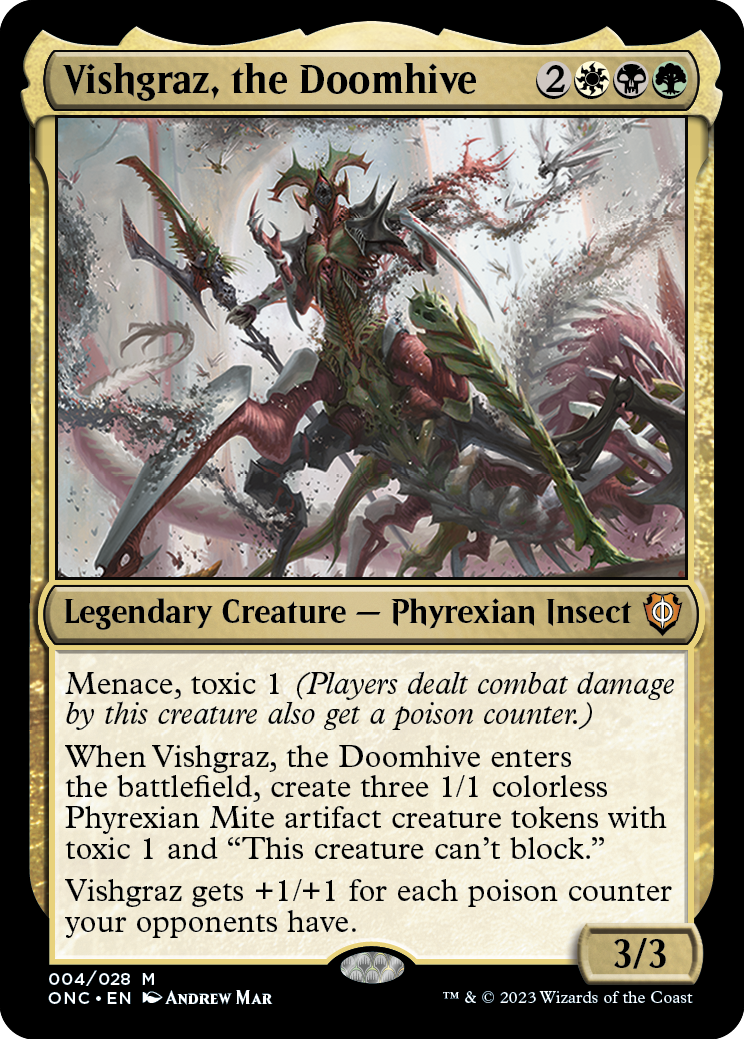
{2}{W}{B}{G}
Legendary Creature — Phyrexian Insect
3/3
Menace, toxic 1 (Players dealt combat damage by this creature also get a poison counter.)
When Vishgraz, the Doomhive enters the battlefield, create three 1/1 colorless Phyrexian Mite artifact creature tokens with toxic 1 and "This creature can't block."
Vishgraz gets +1/+1 for each poison counter your opponents have.
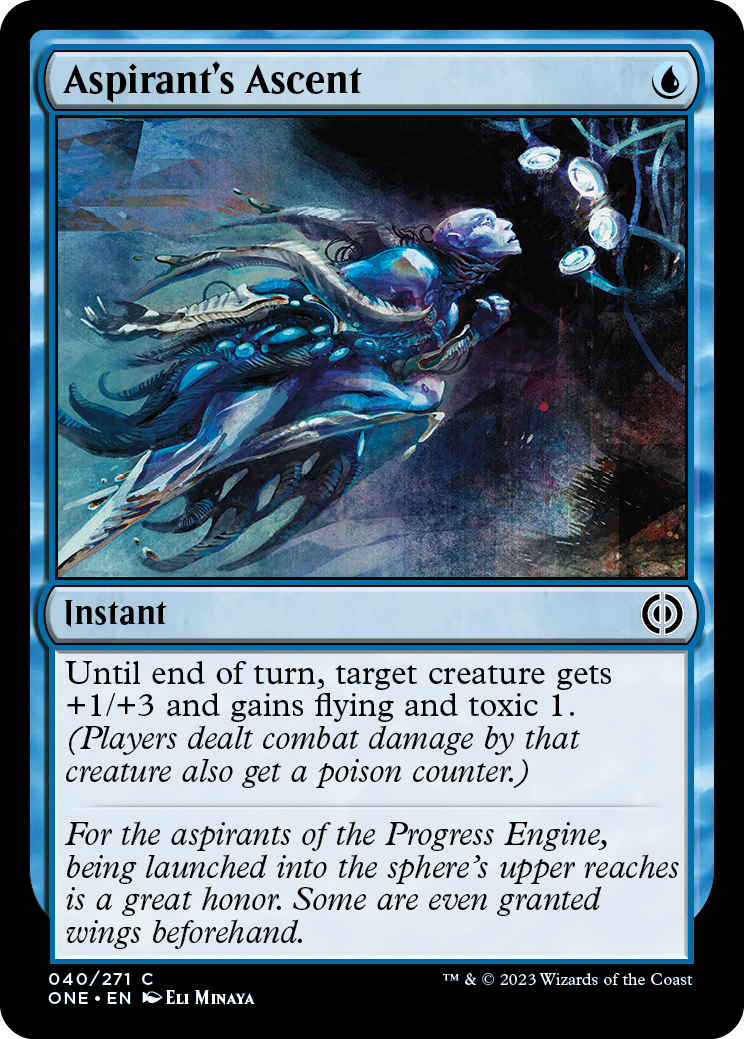
{U}
Instant
Until end of turn, target creature gets +1/+3 and gains flying and toxic 1. (Players dealt combat damage by that creature also get a poison counter.)
General toxic notes:
- A player with ten or more poison counters loses the game. This is a state-based action and doesn't use the stack. In other words, it happens immediately and players can't respond to it, just like a player losing the game due to having 0 or less life.
- Toxic doesn't change the amount of combat damage a creature deals. For example, if a 2/2 creature with toxic 1 deals combat damage to a player, that creature will deal 2 damage. The results of that damage are the player loses 2 life and gets a poison counter.
- Any other effects of that damage, such as life gain from lifelink, still apply.
- If a creature with toxic deals combat damage to a creature or planeswalker, or if it deals noncombat damage, toxic has no effect and no player gets poison counters.
- Damage dealt by a creature with toxic grants the same number of counters regardless of how much damage is dealt. Notably, if a replacement effect modifies the damage in some way (such as that of Gratuitous Violence), the number of counters given remains unchanged.
- Conversely, replacement effects that apply to the number of counters put on a player can modify the counters placed this way. For example, Vorinclex, Monstrous Raider's last two abilities can apply to counters placed this way.
- Multiple instances of toxic are cumulative. For example, if a creature has toxic 2 and gains toxic 1 due to another effect, combat damage that creature deals to a player will cause that player to get 3 poison counters.
New Keyword Ability: For Mirrodin!
This new keyword ability, found on some Equipment cards, represents the struggle of the Mirrans against the forces of Phyrexia. Equipment cards with this ability enter the battlefield with a creature to wield them.
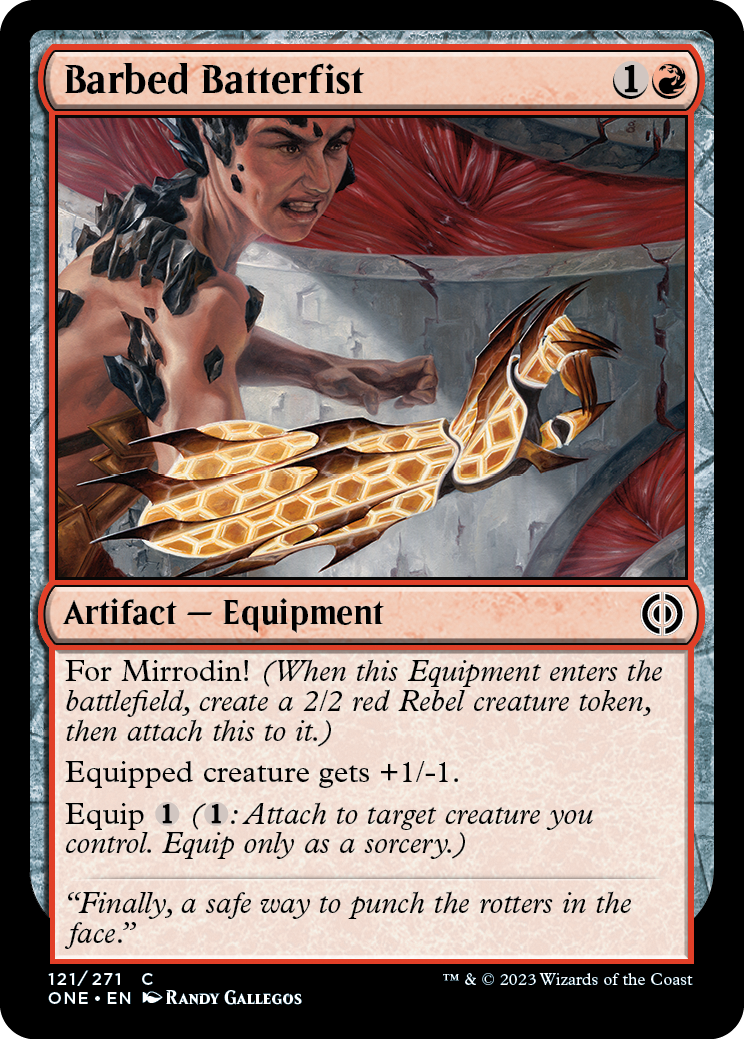
{1}{R}
Artifact — Equipment
For Mirrodin! (When this Equipment enters the battlefield, create a 2/2 red Rebel creature token, then attach this to it.)
Equipped creature gets +1/-1.
Equip {1} ({1}: Attach to target creature you control. Equip only as a sorcery.)
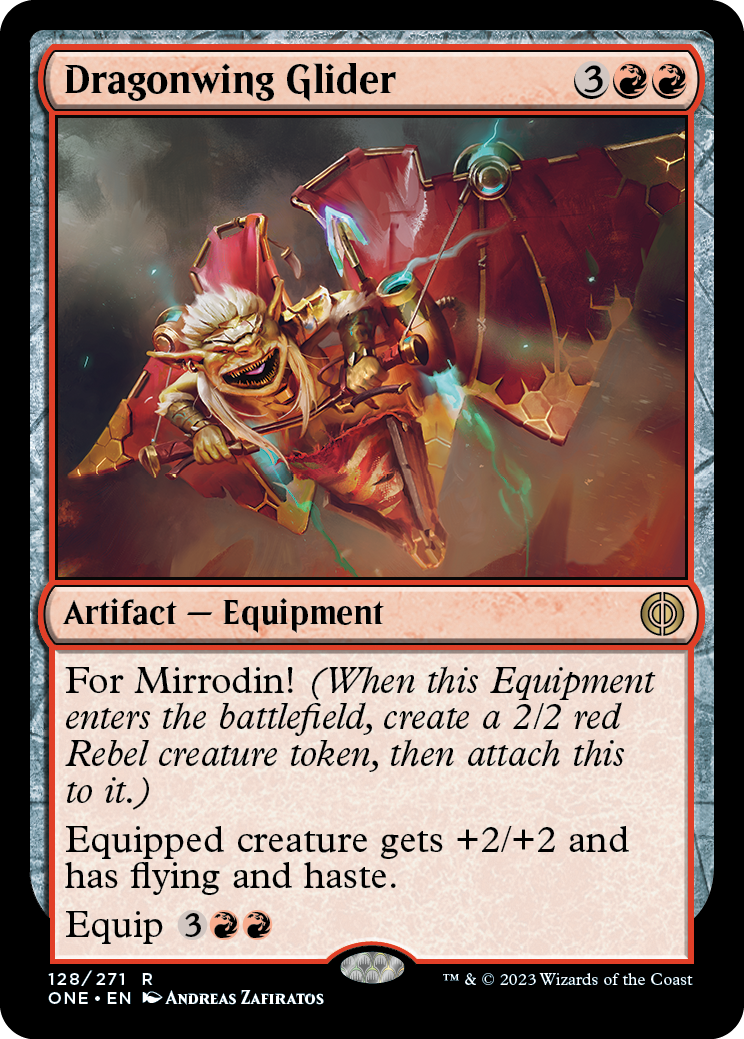
{3}{R}{R}
Artifact — Equipment
For Mirrodin! (When this Equipment enters the battlefield, create a 2/2 red Rebel creature token, then attach this to it.)
Equipped creature gets +2/+2 and has flying and haste.
Equip {3}{R}{R}
General For Mirrodin! notes:
- The Rebel enters the battlefield as a 2/2 creature, then the Equipment becomes attached to it. Abilities that trigger when a creature enters the battlefield see that a 2/2 creature entered the battlefield.
- If the Rebel is destroyed, the Equipment stays on the battlefield. Similarly, you may pay its equip cost to move it from the Rebel token to another creature you control.
- If the ability causes two Rebel tokens to be created (due to an effect such as that of Mondrak, Glory Dominus), the Equipment becomes attached to only one of them.
New Ability Word: Corrupted
Corrupted is an ability word which indicates abilities that care whether an opponent has three or more poison counters.
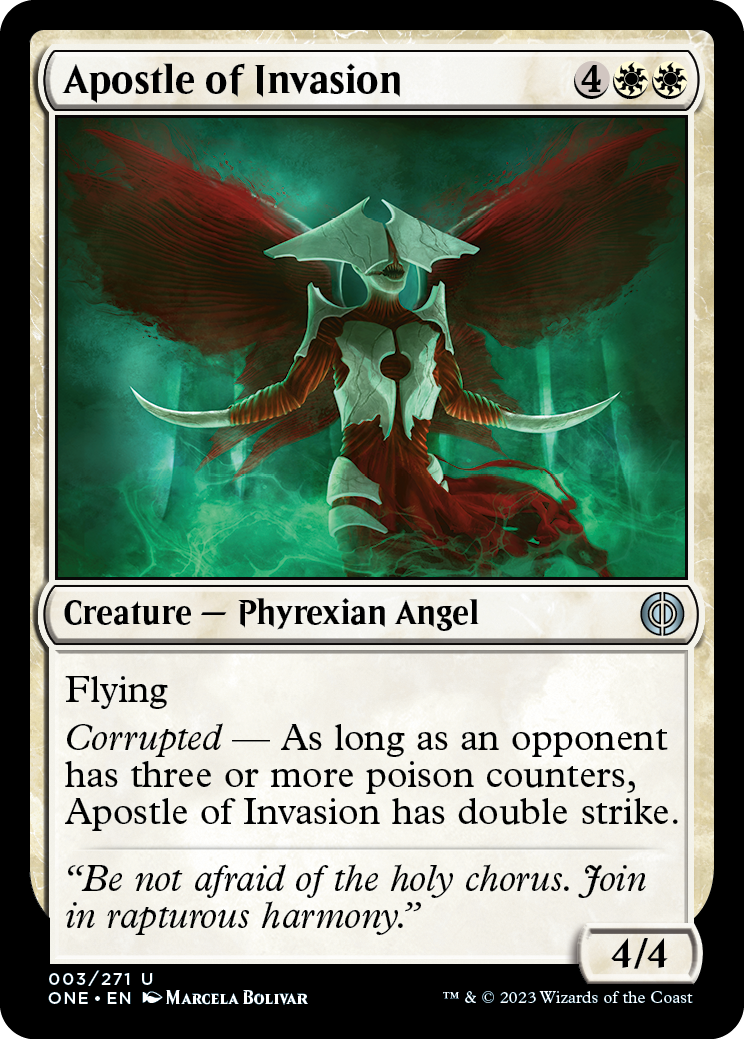
{4}{W}{W}
Creature — Phyrexian Angel
4/4
Flying
Corrupted — As long as an opponent has three or more poison counters, Apostle of Invasion has double strike.
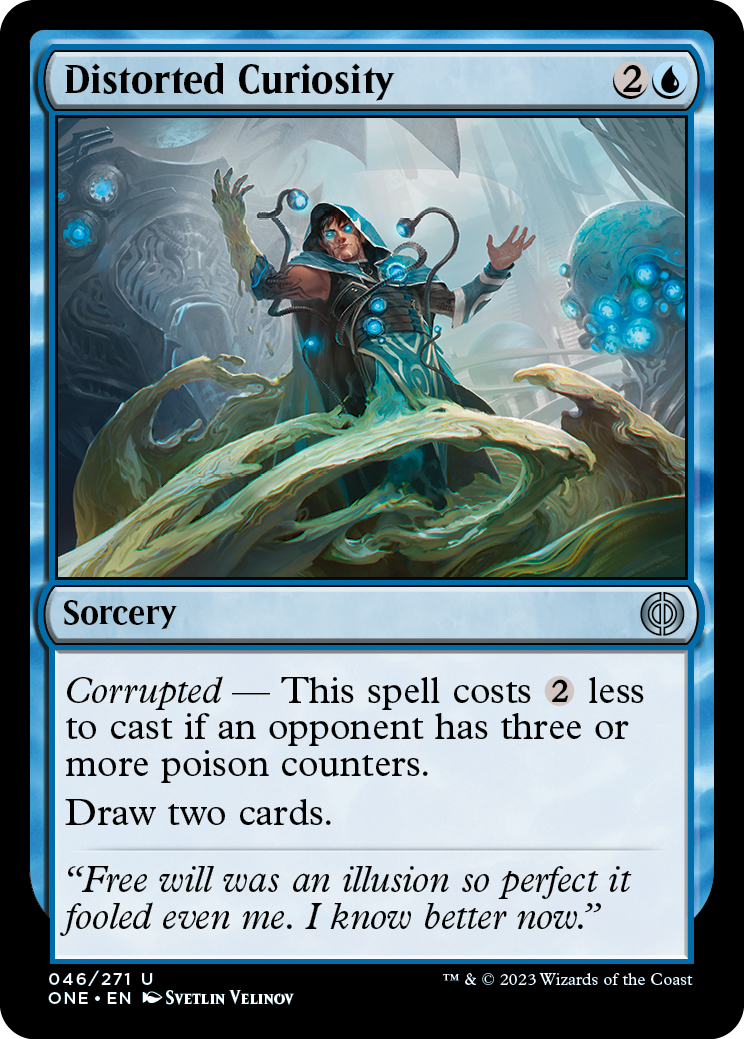
{2}{U}
Sorcery
Corrupted — This spell costs {2} less to cast if an opponent has three or more poison counters.
Draw two cards.
- In multiplayer games, only one opponent is required to have three or more poison counters for corrupted abilities to take notice, not all of them.
- Some corrupted abilities are activated abilities that can be activated only if an opponent has three or more poison counters. Once such an ability has been activated, it doesn't matter if that condition is still true as the ability tries to resolve.
- Some corrupted abilities of instants and sorceries provide effects that happen in addition to the base effect of the spell if an opponent has three or more poison counters. Other corrupted abilities, indicated by the word "instead" provide alternative effects that happen instead of the base effect.
New Mechanic: Oil Counters
Many cards in this set either enter the battlefield with oil counters or put oil counters on other permanents. While they are a slick way for spells and abilities to interact with the permanents that have them, oil counters themselves don't have any special rules significance.
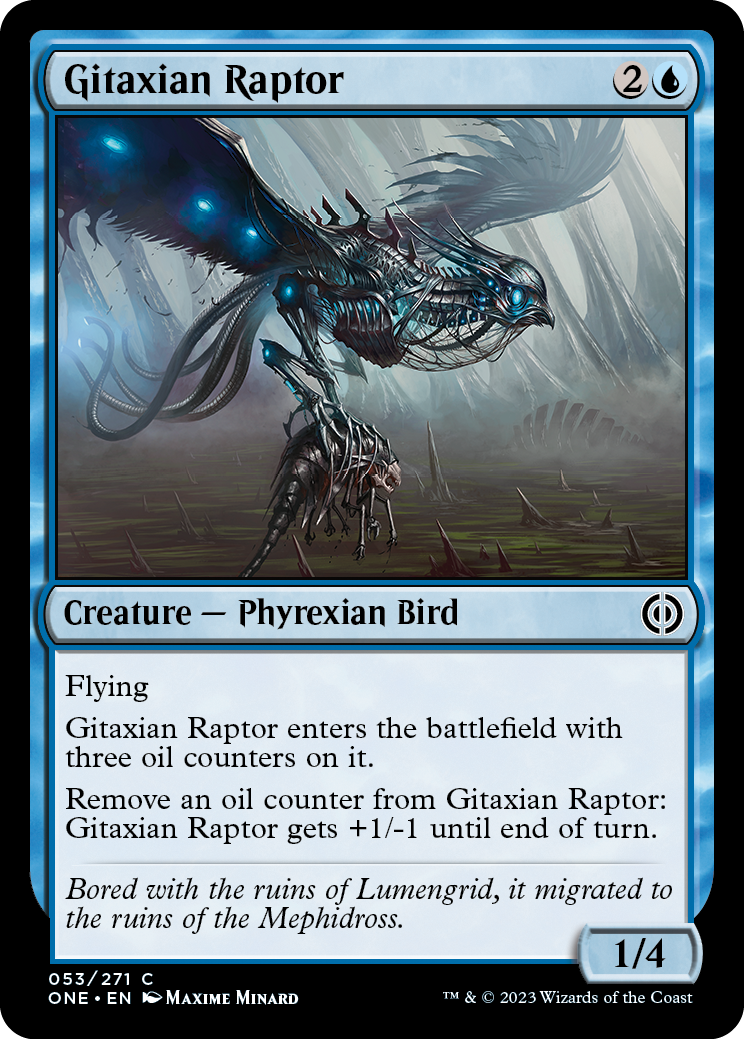
{2}{U}
Creature — Phyrexian Bird
1/4
Flying
Gitaxian Raptor enters the battlefield with three oil counters on it.
Remove an oil counter from Gitaxian Raptor: Gitaxian Raptor gets +1/-1 until end of turn.
Returning Mechanic: Proliferate
Proliferate is a returning mechanic that can increase the number of counters on permanents and players.
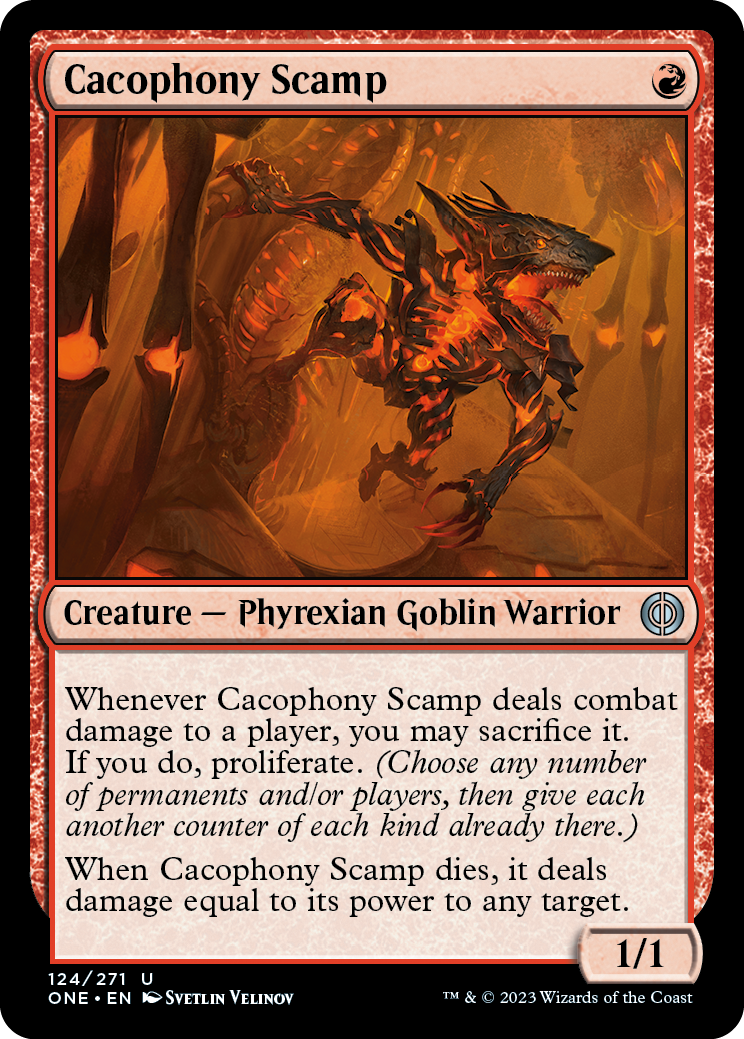
{R}
Creature — Phyrexian Goblin Warrior
1/1
Whenever Cacophony Scamp deals combat damage to a player, you may sacrifice it. If you do, proliferate. (Choose any number of permanents and/or players, then give each another counter of each kind already there.)
When Cacophony Scamp dies, it deals damage equal to its power to any target.
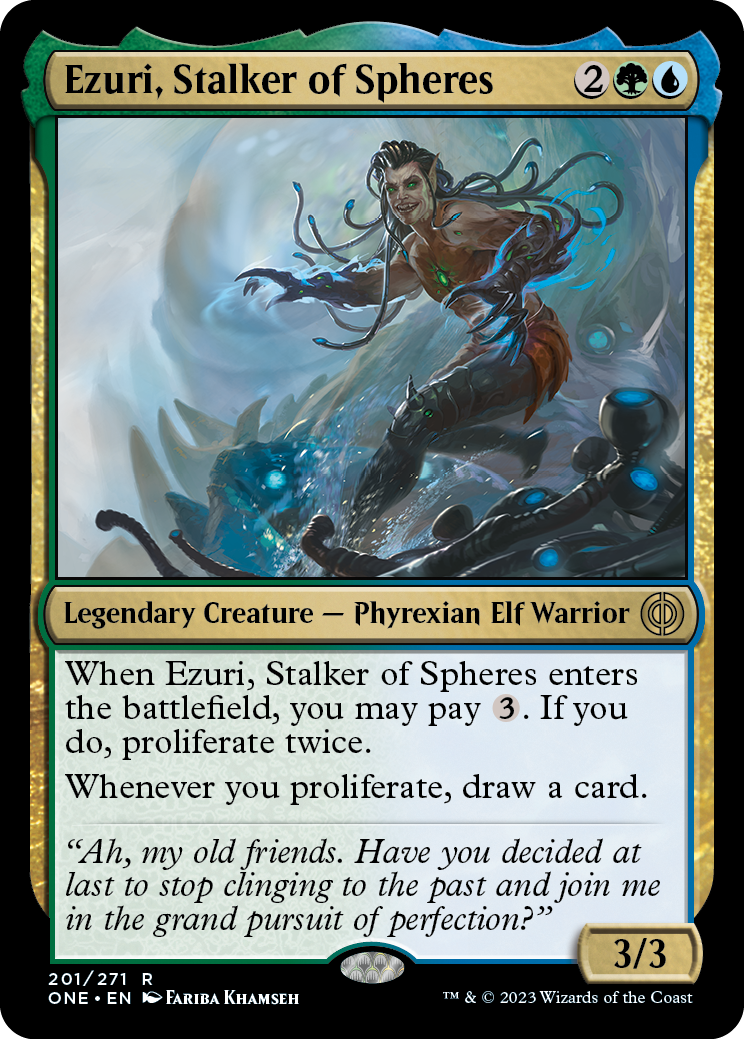
{2}{G}{U}
Legendary Creature — Phyrexian Elf Warrior
3/3
When Ezuri, Stalker of Spheres enters the battlefield, you may pay {3}. If you do, proliferate twice.
Whenever you proliferate, draw a card.
General Proliferate Notes:
- To proliferate, you can choose any permanent that has a counter, including ones controlled by opponents. You can choose any player who has a counter, including opponents. You can't choose cards in any zone other than the battlefield, even if they have counters on them.
- You don't have to choose every permanent or player that has a counter, only the ones you want to add another counter to. Since "any number" includes zero, you don't have to choose any permanents at all, and you don't have to choose any players at all.
- If a player or permanent has more than one kind of counter on it, and you choose for it to get additional counters, it must get one of each kind of counter it already has. You can't have it get just one kind of counter it already has and not the others.
- An ability that triggers "Whenever you proliferate" triggers even if you chose no permanents or players while doing so.
- Players can respond to a spell or ability whose effect includes proliferating. Once that spell or ability starts to resolve, however, and its controller chooses which permanents and players will get new counters, it's too late for anyone to respond.
- If a permanent ever has both +1/+1 counters and -1/-1 counters on it at the same time, they're removed in pairs as a state-based action so that the permanent has only one of those kinds of counters on it.
Card-Specific Notes:
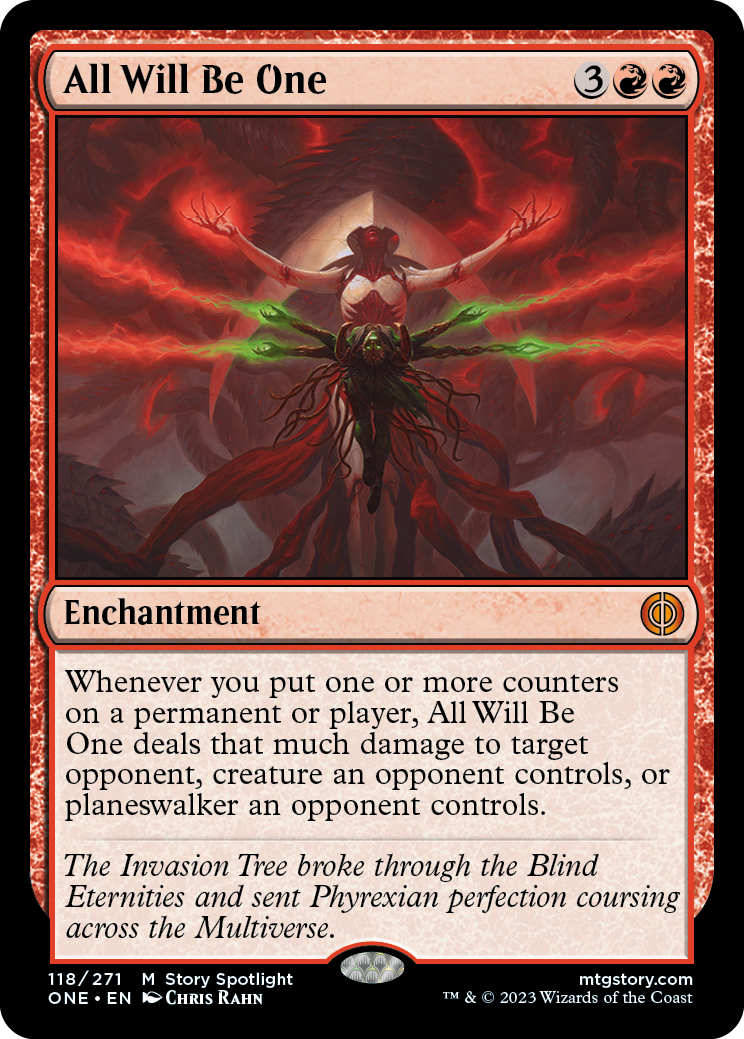
{3}{R}{R}
Enchantment
Whenever you put one or more counters on a permanent or player, All Will Be One deals that much damage to target opponent, creature an opponent controls, or planeswalker an opponent controls.
- All Will Be One's ability will trigger any time you put one or more counters on a permanent or player. This might be due to a spell or ability resolving, a permanent you control entering the battlefield with counters, or combat damage from a source with toxic, infect, or wither.
- If more than one creature with toxic deals combat damage to a player at the same time, those counters are placed as a single event, and the ability triggers one time.
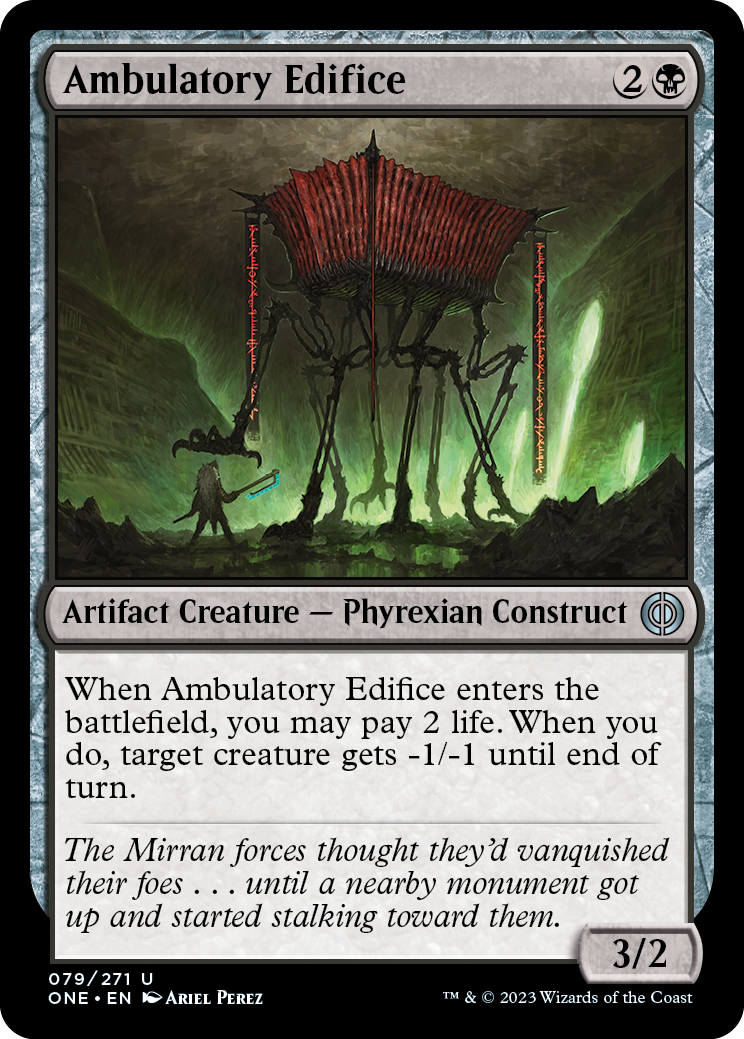
{2}{B}
Artifact Creature — Phyrexian Construct
3/2
When Ambulatory Edifice enters the battlefield, you may pay 2 life. When you do, target creature gets -1/-1 until end of turn.
- You don't choose a target for Ambulatory Edifice's last ability at the time it triggers. Rather, a second "reflexive" ability triggers when you pay 2 life this way. You choose a target for that ability as it goes on the stack. Each player may respond to this triggered ability as normal.
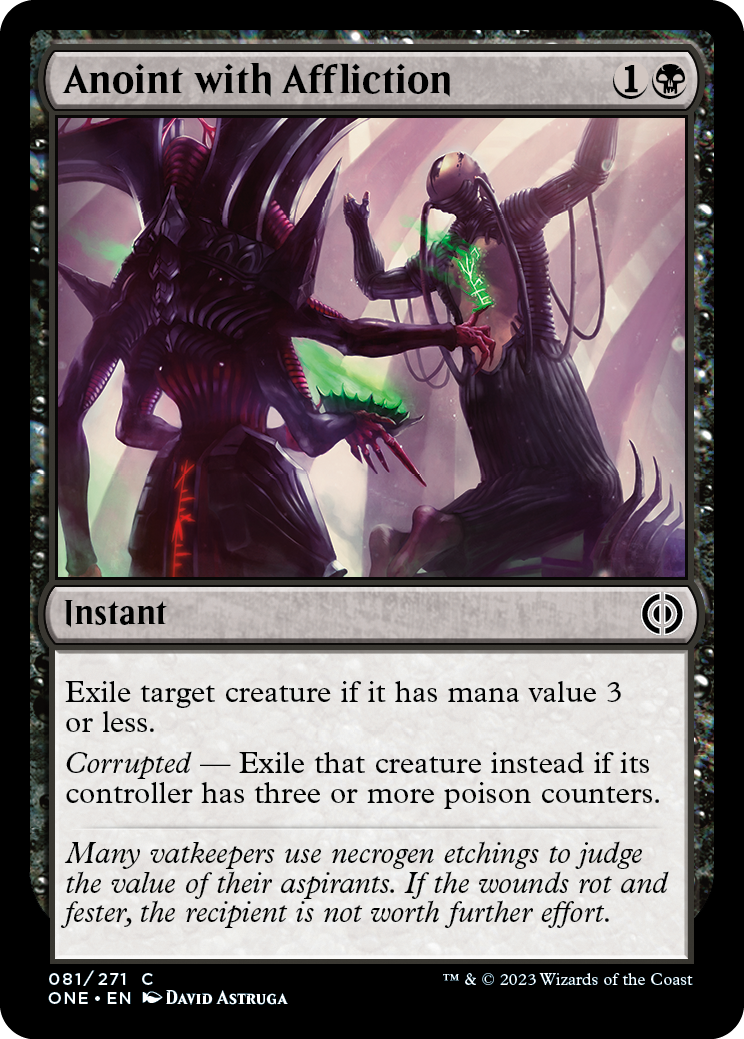
{1}{B}
Instant
Exile target creature if it has mana value 3 or less.
Corrupted — Exile that creature instead if its controller has three or more poison counters.
- You may choose to target a creature that has mana value greater than 3 even if no player has three of more poison counters.
- As Anoint with Affliction resolves, if the creature's controller has three or more poison counters, the creature will be exiled no matter what its mana value is. If the controller doesn't, the creature will be exiled only if its mana value is 3 or less.

{4}{W}{W}
Creature — Phyrexian Angel
4/4
Flying
Corrupted — As long as an opponent has three or more poison counters, Apostle of Invasion has double strike.
- In a multiplayer game, Apostle of Invasion can lose double strike after dealing damage in the first combat damage step if all the opponents that had three or more poison counters left the game. (This is most likely due to that combat damage, so good job!). In that case, it will not deal any combat damage in the regular combat damage step.
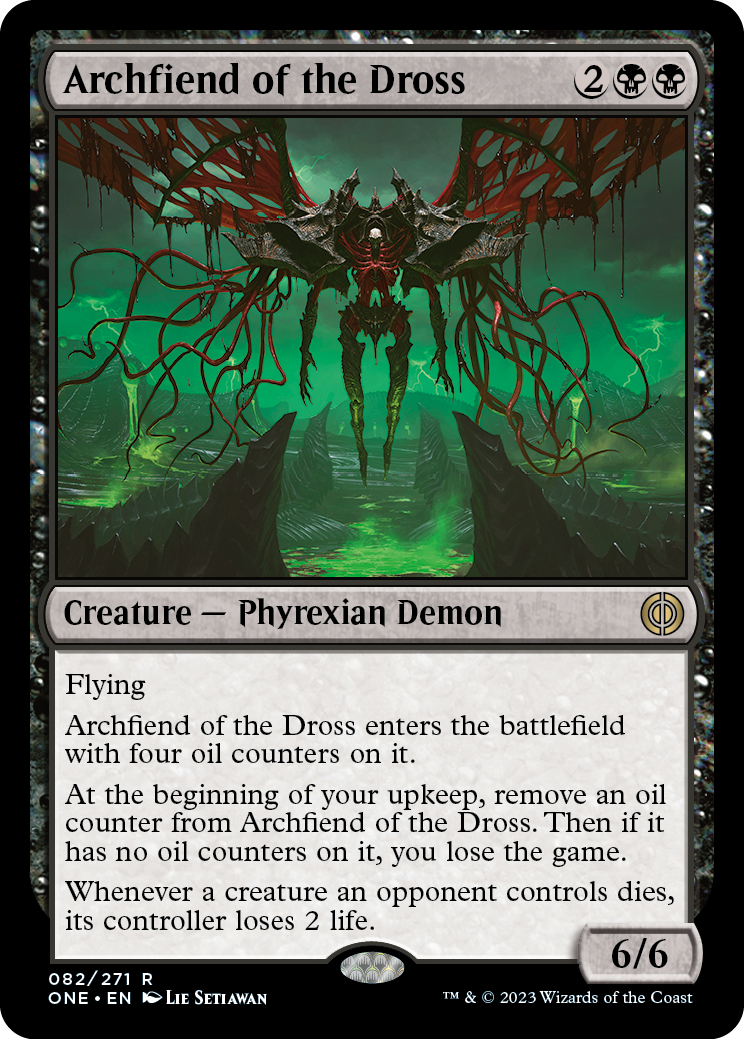
{2}{B}{B}
Creature — Phyrexian Demon
6/6
Flying
Archfiend of the Dross enters the battlefield with four oil counters on it.
At the beginning of your upkeep, remove an oil counter from Archfiend of the Dross. Then if it has no oil counters on it, you lose the game.
Whenever a creature an opponent controls dies, its controller loses 2 life.
- If Archfiend of the Dross somehow loses all of its oil counters due to an effect other than its upkeep triggered ability, this won't cause you to lose the game until the next time that ability resolves.
- If Archfiend of the Dross is no longer on the battlefield as its upkeep triggered ability resolves, use the number of oil counters it had the last time it existed on the battlefield to determine whether you lose the game. You can't remove oil counters from it if it's not on the battlefield, so you won't lose the game if it had only one oil counter on it before leaving the battlefield.
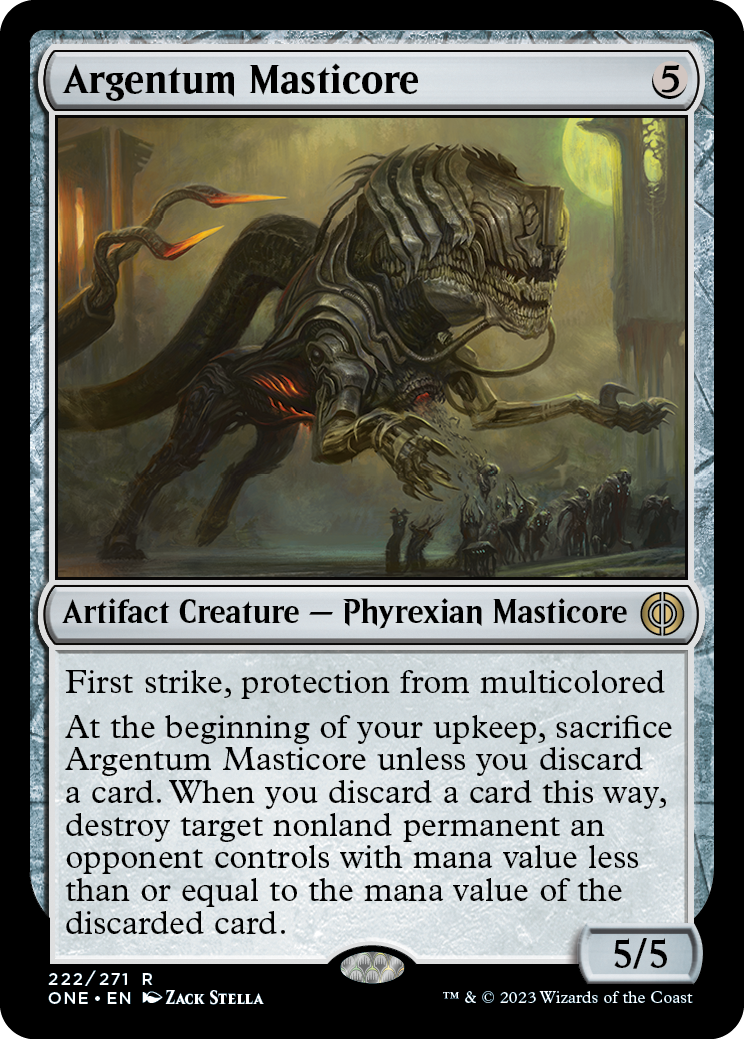
{5}
Artifact Creature — Phyrexian Masticore
5/5
First strike, protection from multicolored
At the beginning of your upkeep, sacrifice Argentum Masticore unless you discard a card. When you discard a card this way, destroy target nonland permanent an opponent controls with mana value less than or equal to the mana value of the discarded card.
- You don't choose a target for Argentum Masticore's upkeep triggered ability at the time it triggers. Rather, a second "reflexive" ability triggers when you discard a card this way. You choose a target for that ability as it goes on the stack. Each player may respond to this triggered ability as normal.
- Notably, this means that you may discard a card to keep Argentum Masticore on the battlefield even if there isn't a legal target for that second triggered ability. In that case, no players may respond to the second triggered ability and it does not resolve.
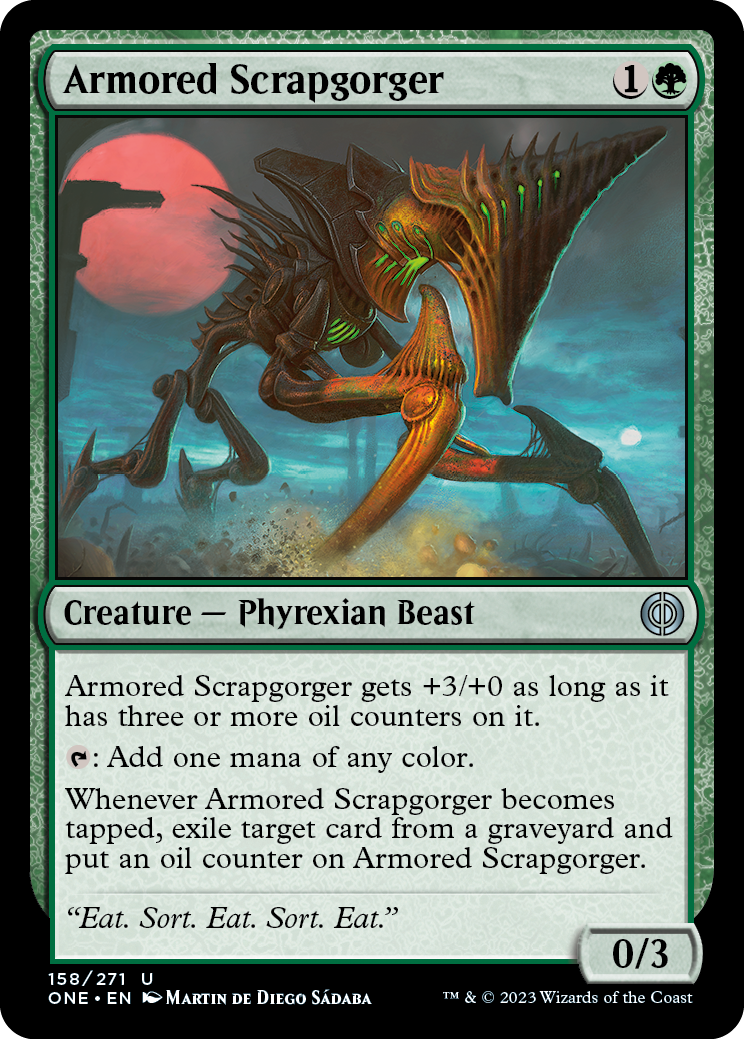
{1}{G}
Creature — Phyrexian Beast
0/3
Armored Scrapgorger gets +3/+0 as long as it has three or more oil counters on it.
{T}: Add one mana of any color.
Whenever Armored Scrapgorger becomes tapped, exile target card from a graveyard and put an oil counter on Armored Scrapgorger.
- Armored Scrapgorger's last ability triggers whenever it becomes tapped for any reason, not just due to its mana ability.
- If the card chosen as the target of the last ability is an illegal target as the ability tries to resolve, most likely because it left the graveyard some other way, the ability will fail to resolve and none of its effects will happen. Armored Scrapgorger won't get an oil counter.

{U}
Instant
Until end of turn, target creature gets +1/+3 and gains flying and toxic 1. (Players dealt combat damage by that creature also get a poison counter.)
- Giving an attacking creature flying after it has become blocked will not cause it to become unblocked, even if the blocking creature can't normally block creatures with flying.
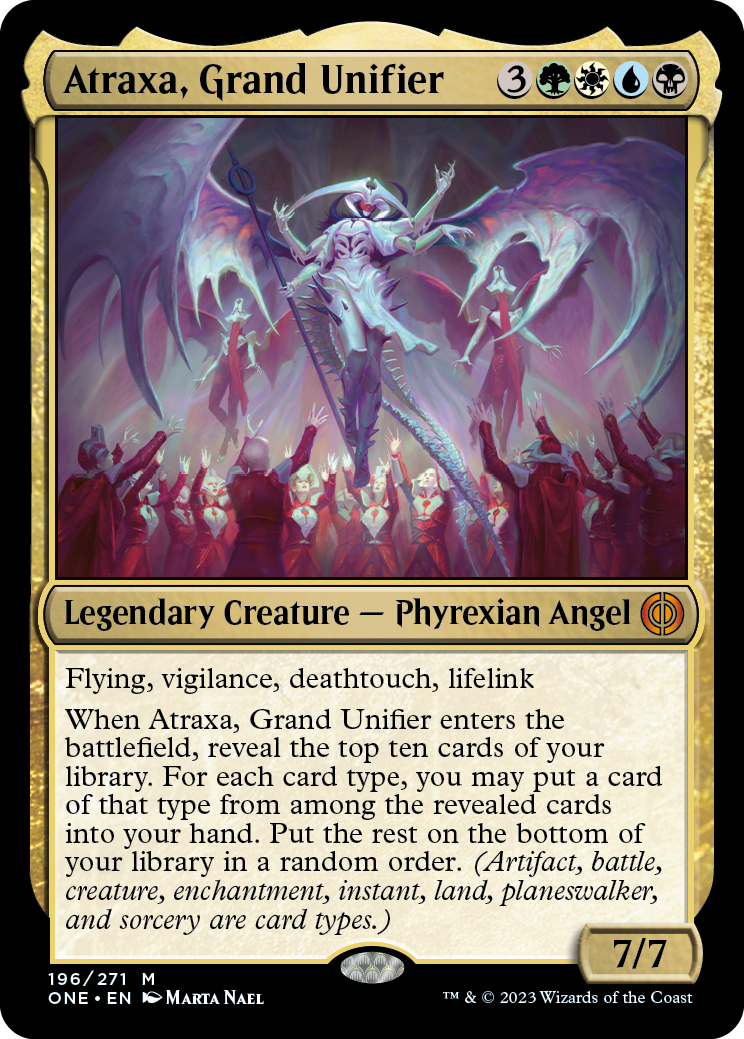
{3}{G}{W}{U}{B}
Legendary Creature — Phyrexian Angel
7/7
Flying, vigilance, deathtouch, lifelink
When Atraxa, Grand Unifier enters the battlefield, reveal the top ten cards of your library. For each card type, you may put a card of that type from among the revealed cards into your hand. Put the rest on the bottom of your library in a random order. (Artifact, battle, creature, enchantment, instant, land, planeswalker, and sorcery are card types.)
- If a revealed card has more than one card type, you may choose to put it into your hand for any of its types. For example, an artifact creature card could be put into your hand as the artifact card you choose or as the creature card you choose. If you choose it as the artifact card, you could also put into your hand a creature card, and vice versa.
- At the time of this document's publication, it is exceedingly unlikely you will reveal a battle this way. This likelihood will change over time.
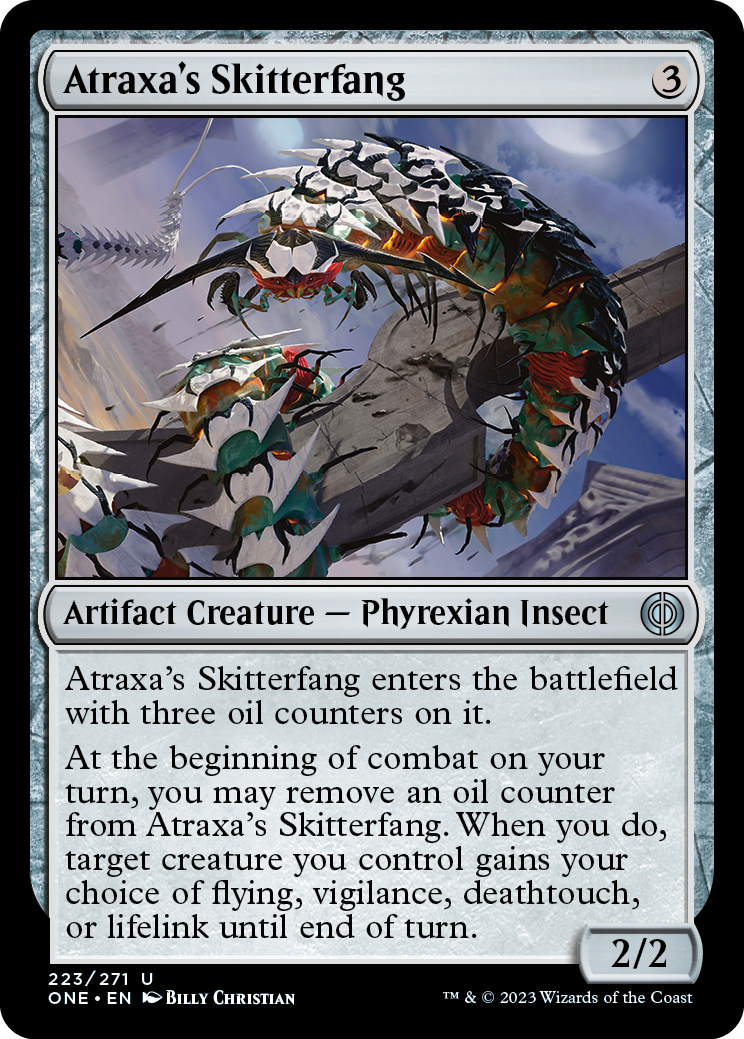
{3}
Artifact Creature — Phyrexian Insect
2/2
Atraxa's Skitterfang enters the battlefield with three oil counters on it.
At the beginning of combat on your turn, you may remove an oil counter from Atraxa's Skitterfang. When you do, target creature you control gains your choice of flying, vigilance, deathtouch, or lifelink until end of turn.
- You don't choose a target for Atraxa's Skitterfang's last ability at the time it triggers. Rather, a second "reflexive" ability triggers when you remove an oil counter this way. You choose a target for that ability as it goes on the stack. Each player may respond to this triggered ability as normal.
- You choose which ability the target creature gets as the reflexive ability resolves. Players may not wait to see what ability you choose before deciding whether to respond to it.
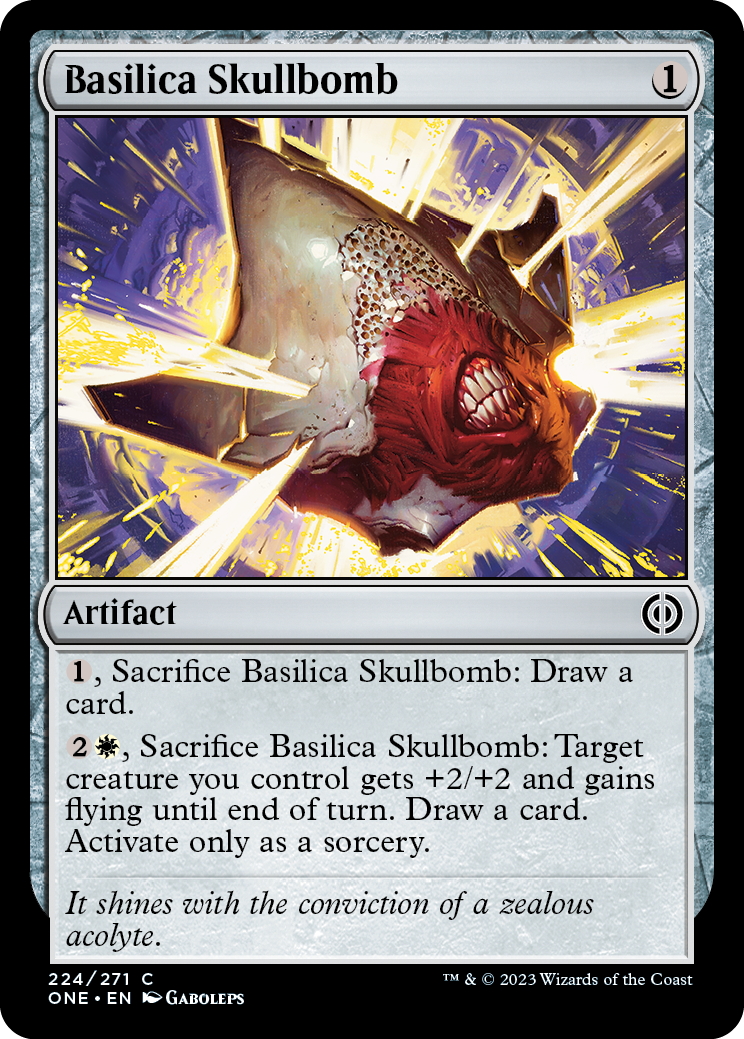
{1}
Artifact
{1}, Sacrifice Basilica Skullbomb: Draw a card.
{2}{W}, Sacrifice Basilica Skullbomb: Target creature you control gets +2/+2 and gains flying until end of turn. Draw a card. Activate only as a sorcery.
- If the target of Basilica Skullbomb's last ability isn't a legal target as the ability tries to resolve (probably because it has left the battlefield), you won't draw a card.
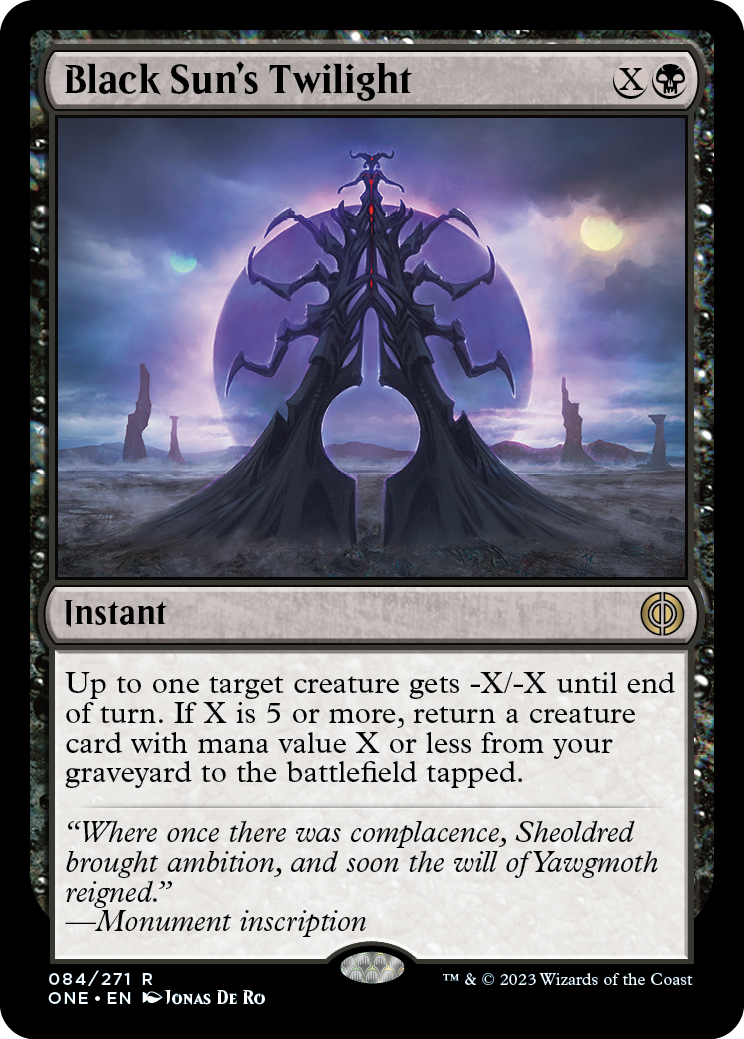
{X}{B}
Instant
Up to one target creature gets -X/-X until end of turn. If X is 5 or more, return a creature card with mana value X or less from your graveyard to the battlefield tapped.
- The creature card you return, if any, isn't a target of Black Sun's Twilight. You choose it as Black Sun's Twilight resolves if X is 5 or more.
- You can cast Black Sun's Twilight without a target (presumably with X equal to 5 or more) just to return a creature card. However, if you do choose a target, and that target is illegal at the time the spell tries to resolve, the spell won't resolve and none of its effects will happen. You won't get to return a creature card to the battlefield.
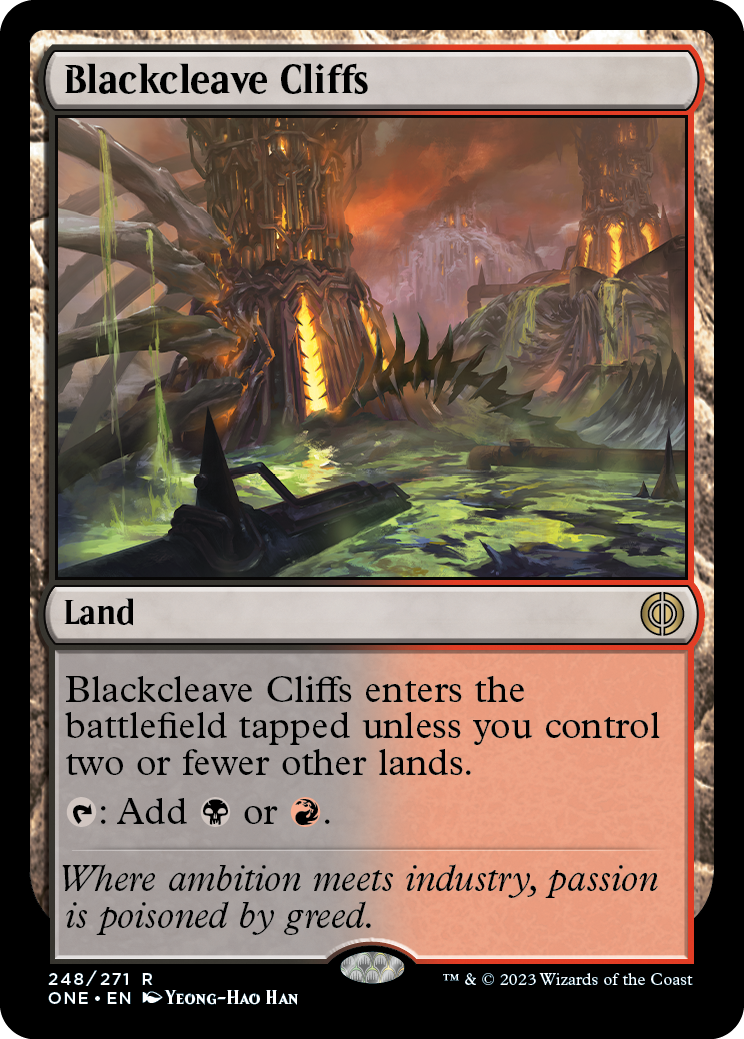
Land
Blackcleave Cliffs enters the battlefield tapped unless you control two or fewer other lands.
{T}: Add {B} or {R}.
- If one of these lands enters the battlefield under your control and you control zero, one, or two other lands, it enters the battlefield untapped. If you control three or more other lands, it enters the battlefield tapped.
- If one of these lands enters the battlefield at the same time as one or more other lands (due to Oblivion Sower or Warp World, perhaps), it doesn't take those lands into consideration when determining how many other lands you control.
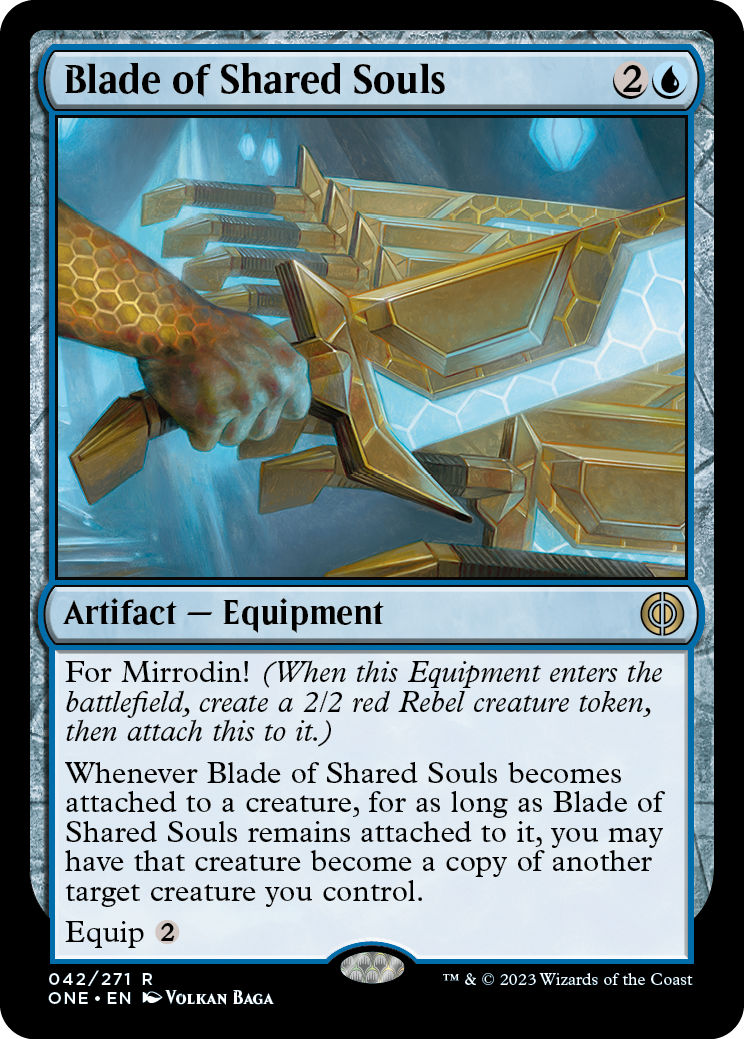
{2}{U}
Artifact — Equipment
For Mirrodin! (When this Equipment enters the battlefield, create a 2/2 red Rebel creature token, then attach this to it.)
Whenever Blade of Shared Souls becomes attached to a creature, for as long as Blade of Shared Souls remains attached to it, you may have that creature become a copy of another target creature you control.
Equip {2}
- The creature copies exactly what is printed on the chosen creature (unless that creature has additional copy effects affecting it, is copying something else, or is a token; see below). It doesn't copy whether that creature is tapped or untapped, whether it has any counters on it or any Auras and Equipment attached to it, or any non-copy effects that have changed its power, toughness, types, color, or so on.
- Non-copy effects that have already applied to the equipped creature will continue to apply to it. For example, +1/+1 counters on it will still affect it.
- The copiable values granted by Blade of Shared Souls are locked in as its effect begins to apply. After that point, it doesn't matter if the creature that's being copied leaves the battlefield or if any of its copiable values change.
- If the target creature isn't normally a creature (for example, an animated Monument to Perfection), the equipped creature will become a copy of the noncreature permanent. Blade of Shared Souls will become unattached and the copy effect will end. The previously equipped creature will revert to whatever it was before the copy effect applied.
- If the target creature is copying something else (for example, if that creature is equipped by another Blade of Shared Souls), then the equipped creature becomes a copy of whatever the target creature copied.
- If the target creature is a token, the equipped creature copies the original characteristics of that token as stated by the effect that created it. If the equipped creature isn't a token, copying a token won't cause it to become a token. Similarly, if the equipped creature is a token, copying a nontoken won't cause it to become a nontoken.
- If the target creature is a double-faced or melded permanent, the equipped creature copies the face shown. If the equipped creature copies a melded permanent or the back face of a double-faced card, its mana value is 0.
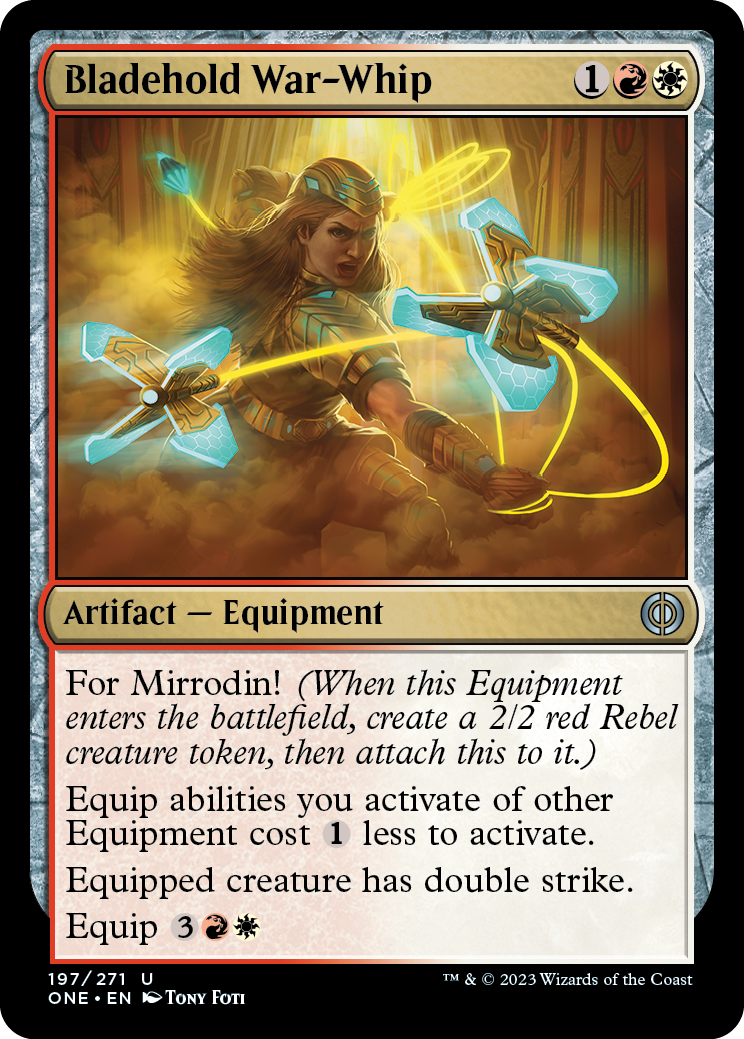
{1}{R}{W}
Artifact — Equipment
For Mirrodin! (When this Equipment enters the battlefield, create a 2/2 red Rebel creature token, then attach this to it.)
Equip abilities you activate of other Equipment cost {1} less to activate.
Equipped creature has double strike.
Equip {3}{R}{W}
- Bladehold War-Whip's second ability reduces only the amount of generic mana in equip abilities. For example, it will reduce an equip cost of {1} to {0}, but it will have no effect on an equip cost of {G}.
- The second ability affects other Equipment even if it isn't currently attached to a creature.
- Some Equipment creature cards in other sets have reconfigure, a different ability that attaches them to a creature. Reconfigure is not an equip ability, and reconfigure costs are not reduced by Bladehold War-Whip's second ability.
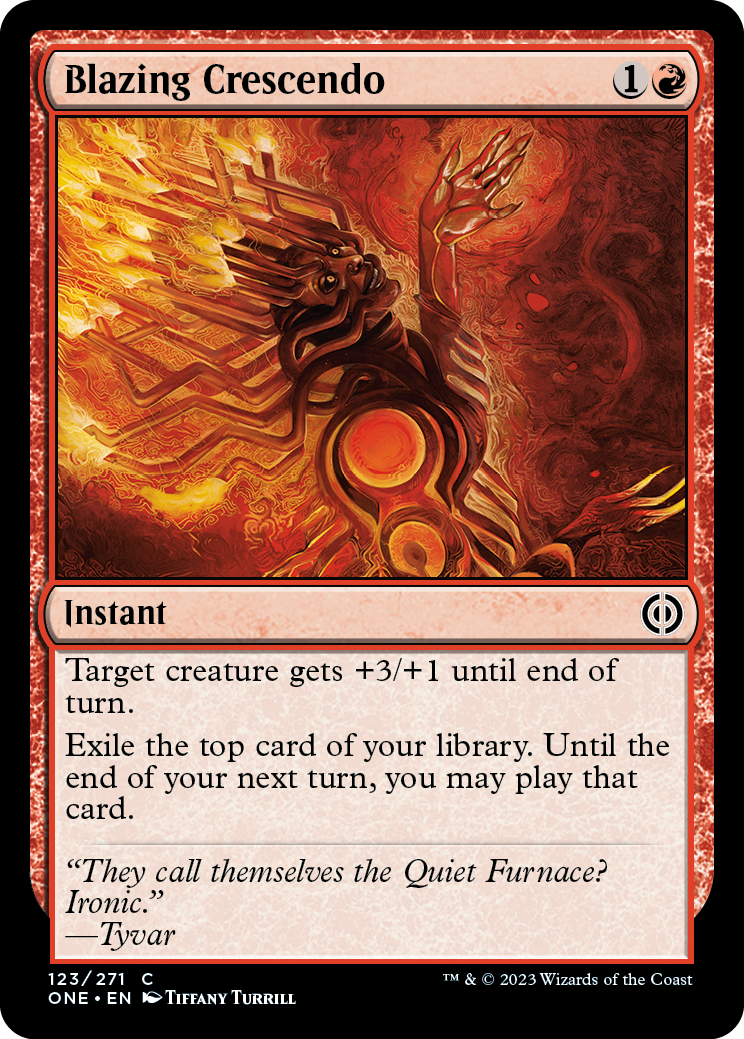
{1}{R}
Instant
Target creature gets +3/+1 until end of turn.
Exile the top card of your library. Until the end of your next turn, you may play that card.
- You pay all costs and follow all normal timing rules for a card played this way. For example, if the exiled card is a land card, you may play it only during your main phase while the stack is empty.
- If the target creature is an illegal target by the time the spell tries to resolve (most likely because it has left the battlefield in response), the spell will not resolve. No card will be exiled.
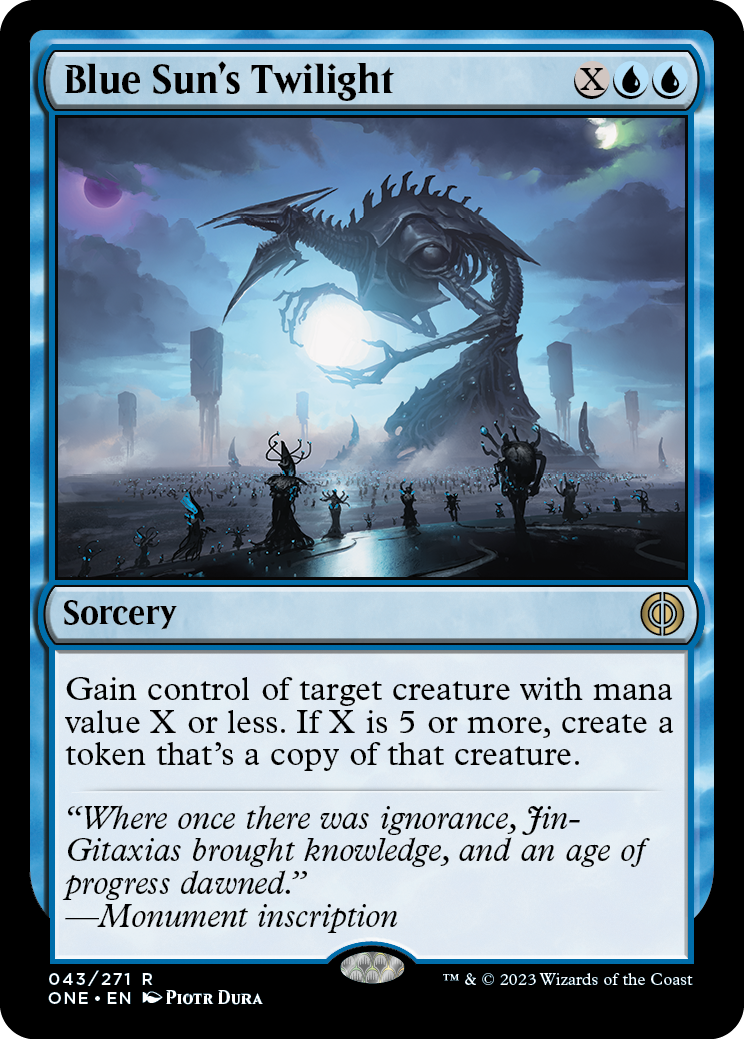
{X}{U}{U}
Sorcery
Gain control of target creature with mana value X or less. If X is 5 or more, create a token that's a copy of that creature.
- If the target creature is an illegal target by the time the spell tries to resolve, the spell will not resolve. No token is created, even if X is 5 or more.

{R}
Creature — Phyrexian Goblin Warrior
1/1
Whenever Cacophony Scamp deals combat damage to a player, you may sacrifice it. If you do, proliferate. (Choose any number of permanents and/or players, then give each another counter of each kind already there.)
When Cacophony Scamp dies, it deals damage equal to its power to any target.
- You choose whether to sacrifice Cacophony Scamp as its first ability resolves. No player may respond between the time you sacrifice it and the time you proliferate.
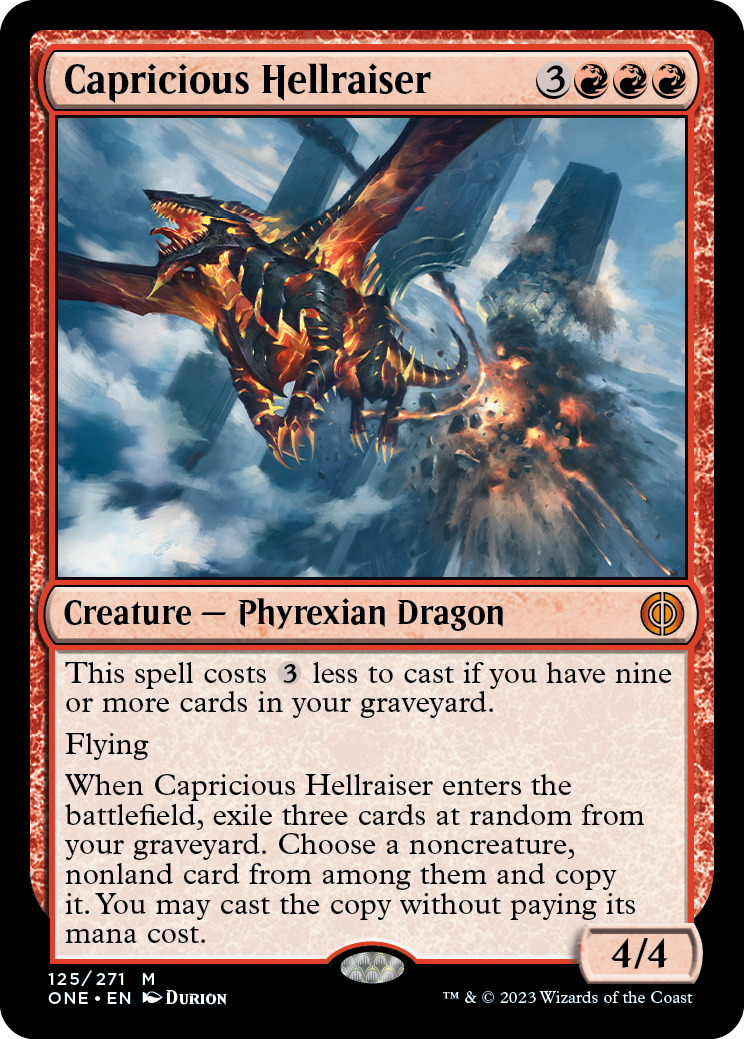
{3}{R}{R}{R}
Creature — Phyrexian Dragon
4/4
This spell costs {3} less to cast if you have nine or more cards in your graveyard.
Flying
When Capricious Hellraiser enters the battlefield, exile three cards at random from your graveyard. Choose a noncreature, nonland card from among them and copy it. You may cast the copy without paying its mana cost.
- The three cards you exile are chosen at random from among all cards in your graveyard. If all three cards you exile this way are creature and/or land cards, you won't be able to choose one of them to copy and cast. Capricious, indeed.
- You cast the copy while the ability is resolving and still on the stack. You can't wait to cast it later in the turn.
- If you cast a spell "without paying its mana cost," you can't pay any alternative costs. You can, however, pay additional costs, such as kicker costs. If the card has any mandatory additional costs, you must pay those.
- If the spell you cast has {X} in its mana cost, you must choose 0 as the value of X when casting it without paying its mana cost.
- If you don't want to cast the copy, you can choose not to; the copy ceases to exist the next time state-based actions are checked.
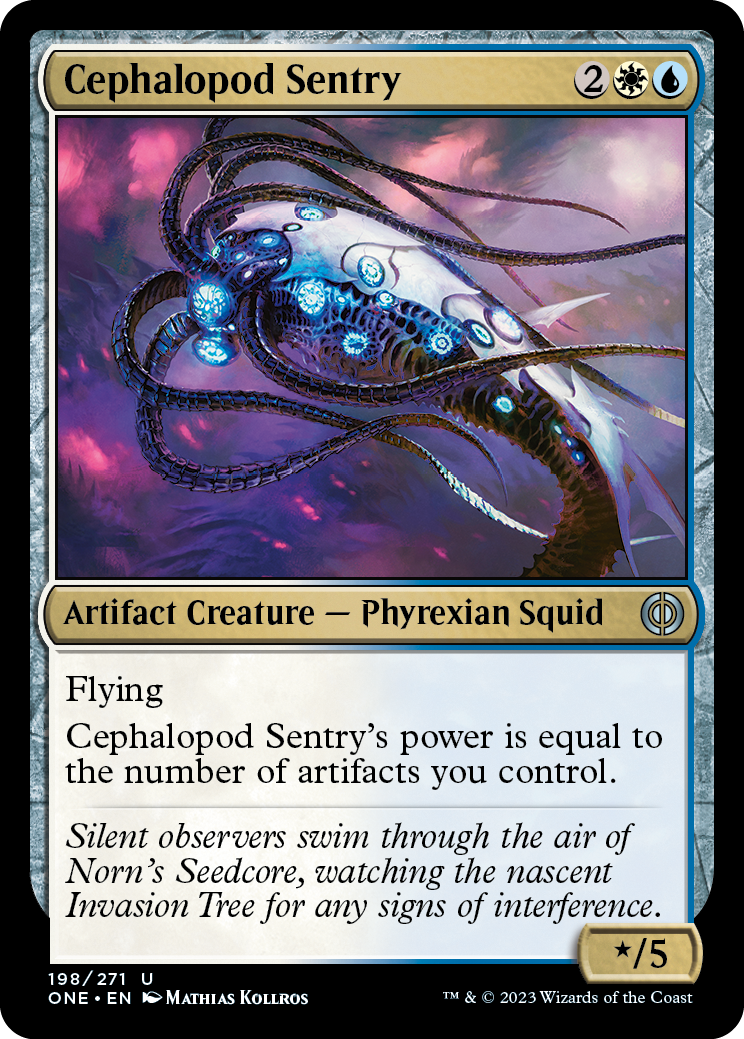
{2}{W}{U}
Artifact Creature — Phyrexian Squid
*/5
Flying
Cephalopod Sentry's power is equal to the number of artifacts you control.
- The ability that defines Cephalopod Sentry's power works in all zones, not just the battlefield. As long as Cephalopod Sentry is on the battlefield (and still an artifact), that ability will count Cephalopod Sentry itself.
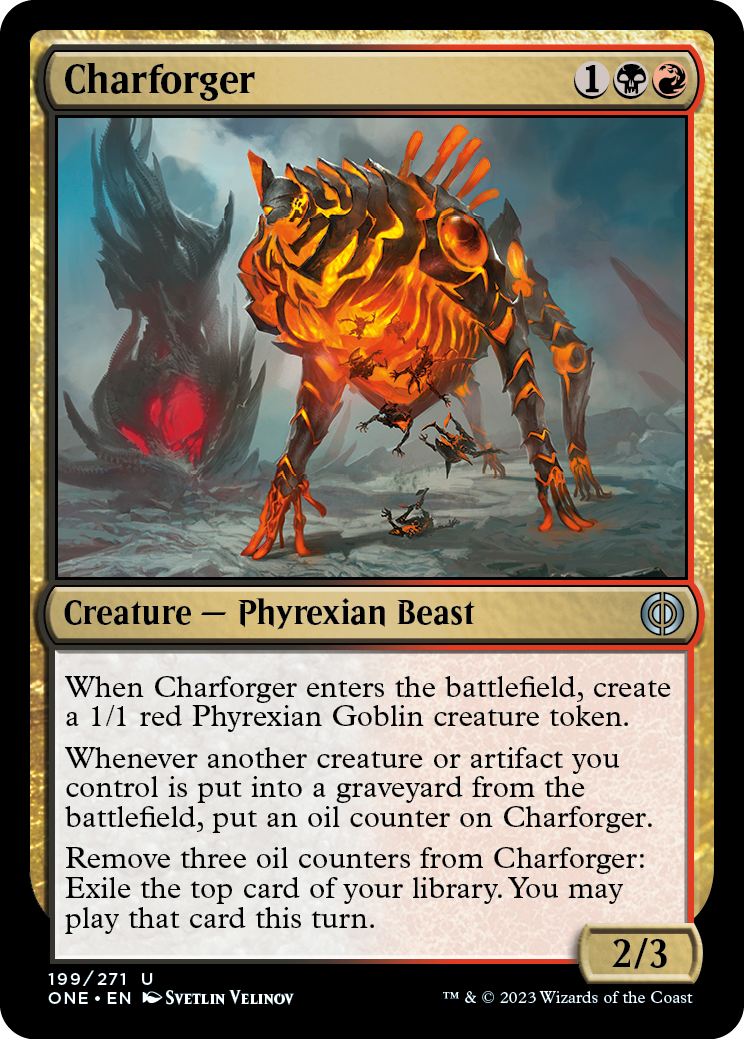
{1}{B}{R}
Creature — Phyrexian Beast
2/3
When Charforger enters the battlefield, create a 1/1 red Phyrexian Goblin creature token.
Whenever another creature or artifact you control is put into a graveyard from the battlefield, put an oil counter on Charforger.
Remove three oil counters from Charforger: Exile the top card of your library. You may play that card this turn.
- You must follow all normal timing rules for a card you play using Charforger's last ability and, if it's a spell, you must pay its costs to cast it.
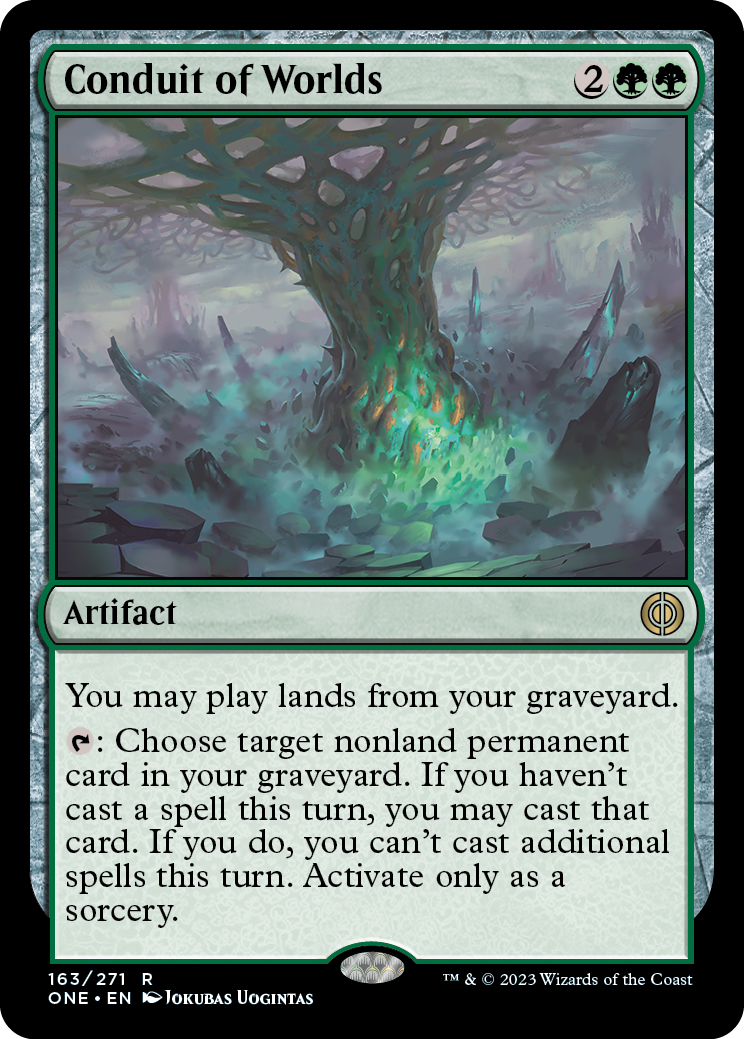
{2}{G}{G}
Artifact
You may play lands from your graveyard.
{T}: Choose target nonland permanent card in your graveyard. If you haven't cast a spell this turn, you may cast that card. If you do, you can't cast additional spells this turn. Activate only as a sorcery.
- The first ability of Conduit of Worlds doesn't change the times when you can play those land cards. You can still play only one land per turn, and only during your main phase when you have priority and the stack is empty.
- The second ability of Conduit of Worlds allows you to cast the target card as the ability resolves. You can't wait and cast that card later in the turn. If you cast it, you can't cast any other spells this turn, even if another effect would allow you to.
- The second ability of Conduit of Worlds will count spells you cast earlier in the turn even if Conduit of Worlds wasn't on the battlefield or under your control at that time. It will also count a spell you cast that subsequently was countered or failed to resolve. Notably, it will also include Conduit of Worlds itself on the turn you cast it.
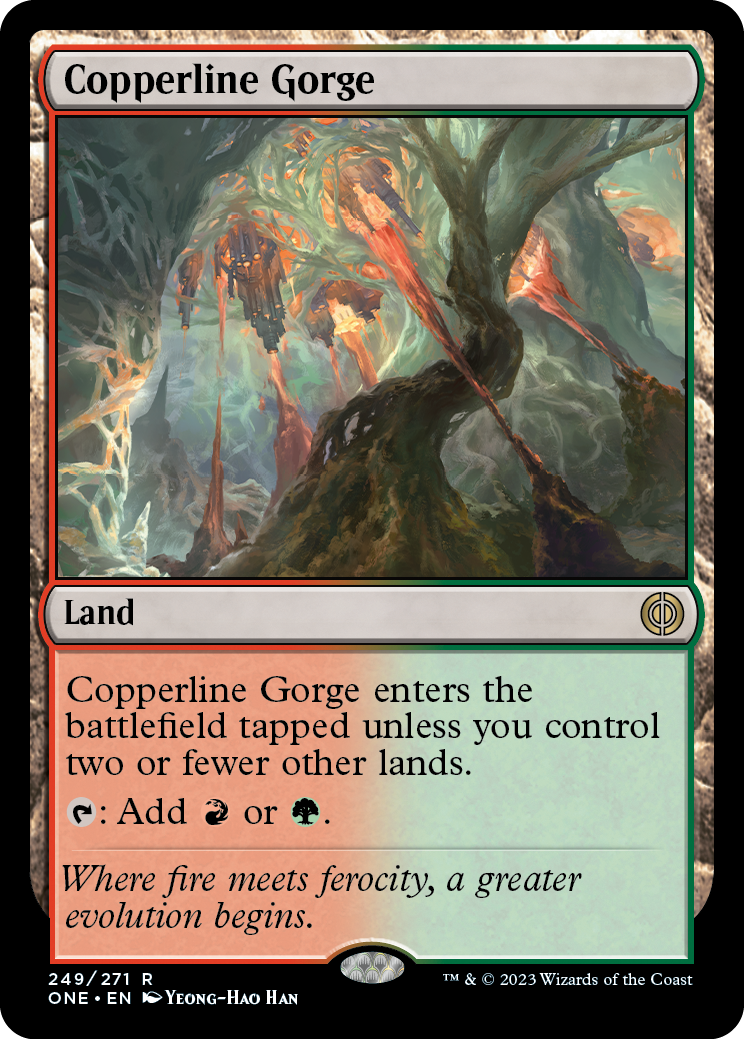
Land
Copperline Gorge enters the battlefield tapped unless you control two or fewer other lands.
{T}: Add {R} or {G}.
- • If one of these lands enters the battlefield under your control and you control zero, one, or two other lands, it enters the battlefield untapped. If you control three or more other lands, however, it enters the battlefield tapped.
- If one of these lands enters the battlefield at the same time as one or more other lands (due to Oblivion Sower or Warp World, perhaps), it doesn't take those lands into consideration when determining how many other lands you control.
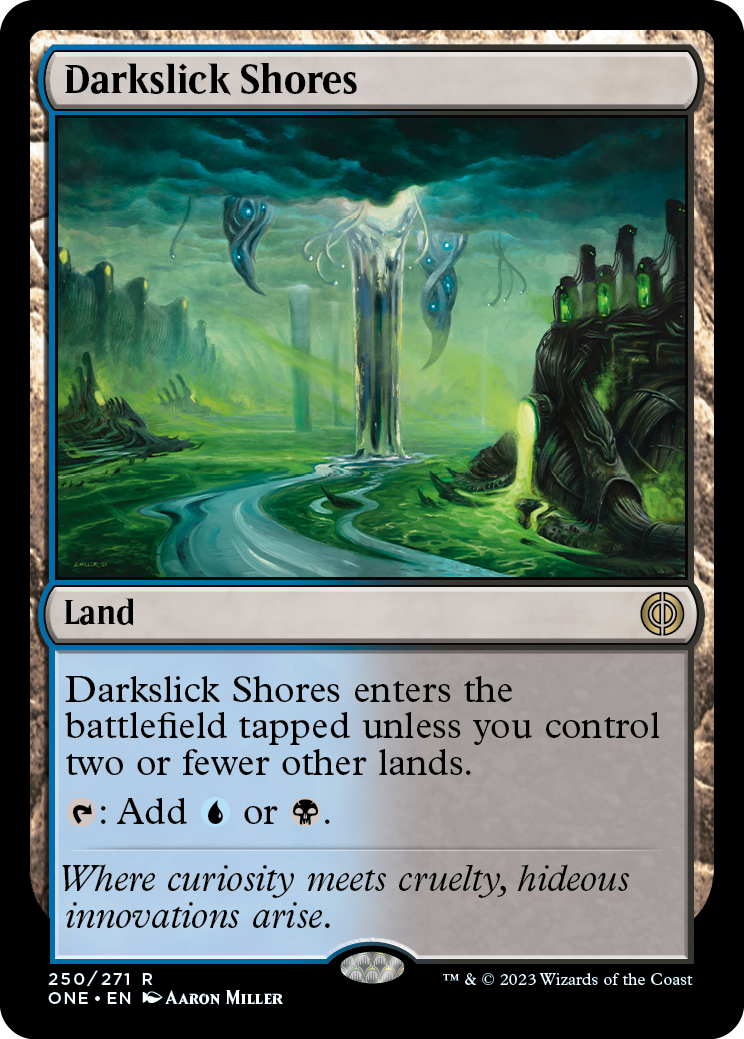
Land
Darkslick Shores enters the battlefield tapped unless you control two or fewer other lands.
{T}: Add {U} or {B}.
- If one of these lands enters the battlefield under your control and you control zero, one, or two other lands, it enters the battlefield untapped. If you control three or more other lands, however, it enters the battlefield tapped.
- If one of these lands enters the battlefield at the same time as one or more other lands (due to Oblivion Sower or Warp World, perhaps), it doesn't take those lands into consideration when determining how many other lands you control.
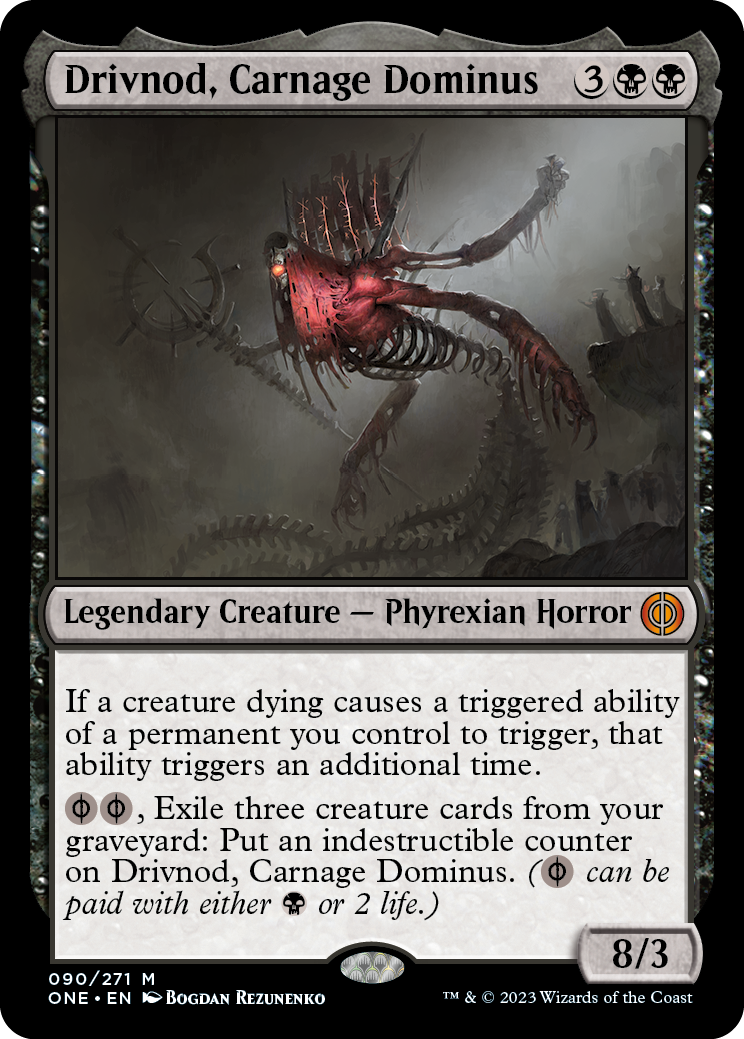
{3}{B}{B}
Legendary Creature — Phyrexian Horror
8/3
If a creature dying causes a triggered ability of a permanent you control to trigger, that ability triggers an additional time.
{B/P}{B/P}, Exile three creature cards from your graveyard: Put an indestructible counter on Drivnod, Carnage Dominus. ({B/P} can be paid with either {B} or 2 life.)
- Drivnod affects a creature's own "when this creature dies" triggered abilities as well as other triggered abilities that trigger when that creature dies. Such triggered abilities start with "when" or "whenever."
- Drivnod's effect doesn't copy the triggered ability; it just causes the ability to trigger twice. Any choices made as you put the ability onto the stack, such as modes and targets, are made separately for each instance of the ability. Any choices made on resolution, such as whether to pay a cost for that triggered ability, are also made separately.
- The trigger event doesn't have to specifically refer to "creatures." In these cases, the trigger event may also refer to something being "put into a graveyard from the battlefield." For example, an ability that triggers "whenever an artifact is put into a graveyard from the battlefield" would trigger twice if an artifact creature dies while Drivnod, Carnage Dominus is on the battlefield.
- An ability that triggers when a creature "leaves the battlefield" will trigger twice if that creature leaves the battlefield by dying.
- An ability that triggers on an event that causes a creature to die doesn't trigger twice. For example, an ability that triggers "whenever you sacrifice a creature" triggers only once.
- Look at each creature as it exists on the battlefield, taking into account continuous effects, to determine whether any triggered abilities will trigger multiple times. For example, if a land that has become a creature dies, an ability that triggers when it dies triggers twice.
- If a creature dying at the same time that another permanent you control leaves the battlefield causes a triggered ability of that permanent to trigger, that ability triggers an additional time.
- If a creature dying at the same time as Drivnod (including Drivnod itself dying) causes a triggered ability of a permanent you control to trigger, that ability triggers an additional time.
- If you somehow control two Drivnods, a creature dying causes abilities to trigger three times, not four. A third Drivnod causes abilities to trigger four times, a fourth causes abilities to trigger five times, and so on. This also means that if you control Drivnod and cast a second one, an ability that triggers when it dies due to the "legend rule" triggers three times.
- A nontoken creature dying will cause an ability of a permanent that triggers whenever a card is put into a graveyard "from anywhere" to trigger twice only if Drivnod and that permanent are both still on the battlefield immediately after the creature has died.
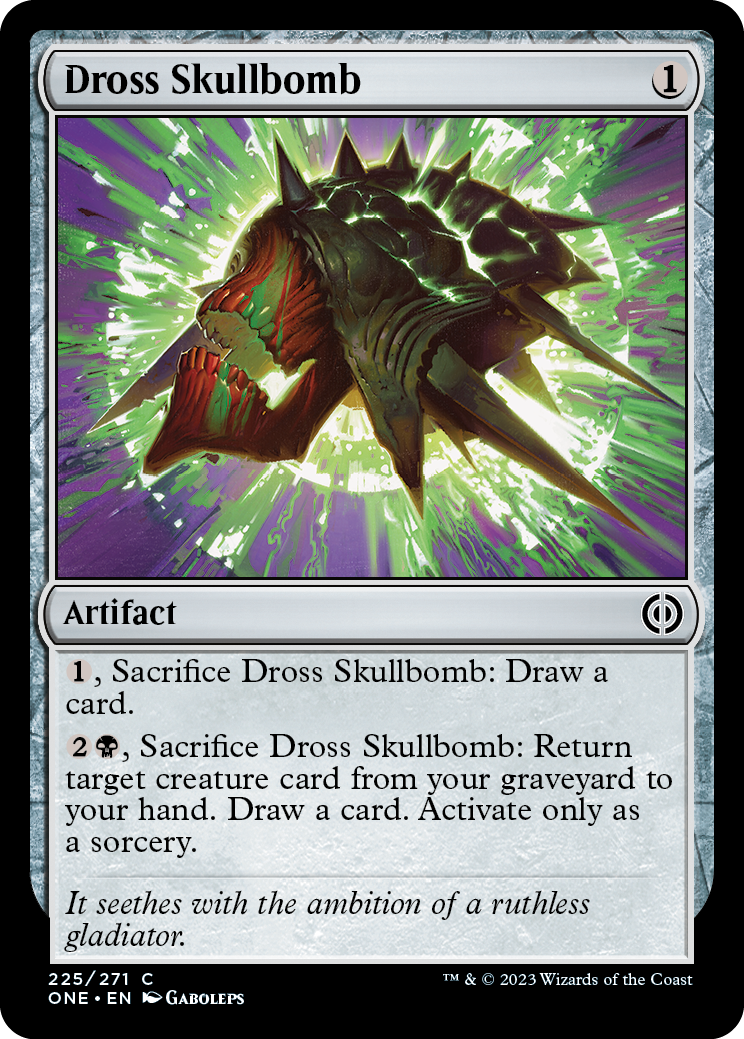
{1}
Artifact
{1}, Sacrifice Dross Skullbomb: Draw a card.
{2}{B}, Sacrifice Dross Skullbomb: Return target creature card from your graveyard to your hand. Draw a card. Activate only as a sorcery.
- If the target of Dross Skullbomb's last ability isn't a legal target as the ability tries to resolve (probably because it has left the graveyard), you won't draw a card.
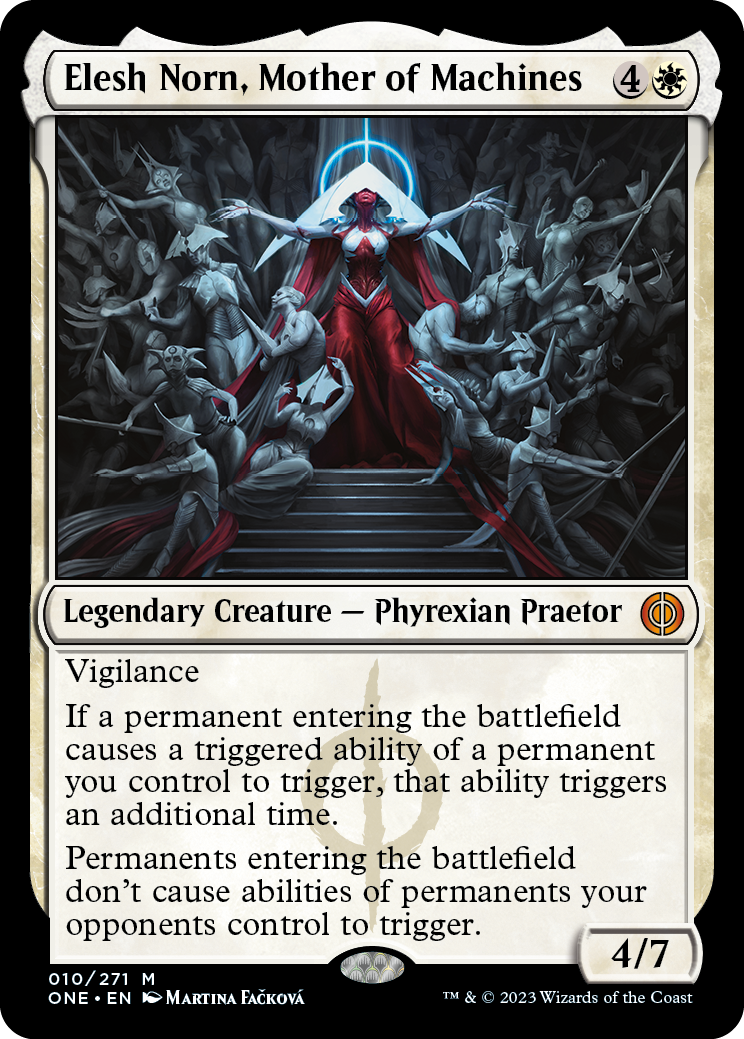
{4}{W}
Legendary Creature — Phyrexian Praetor
4/7
Vigilance
If a permanent entering the battlefield causes a triggered ability of a permanent you control to trigger, that ability triggers an additional time.
Permanents entering the battlefield don't cause abilities of permanents your opponents control to trigger.
- Elesh Norn's second and third ability each affects a permanent's own enters-the-battlefield triggered abilities as well as other triggered abilities that trigger when that permanent enters the battlefield. Such triggered abilities start with "when" or "whenever." Some keyword abilities also include a triggered ability that happens when a permanent enters the battlefield, such as For Mirrodin!
- Replacement effects are unaffected by Elesh Norn's abilities. For example, a creature that enters the battlefield under your control with one +1/+1 counter on it won't receive an additional +1/+1 counter.
- Abilities that apply "as [this permanent] enters the battlefield," such as choosing a card type with Stenn, Paranoid Partisan, are also unaffected.
- Elesh Norn's abilities don't look at who controls the permanent entering the battlefield, only who controls the permanent that has the triggered ability. For example, if you control Elesh Norn and a permanent with the ability "Whenever a creature enters the battlefield, you gain 1 life," a creature entering the battlefield under an opponent's control will cause that ability to trigger twice.
- Elesh Norn's first ability doesn't copy the triggered ability; it just causes the ability to trigger twice. Any choices made as you put the ability onto the stack, such as modes and targets, are made separately for each instance of the ability. Any choices made on resolution, such as whether to put counters on a permanent, are also made individually.
- If you somehow control two Elesh Norns, a permanent entering the battlefield causes abilities to trigger three times, not four. A third Elesh Norn causes abilities to trigger four times, a fourth causes abilities to trigger five times, and so on.
- If a permanent entering the battlefield at the same time as Elesh Norn (including Elesh Norn itself) causes a triggered ability of a permanent you control to trigger, that ability triggers an additional time.
- Similarly, a permanent entering the battlefield at the same time as Elesh Norn (still including Elesh Norn) won't cause abilities of permanents an opponent controls to trigger.
- If a triggered ability is linked to a second ability, additional instances of that triggered ability are also linked to that second ability. If the second ability refers to "the exiled card," it refers to all cards exiled by instances of the triggered ability.
- In some cases involving linked abilities, an ability requires information about "the exiled card." When this happens, the ability gets multiple answers. If these answers are being used to determine the value of a variable, the sum is used. For example, if Elite Arcanist's enters-the-battlefield ability triggers twice, two cards are exiled. The value of X in the activation cost of Elite Arcanist's other ability is the sum of the two cards' mana values. As the ability resolves, you create copies of both cards and can cast none, one, or both of the copies in any order.
- In a Two-Headed Giant game, Elesh Norn does not affect triggered abilities of permanents your teammate controls.
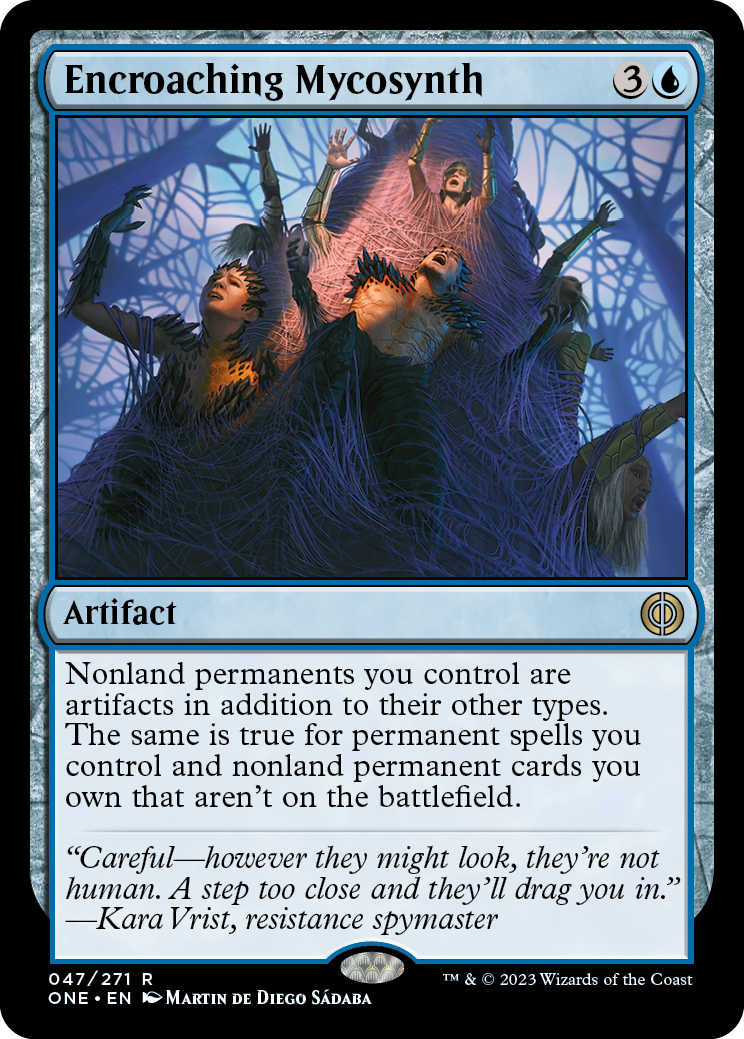
{3}{U}
Artifact
Nonland permanents you control are artifacts in addition to their other types. The same is true for permanent spells you control and nonland permanent cards you own that aren't on the battlefield.
- Encroaching Mycosynth turns all permanents you control into artifacts. Permanent spells you control become artifact spells in addition to their other types, and nonland permanent cards you own in other zones become artifact cards in addition to their other types.
- Encroaching Mycosynth's ability causes Auras to become artifacts. This makes it more likely that another effect (such as that of March of the Machines) will make those artifact Auras into creatures. An Aura that's also a creature can't enchant anything. It's unattached the next time state-based actions are checked, and then immediately put into its owner's graveyard as a second state-based action.
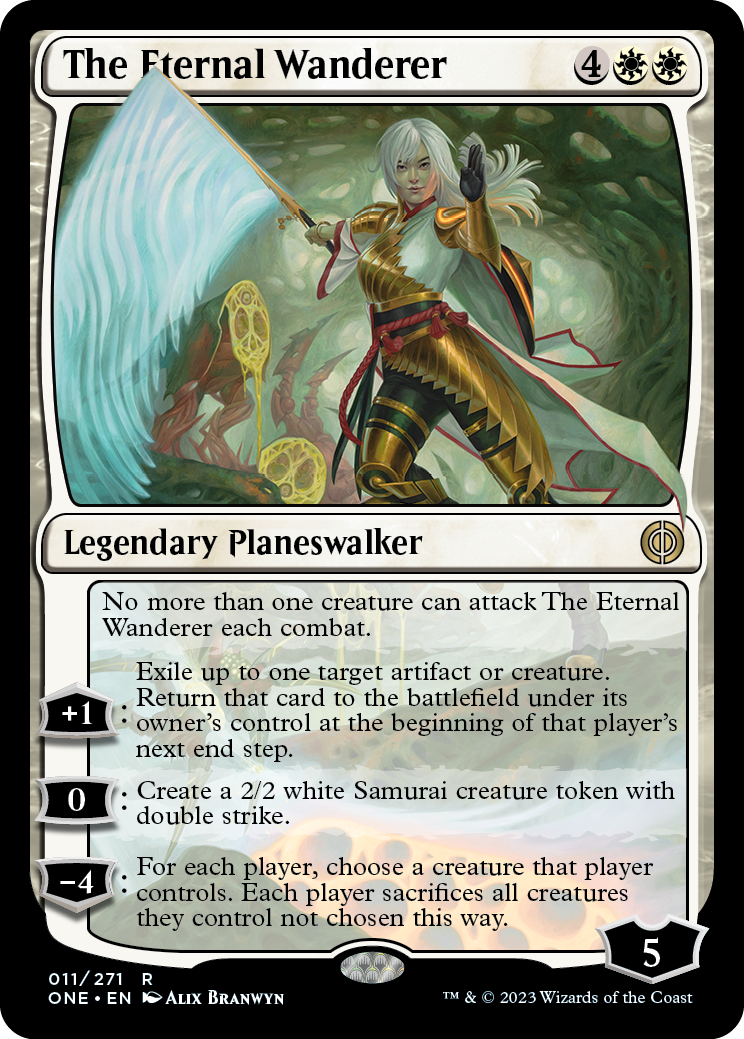
{4}{W}{W}
Legendary Planeswalker
5
No more than one creature can attack The Eternal Wanderer each combat.
+1: Exile up to one target artifact or creature. Return that card to the battlefield under its owner's control at the beginning of that player's next end step.
0: Create a 2/2 white Samurai creature token with double strike.
−4: For each player, choose a creature that player controls. Each player sacrifices all creatures they control not chosen this way.
- The Eternal Wanderer does not have a planeswalker type.
- For the first loyalty ability, the exiled card will return to the battlefield at the beginning of that player's next end step even if The Eternal Wanderer is no longer on the battlefield at that time.
- If the permanent that returns to the battlefield has any abilities that trigger at the beginning of the end step, those abilities won't trigger that turn.
- Auras attached to the exiled permanent will be put into their owners' graveyards. Equipment attached to the exiled permanent will become unattached and remain on the battlefield. Any counters on the exiled permanent will cease to exist. Once the exiled permanent returns, it's considered a new object with no relation to the object that it was.
- If a token is exiled this way, it will cease to exist and won't return to the battlefield.
- For the last loyalty ability, none of the chosen creatures are targets of the ability. You may choose creatures with hexproof, for example, and choosing a creature with ward will not cause the ward ability to trigger.
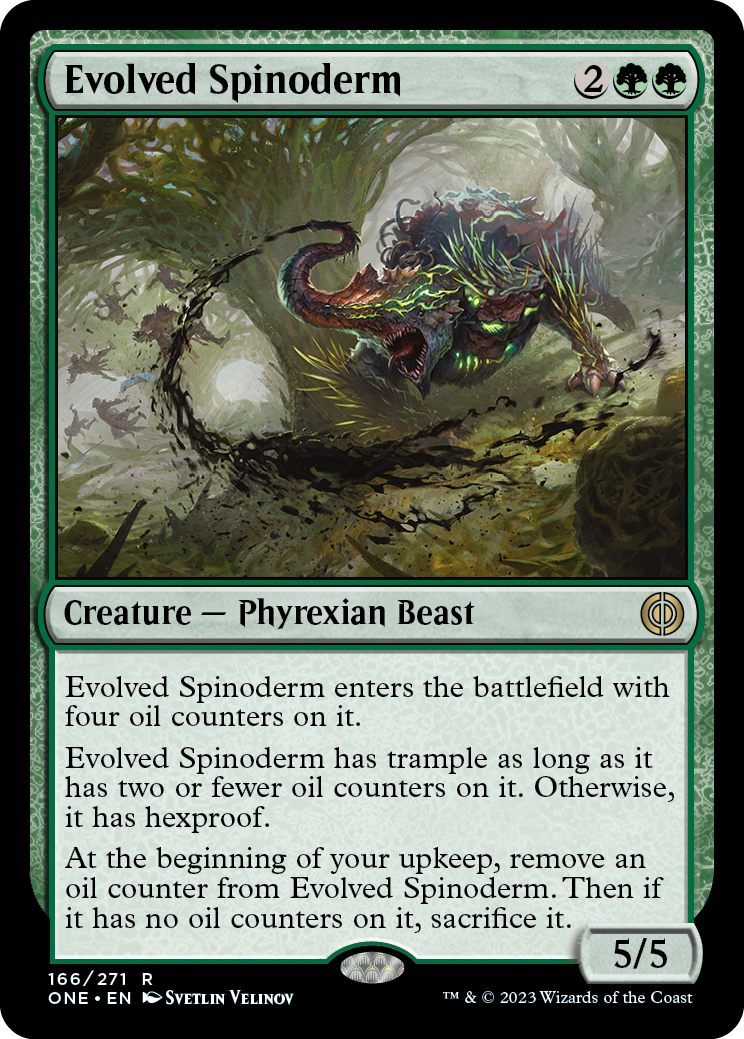
{2}{G}{G}
Creature — Phyrexian Beast
5/5
Evolved Spinoderm enters the battlefield with four oil counters on it.
Evolved Spinoderm has trample as long as it has two or fewer oil counters on it. Otherwise, it has hexproof.
At the beginning of your upkeep, remove an oil counter from Evolved Spinoderm. Then if it has no oil counters on it, sacrifice it.
- If Evolved Spinoderm somehow loses all of its oil counters due to an effect other than its upkeep triggered ability, this won't cause its controller to sacrifice it until the next time its upkeep triggered ability resolves.
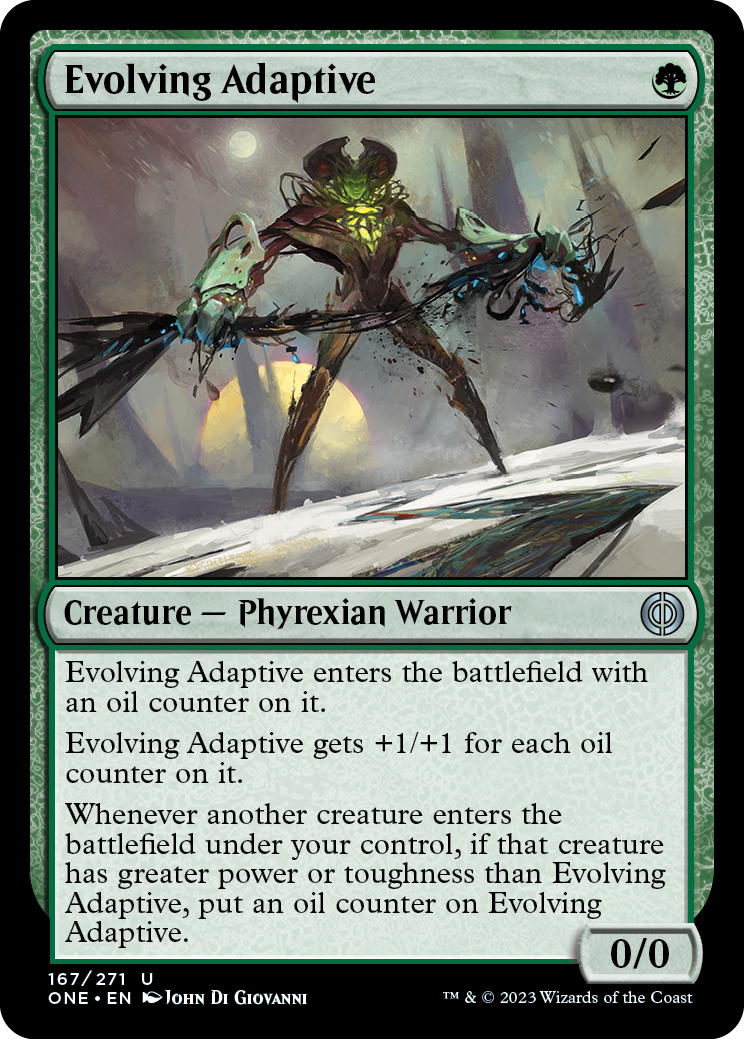
{G}
Creature — Phyrexian Warrior
0/0
Evolving Adaptive enters the battlefield with an oil counter on it.
Evolving Adaptive gets +1/+1 for each oil counter on it.
Whenever another creature enters the battlefield under your control, if that creature has greater power or toughness than Evolving Adaptive, put an oil counter on Evolving Adaptive.
- When comparing the stats of the two creatures for Evolving Adaptive's last ability, you always compare power to power and toughness to toughness.
- Whenever another creature enters the battlefield under your control, check its power and toughness against the power and toughness of Evolving Adaptive. If neither stat of the new creature is greater, the last ability won't trigger at all.
- If the ability triggers, the stat comparison will happen again when the ability tries to resolve. If neither stat of the new creature is greater, the ability will do nothing. If the creature that entered the battlefield leaves the battlefield before the ability tries to resolve, use its last known power and toughness to compare the stats.
- If a creature enters the battlefield with +1/+1 counters on it, consider those counters when determining if Evolving Adaptive's ability will trigger.
- When comparing the stats as the ability resolves, it's possible that the stat that's greater changes from power to toughness or vice versa. If this happens, the ability will still resolve and you'll put an oil counter on Evolving Adaptive. For example, if you control an Evolving Adaptive with two oil counters and a 1/3 creature enters the battlefield under your control, its toughness is greater so the ability will trigger. In response, the 1/3 creature gets +2/-2. When the ability tries to resolve, its power is greater. You'll put an oil counter on Evolving Adaptive.
- If multiple creatures enter the battlefield at the same time, Evolving Adaptive's ability may trigger multiple times, although the stat comparison will take place each time one of those abilities tries to resolve. For example, if you control an Evolving Adaptive with two oil counters on it and two 3/3 creatures enter the battlefield, the ability will trigger twice. The first ability will resolve and put an oil counter on Evolving Adaptive. When the second ability tries to resolve, neither the power nor the toughness of the new creature is greater than that of Evolving Adaptive, so that ability does nothing.

{2}{G}{U}
Legendary Creature — Phyrexian Elf Warrior
3/3
When Ezuri, Stalker of Spheres enters the battlefield, you may pay {3}. If you do, proliferate twice.
Whenever you proliferate, draw a card.
- While proliferating twice, players can't respond between proliferating the first time and proliferating the second time.
- If you proliferate twice, you don't have to choose the same set of players and/or permanents to get additional counters each time.
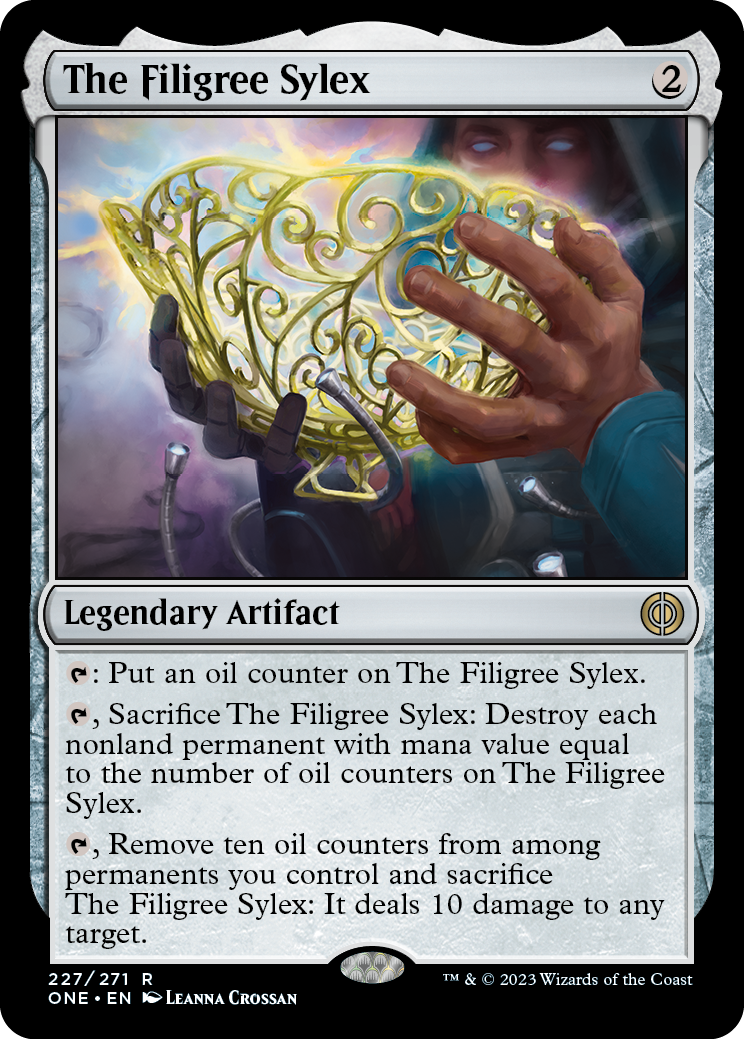
{2}
Legendary Artifact
{T}: Put an oil counter on The Filigree Sylex.
{T}, Sacrifice The Filigree Sylex: Destroy each nonland permanent with mana value equal to the number of oil counters on The Filigree Sylex.
{T}, Remove ten oil counters from among permanents you control and sacrifice The Filigree Sylex: It deals 10 damage to any target.
- If a permanent has {X} in its mana cost, X is 0 when determining its mana value.
{2}{R}
Creature — Phyrexian Warrior
3/2
Whenever another creature or artifact you control is put into a graveyard from the battlefield, put an oil counter on Forgehammer Centurion.
Whenever Forgehammer Centurion attacks, you may remove two oil counters from it. When you do, target creature can't block this turn.
- You don't choose a target for Forgehammer Centurion's last ability at the time it triggers. Rather, a second "reflexive" ability triggers when you remove two oil counters this way. You choose a target for that ability as it goes on the stack. Each player may respond to this triggered ability as normal.
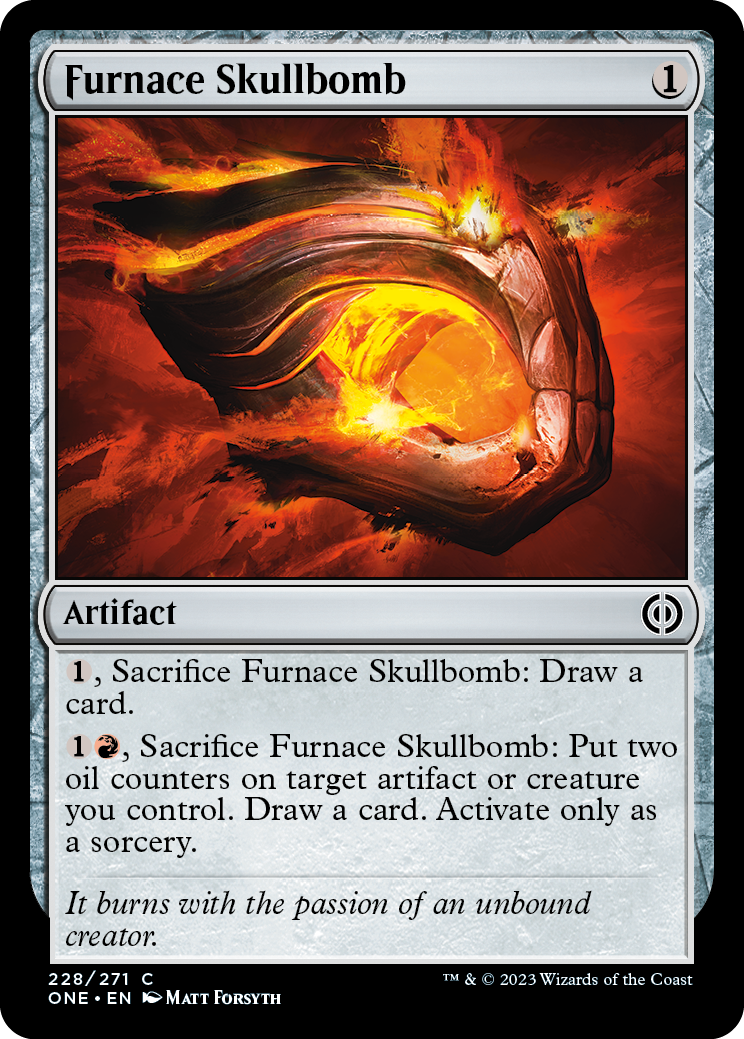
{1}
Artifact
{1}, Sacrifice Furnace Skullbomb: Draw a card.
{1}{R}, Sacrifice Furnace Skullbomb: Put two oil counters on target artifact or creature you control. Draw a card. Activate only as a sorcery.
- If the target of Furnace Skullbomb's last ability isn't a legal target as the ability tries to resolve (probably because it has left the battlefield), you won't draw a card.
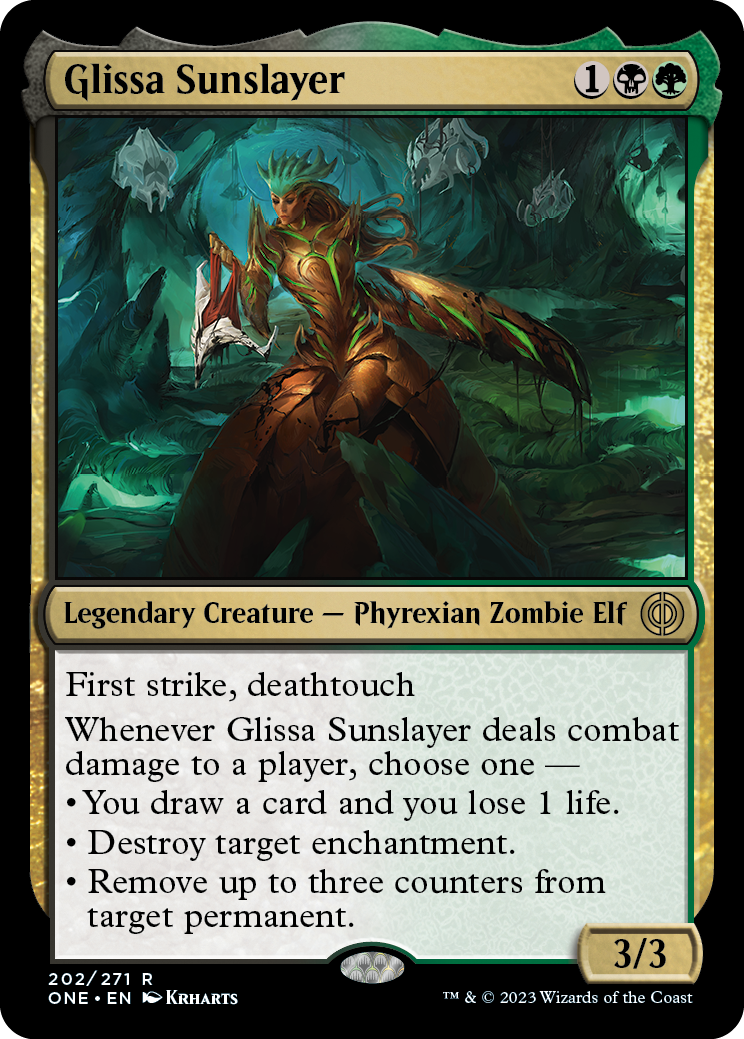
{1}{B}{G}
Legendary Creature — Phyrexian Zombie Elf
3/3
First strike, deathtouch
Whenever Glissa Sunslayer deals combat damage to a player, choose one —
• You draw a card and you lose 1 life.
• Destroy target enchantment.
• Remove up to three counters from target permanent.
- For the third mode, you choose which counters to remove as the ability resolves. You may remove any three (or fewer) counters, even if the permanent has multiple kinds of counters on it.
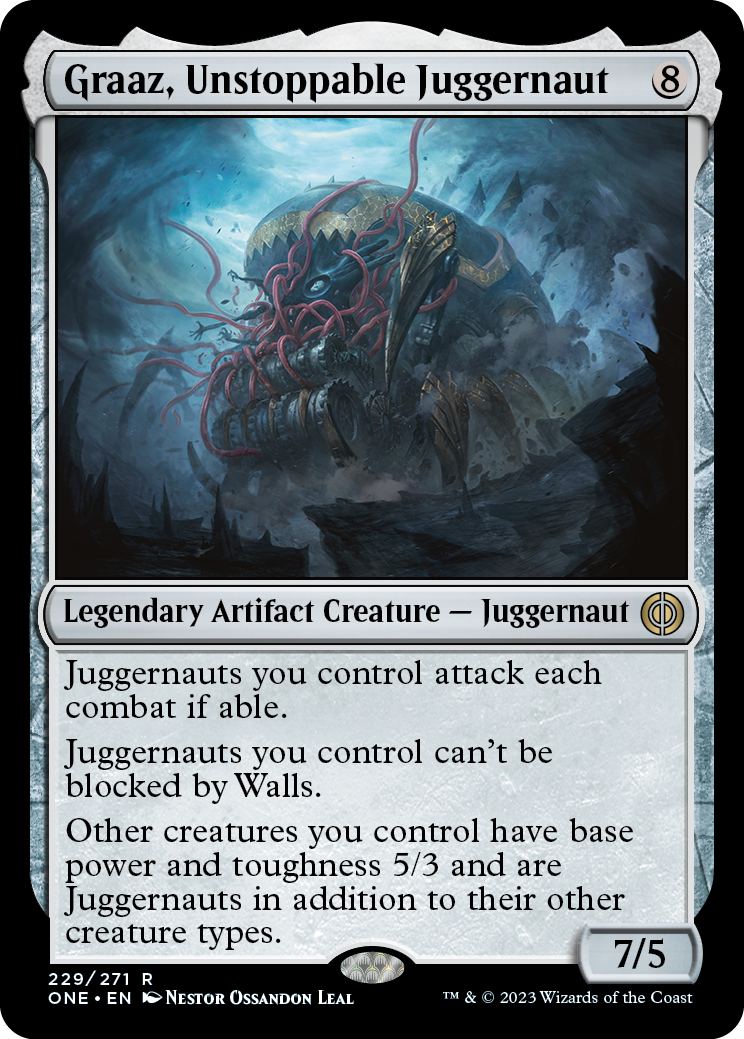
{8}
Legendary Artifact Creature — Juggernaut
7/5
Juggernauts you control attack each combat if able.
Juggernauts you control can't be blocked by Walls.
Other creatures you control have base power and toughness 5/3 and are Juggernauts in addition to their other creature types.
- If Graaz loses its abilities for some reason, then Juggernauts you control will not have to attack each combat and will be able to be blocked by Walls. However, due to how continuous effects are applied in layers, other creatures you control will continue to be 5/3 Juggernauts in addition to their other types. Unstoppable, indeed!
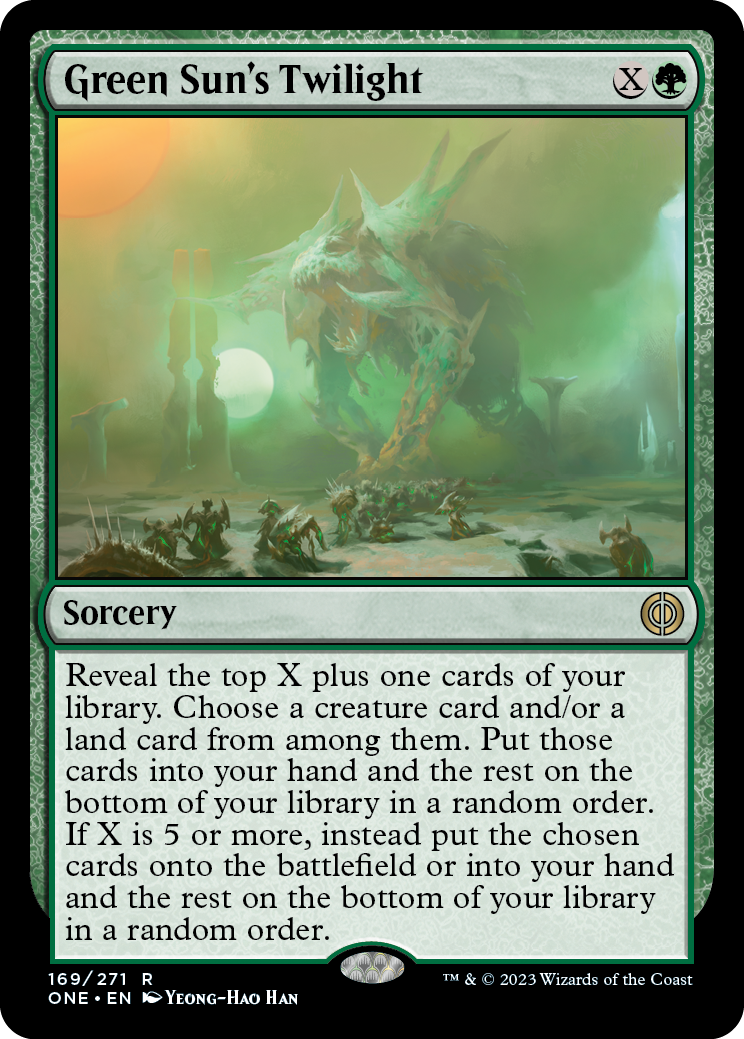
{X}{G}
Sorcery
Reveal the top X plus one cards of your library. Choose a creature card and/or a land card from among them. Put those cards into your hand and the rest on the bottom of your library in a random order. If X is 5 or more, instead put the chosen cards onto the battlefield or into your hand and the rest on the bottom of your library in a random order.
- If X is 5 or more, you choose whether to put both cards into your hand or both cards onto the battlefield. You can't choose to put one into your hand and the other onto the battlefield.
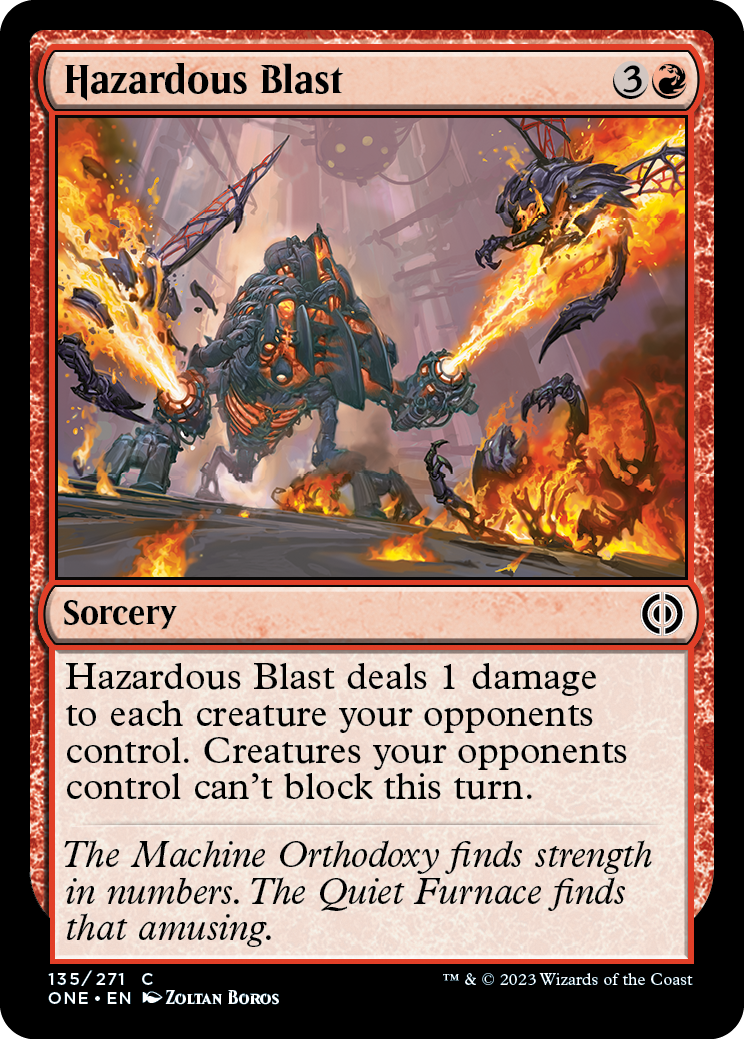
{3}{R}
Sorcery
Hazardous Blast deals 1 damage to each creature your opponents control. Creatures your opponents control can't block this turn.
- Creatures your opponents control can't block the same turn Hazardous Blast resolves whether or not they were actually dealt damage by it. This includes creatures that entered the battlefield and permanents that became creatures after it resolved.
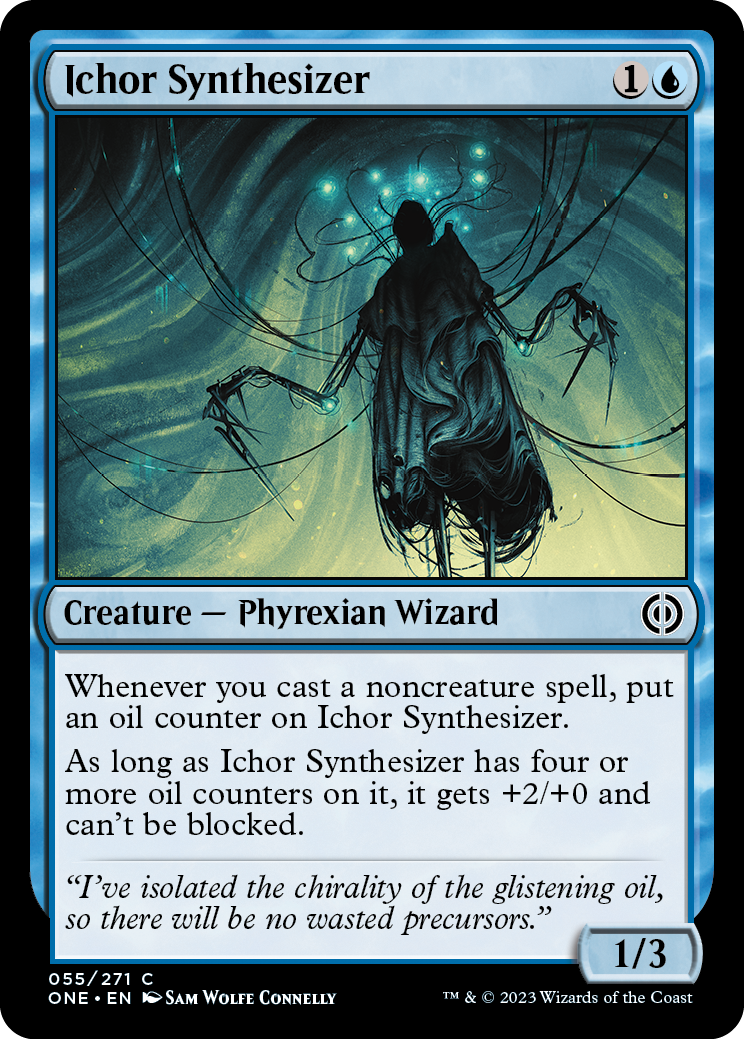
{1}{U}
Creature — Phyrexian Wizard
1/3
Whenever you cast a noncreature spell, put an oil counter on Ichor Synthesizer.
As long as Ichor Synthesizer has four or more oil counters on it, it gets +2/+0 and can't be blocked.
- Putting a fourth oil counter on Ichor Synthesizer after it has become blocked will not cause it to become unblocked.
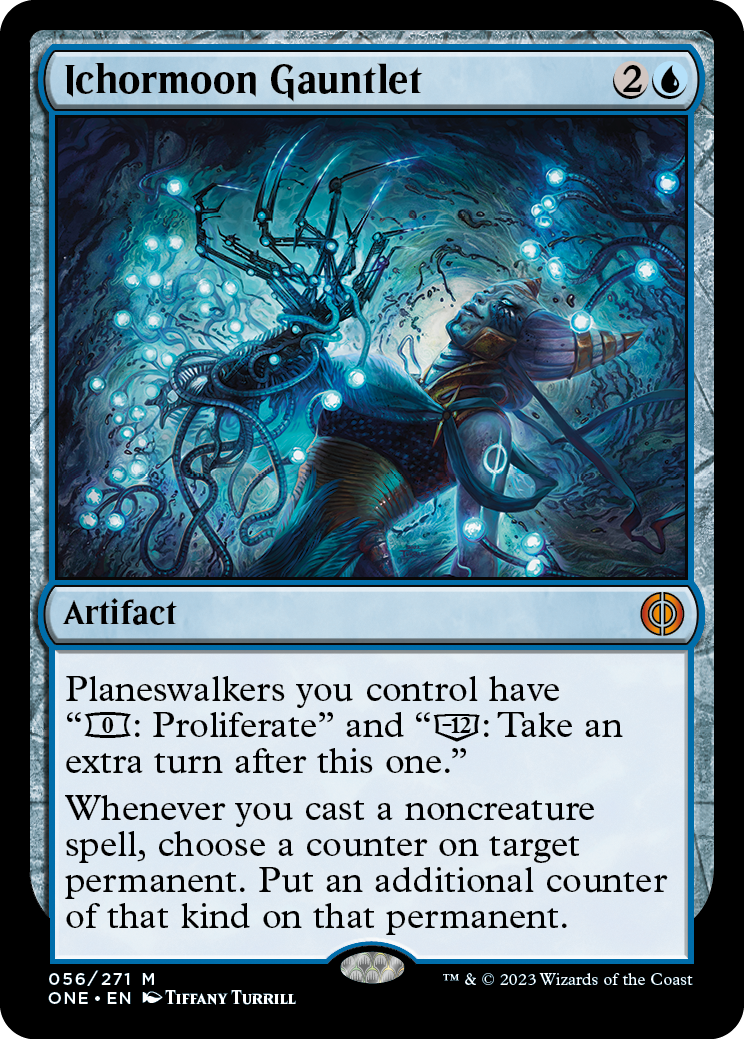
{2}{U}
Artifact
Planeswalkers you control have "[0]: Proliferate" and "[–12]: Take an extra turn after this one."
Whenever you cast a noncreature spell, choose a counter on target permanent. Put an additional counter of that kind on that permanent.
- Only one loyalty ability of each planeswalker may be activated per turn, no matter how many it has gained.
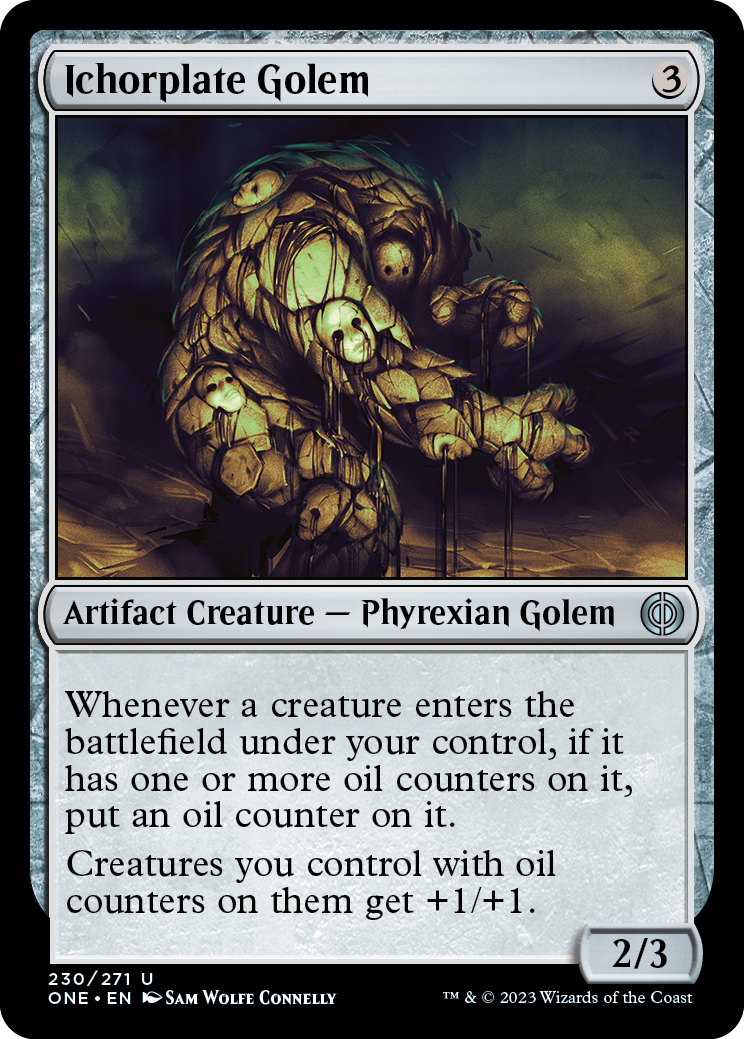
{3}
Artifact Creature — Phyrexian Golem
2/3
Whenever a creature enters the battlefield under your control, if it has one or more oil counters on it, put an oil counter on it.
Creatures you control with oil counters on them get +1/+1.
- The first ability will check to see if a creature has any oil counters on it at the moment it entered the battlefield. If it doesn't, the ability won't trigger at all. This means that if the creature doesn't enter the battlefield with oil counters on it, there isn't an opportunity to put oil counters on it after it has already entered to get Ichorplate Golem's first ability to trigger. If the ability does trigger, it will check again as it tries to resolve. If the creature has no oil counters on it at that time, the ability will do nothing.
- If a creature has at least one oil counter on it, it gets +1/+1 due to Ichorplate Golem's effect. It does not get any additional bonus for having more oil counters on it.
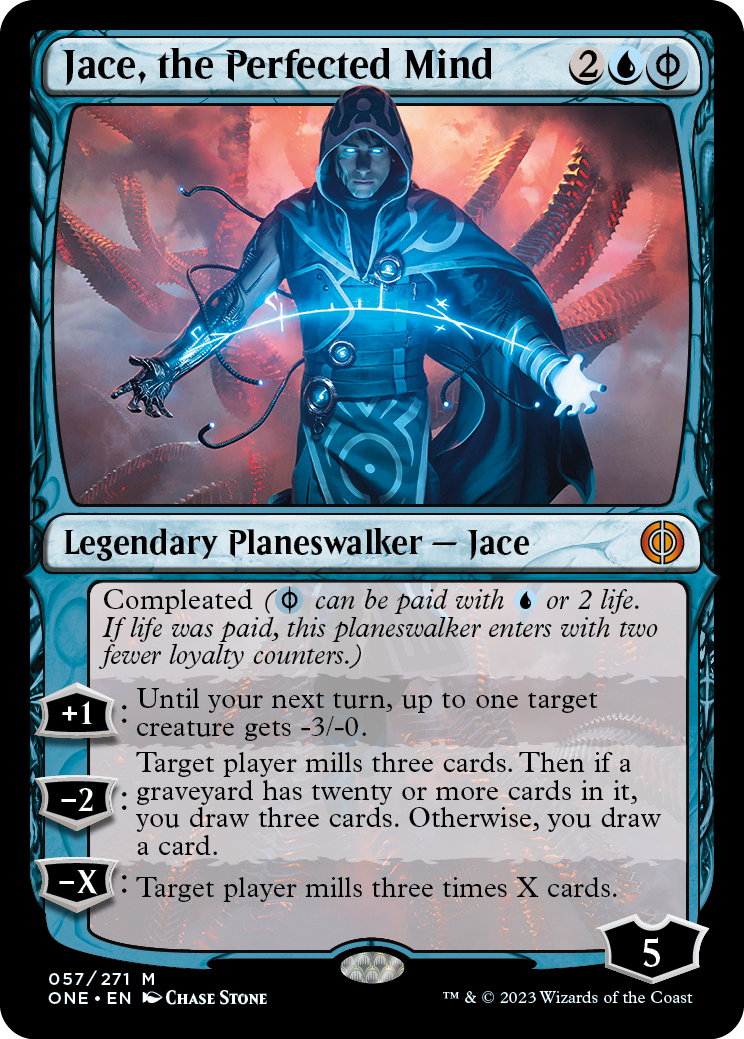
{2}{U}{U/P}
Legendary Planeswalker — Jace
5
Compleated ({U/P} can be paid with {U} or 2 life. If life was paid, this planeswalker enters with two fewer loyalty counters.)
+1: Until your next turn, up to one target creature gets -3/-0.
−2: Target player mills three cards. Then if a graveyard has twenty or more cards in it, you draw three cards. Otherwise, you draw a card.
−X: Target player mills three times X cards.
- Jace's second loyalty ability doesn't care which player's graveyard has twenty or more cards in it. It could be the target player's or another player's.
- A Phyrexian mana symbol contributes 1 toward the mana value of a card, even if life is paid for it. Specifically, Jace's mana value is always 4.
- The compleated ability looks only at whether a player chose to pay 2 life for a Phyrexian mana symbol as they were casting the spell. If a player paid life for some other reason while casting the spell, that will not reduce the number of loyalty counters the planeswalker enters the battlefield with.
- Other replacement effects that would change the number of loyalty counters Jace enters with will apply as normal.
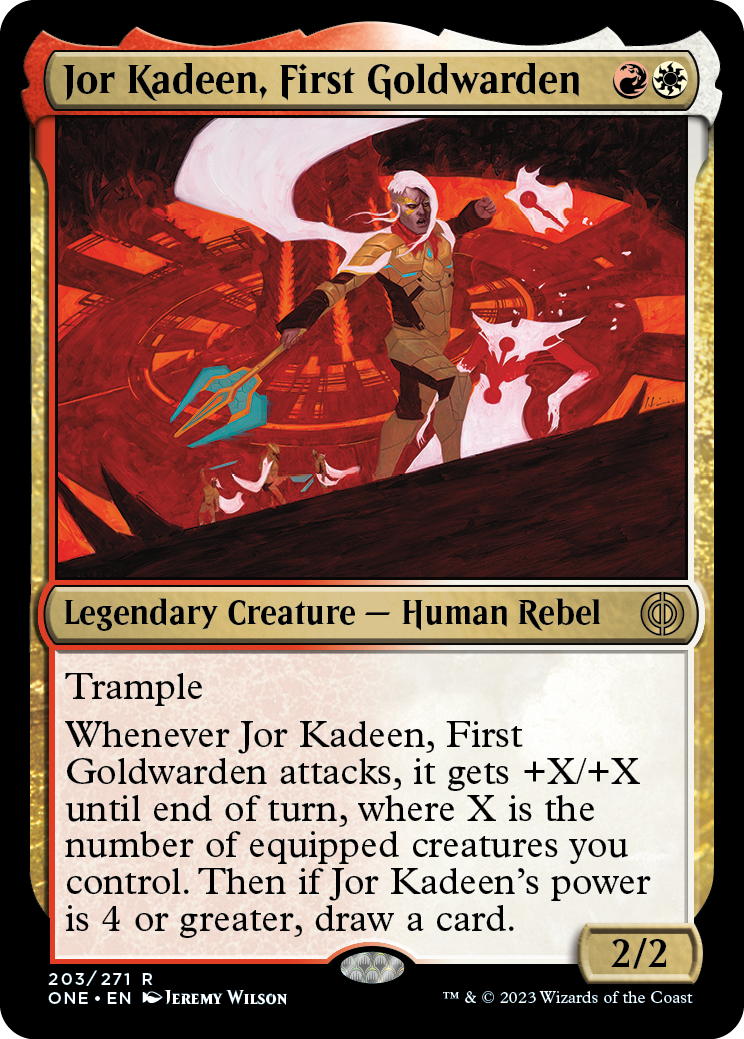
{R}{W}
Legendary Creature — Human Rebel
2/2
Trample
Whenever Jor Kadeen, First Goldwarden attacks, it gets +X/+X until end of turn, where X is the number of equipped creatures you control. Then if Jor Kadeen's power is 4 or greater, draw a card.
- The value of X is determined only once, as the triggered ability resolves. If the number of equipped creatures you control changes after that time, it won't change the bonus granted.
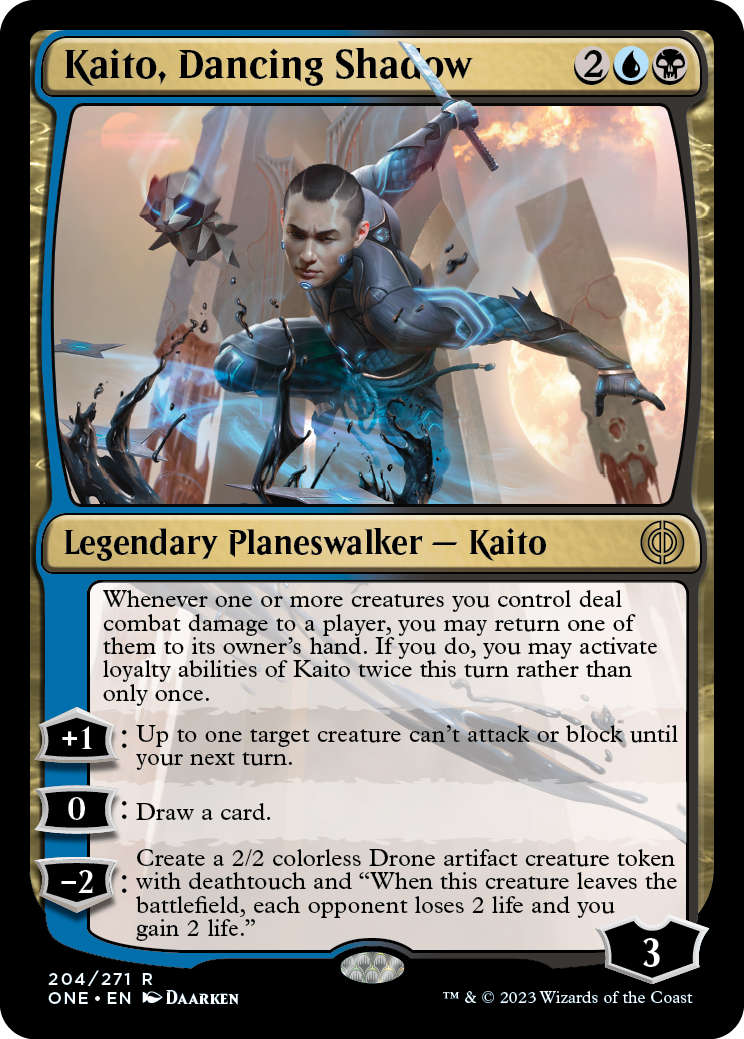
{2}{U}{B}
Legendary Planeswalker — Kaito
3
Whenever one or more creatures you control deal combat damage to a player, you may return one of them to its owner's hand. If you do, you may activate loyalty abilities of Kaito twice this turn rather than only once.
+1: Up to one target creature can't attack or block until your next turn.
0: Draw a card.
−2: Create a 2/2 colorless Drone artifact creature token with deathtouch and "When this creature leaves the battlefield, each opponent loses 2 life and you gain 2 life."
- If you return a creature to its owner's hand with Kaito's first ability, you may activate a single loyalty ability of Kaito twice, or you may activate two different loyalty abilities.
- Even if Kaito's triggered ability triggers more than once in the same turn (perhaps because one or more attackers had first strike, multiple players were dealt combat damage by your creatures, or there were multiple combats), and you return an attacking creature to hand each time, you won't be able to activate Kaito's loyalty abilities more than twice that turn. That is, Kaito's triggered ability is not additive.
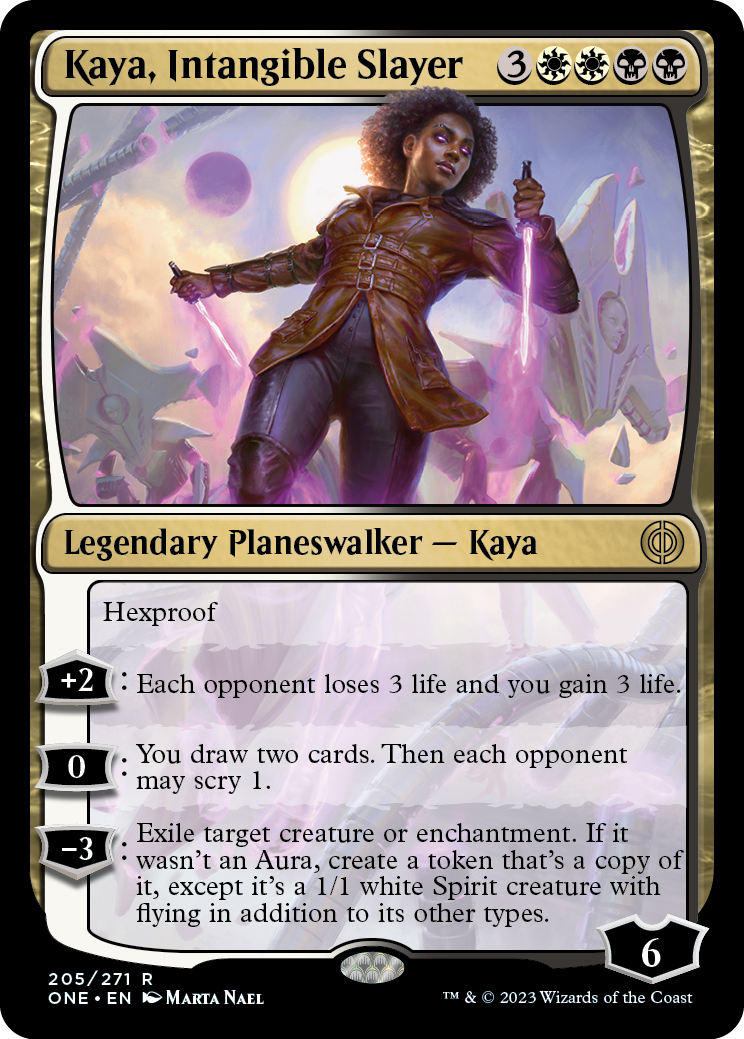
{3}{W}{W}{B}{B}
Legendary Planeswalker — Kaya
6
Hexproof
+2: Each opponent loses 3 life and you gain 3 life.
0: You draw two cards. Then each opponent may scry 1.
−3: Exile target creature or enchantment. If it wasn't an Aura, create a token that's a copy of it, except it's a 1/1 white Spirit creature with flying in addition to its other types.
- For the middle loyalty ability, each opponent in turn order chooses whether or not to scry. Those who do (likely all of them) look at the top card of their library at the same time, then they decide in turn order where their card goes. Each opponent will know the choices of previous players in turn order before making their own choices.
- Except for the listed exceptions, the token copies exactly what was printed on the original permanent and nothing else (unless that permanent is copying something else or it is a token; see below). It doesn't copy whether that creature is tapped or untapped, whether it has any counters on it or Auras and Equipment attached to it, and so on.
- If the copied creature has {X} in its mana cost, X is 0.
- If the copied creature is a token, the new token that's created copies the original characteristics of that token as stated by the effect that created that token, with the exceptions noted above.
- If the copied permanent is copying something else, then the token enters the battlefield as whatever that permanent copied, with the exceptions noted above.
- Any enters-the-battlefield abilities of the copied permanent will trigger when the token enters the battlefield. Any "as [this permanent] enters the battlefield" or "[this permanent] enters the battlefield with" abilities of the chosen permanent will also work.
- Kaya's last ability checks to see whether the permanent was an Aura when it last existed on the battlefield, not whether it is an Aura card in exile. For example, if an enchantment creature with the bestow ability (an ability that allows a creature card to be cast as an Aura instead) is an Aura and the target of Kaya's last ability, the ability will not create a copy of it.
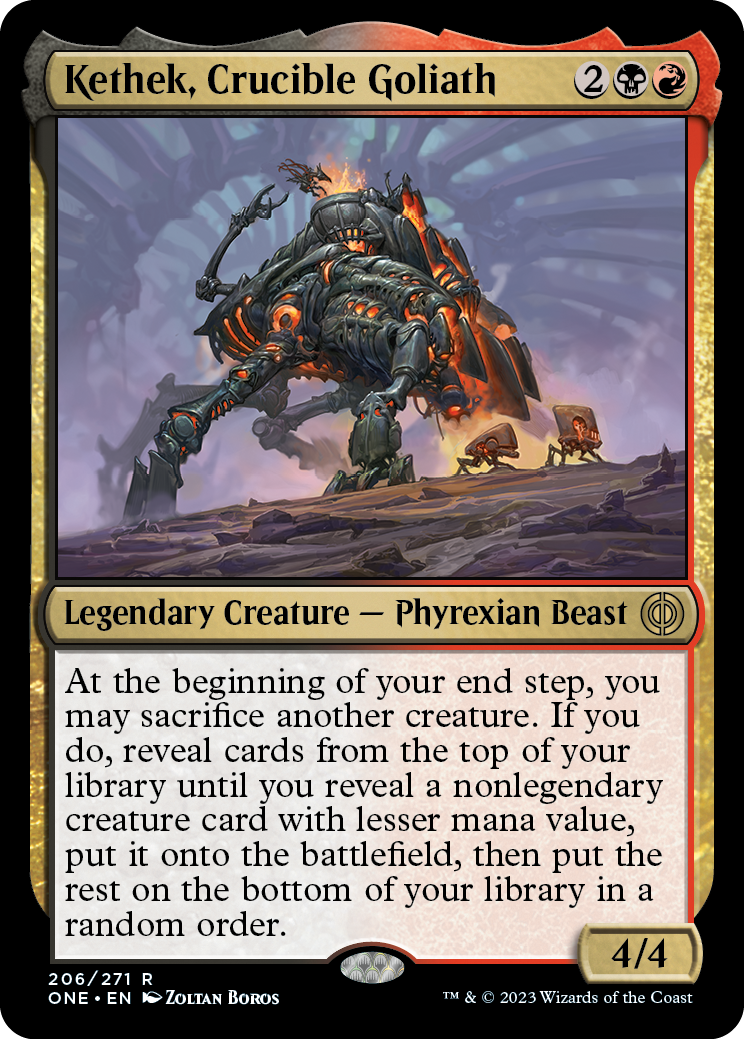
{2}{B}{R}
Legendary Creature — Phyrexian Beast
4/4
At the beginning of your end step, you may sacrifice another creature. If you do, reveal cards from the top of your library until you reveal a nonlegendary creature card with lesser mana value, put it onto the battlefield, then put the rest on the bottom of your library in a random order.
- If a creature on the battlefield has an {X} in its mana cost, X is 0.
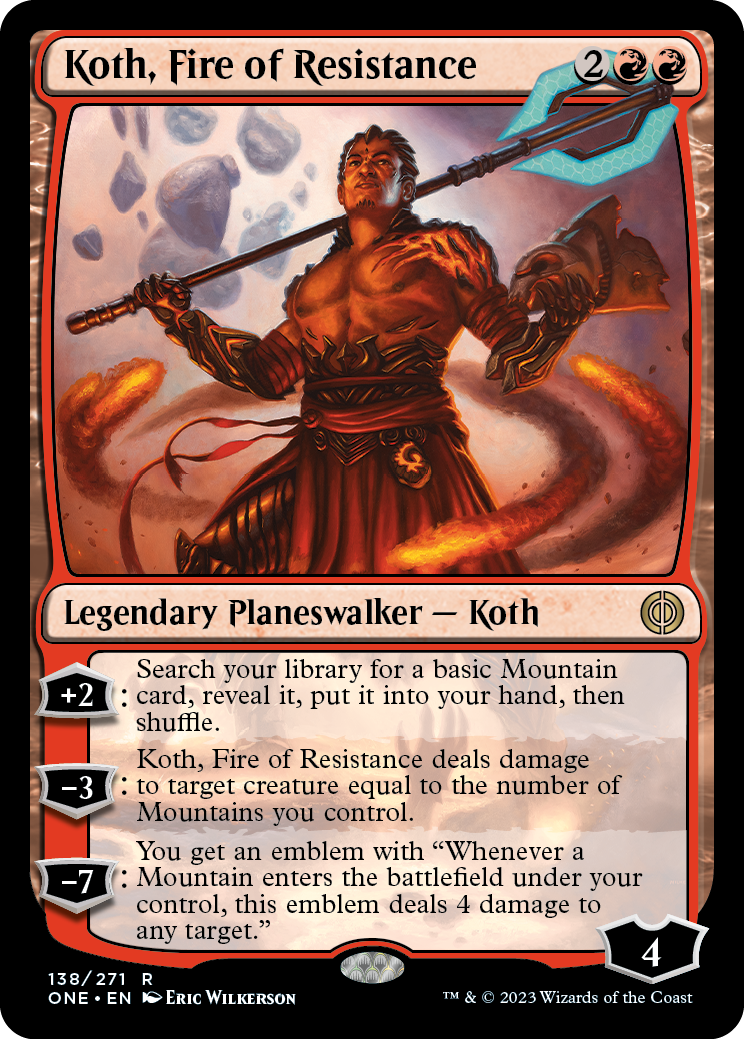
{2}{R}{R}
Legendary Planeswalker — Koth
4
+2: Search your library for a basic Mountain card, reveal it, put it into your hand, then shuffle.
−3: Koth, Fire of Resistance deals damage to target creature equal to the number of Mountains you control.
−7: You get an emblem with "Whenever a Mountain enters the battlefield under your control, this emblem deals 4 damage to any target."
- Koth's emblem is colorless. Notably, this means that protection from red won't stop a permanent or player from being the target of the emblem's ability, nor will it prevent the damage being dealt. Replacement effects that care about damage from a red source don't apply to it.
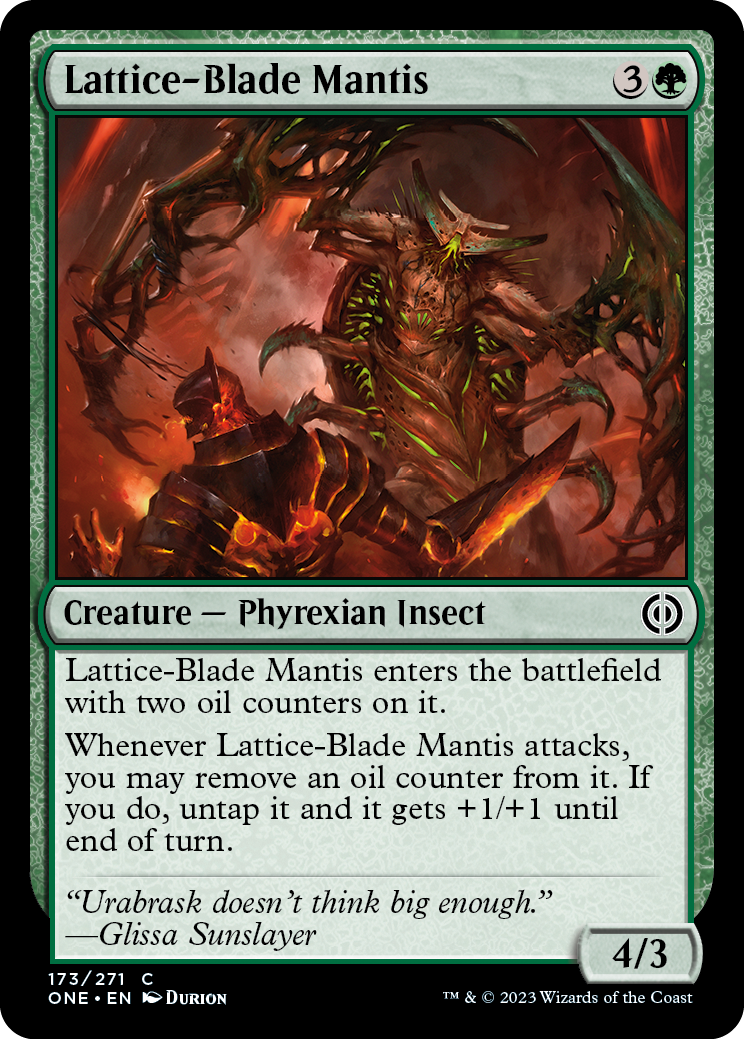
{3}{G}
Creature — Phyrexian Insect
4/3
Lattice-Blade Mantis enters the battlefield with two oil counters on it.
Whenever Lattice-Blade Mantis attacks, you may remove an oil counter from it. If you do, untap it and it gets +1/+1 until end of turn.
- Untapping Lattice-Blade Mantis as its last ability resolves doesn't remove it from combat.
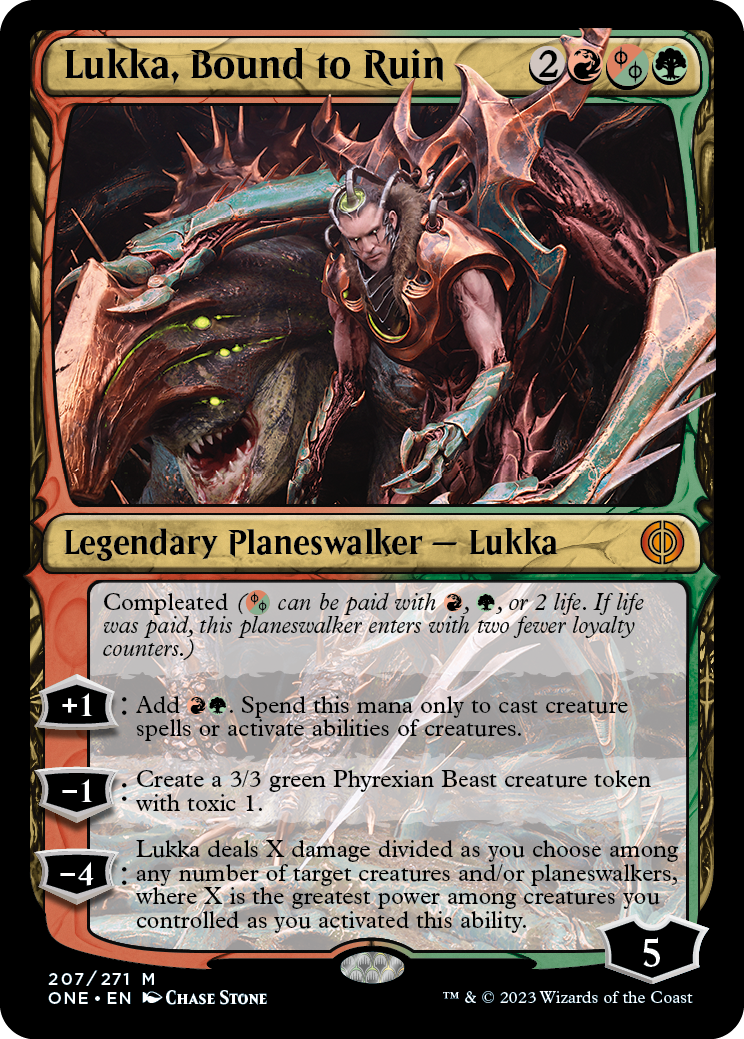
{2}{R}{R/G/P}{G}
Legendary Planeswalker — Lukka
5
Compleated ({R/G/P} can be paid with {R}, {G}, or 2 life. If life was paid, this planeswalker enters with two fewer loyalty counters.)
+1: Add {R}{G}. Spend this mana only to cast creature spells or activate abilities of creatures.
−1: Create a 3/3 green Phyrexian Beast creature token with toxic 1.
−4: Lukka deals X damage divided as you choose among any number of target creatures and/or planeswalkers, where X is the greatest power among creatures you controlled as you activated this ability.
- For Lukka's last ability, you announce the targets and how damage is divided as you activate the ability. Once the ability has been activated, the greatest power among creatures you control no longer matters for this ability. This means once you announce you're activating it, no player can respond to try and lower that power and decrease the damage Lukka can deal.
- You can't choose more targets than the greatest power among creatures you control as you activate the ability, and each chosen target must receive at least 1 damage.
- If some of the targets of the last ability become illegal, the original division of damage still applies, but the damage that would have been dealt to illegal targets isn't dealt at all.
- A hybrid Phyrexian mana symbol contributes 1 toward the mana value of a card, even if life is paid for it. Specifically, Lukka's mana value is always 5.
- The compleated ability looks only at whether a player chose to pay 2 life for a Phyrexian mana symbol as they were casting the spell. If a player paid life for some other reason while casting the spell, that will not reduce the number of loyalty counters the planeswalker enters the battlefield with.
- Other replacement effects that would change the number of loyalty counters Lukka enters with will apply as normal.
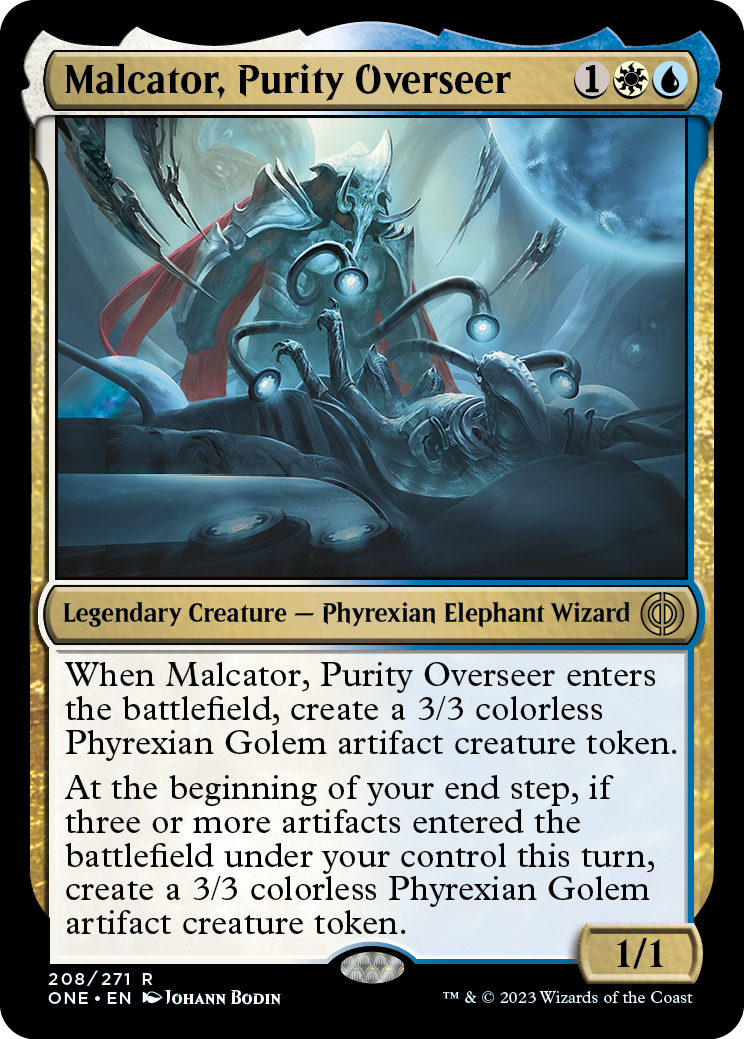
{1}{W}{U}
Legendary Creature — Phyrexian Elephant Wizard
1/1
When Malcator, Purity Overseer enters the battlefield, create a 3/3 colorless Phyrexian Golem artifact creature token.
At the beginning of your end step, if three or more artifacts entered the battlefield under your control this turn, create a 3/3 colorless Phyrexian Golem artifact creature token.
- Malcator will count any artifacts that entered the battlefield under your control during the turn, even if you didn't control Malcator at the time. Malcator won't count non-artifact permanents you controlled that became artifacts.
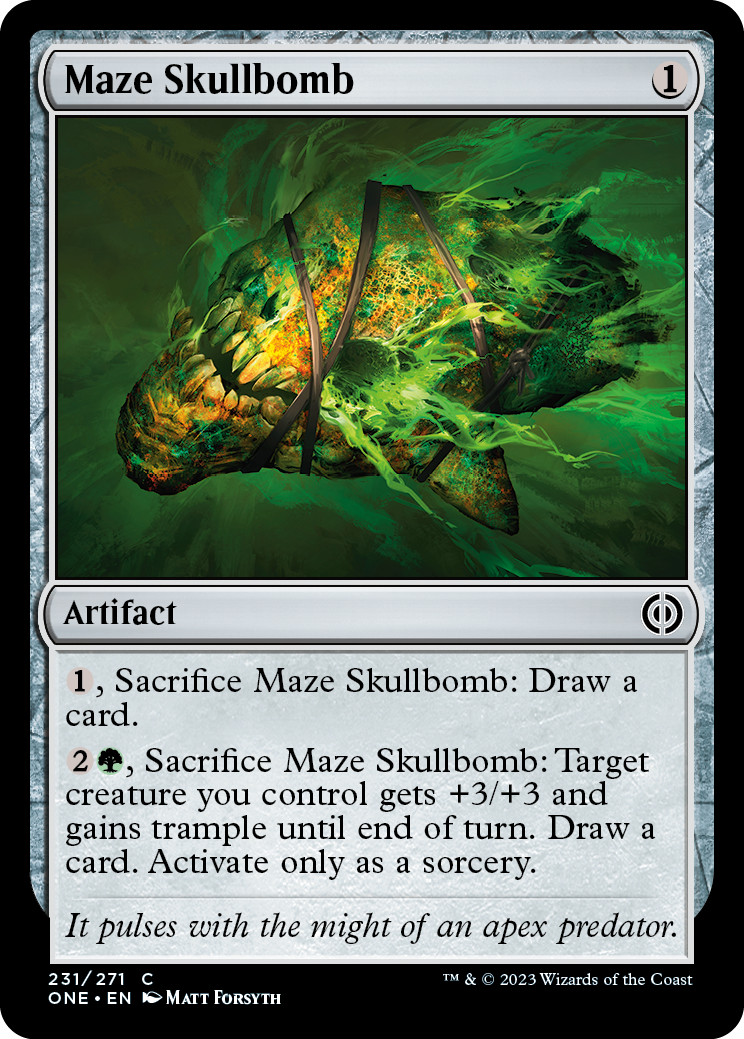
{1}
Artifact
{1}, Sacrifice Maze Skullbomb: Draw a card.
{2}{G}, Sacrifice Maze Skullbomb: Target creature you control gets +3/+3 and gains trample until end of turn. Draw a card. Activate only as a sorcery.
- If the target of Maze Skullbomb's last ability isn't a legal target as the ability tries to resolve (probably because it has left the battlefield), you won't draw a card.
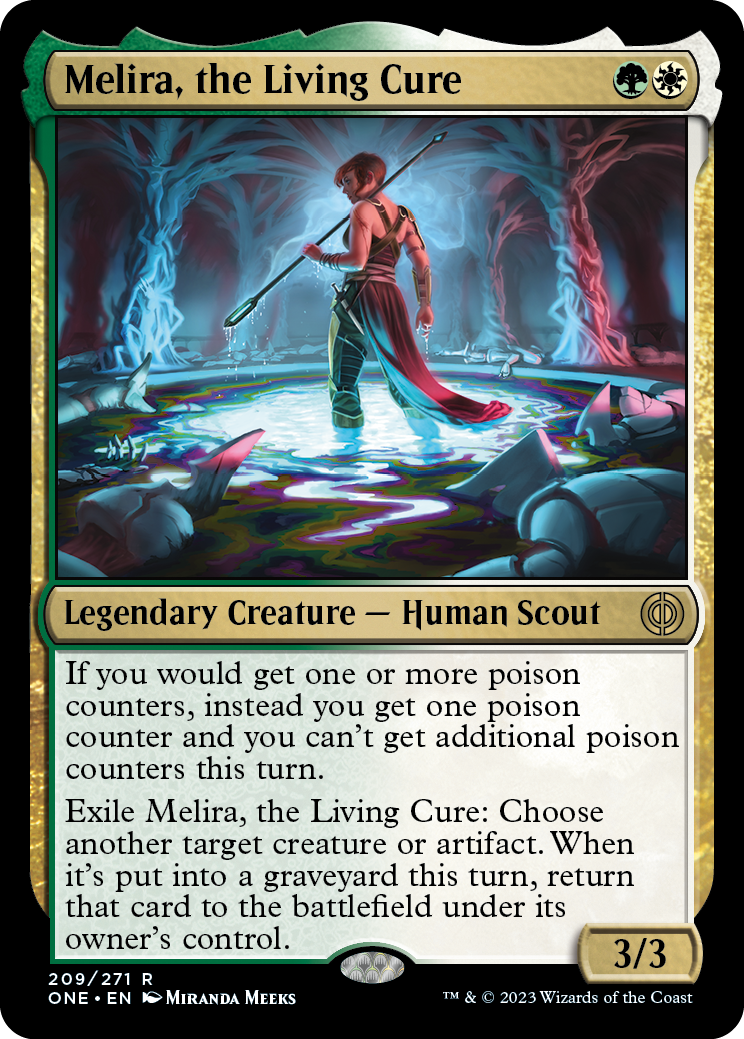
{G}{W}
Legendary Creature — Human Scout
3/3
If you would get one or more poison counters, instead you get one poison counter and you can't get additional poison counters this turn.
Exile Melira, the Living Cure: Choose another target creature or artifact. When it's put into a graveyard this turn, return that card to the battlefield under its owner's control.
- Melira's first ability creates a replacement effect. If another replacement effect would also change the number of poison counters a player receives, such as that of Vorinclex, Monstrous Raider, the player receiving the counters chooses which one to apply first, regardless of who controls what permanents. This will usually result in that player choosing to apply Melira's effect last and receive one counter. However, if they want to, they could apply Melira's replacement effect first and receive more counters.
- Once Melira's replacement effect has been applied in a turn, additional events that would put poison counters on a player don't happen, regardless of any other replacement effects involved.
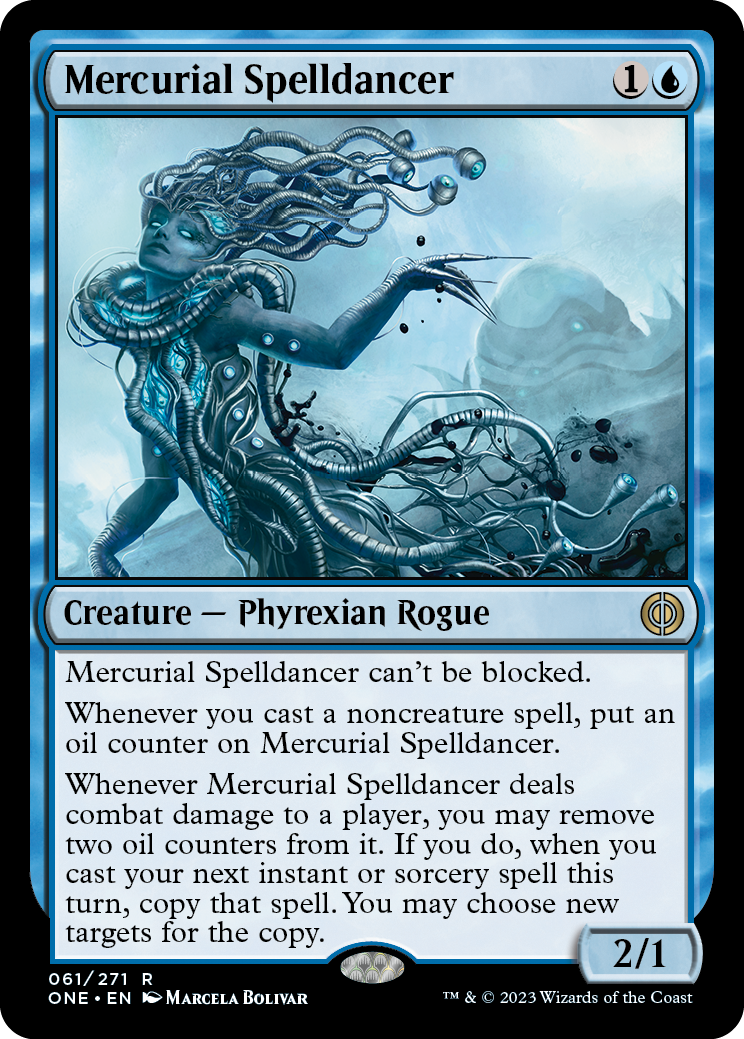
{1}{U}
Creature — Phyrexian Rogue
2/1
Mercurial Spelldancer can't be blocked.
Whenever you cast a noncreature spell, put an oil counter on Mercurial Spelldancer.
Whenever Mercurial Spelldancer deals combat damage to a player, you may remove two oil counters from it. If you do, when you cast your next instant or sorcery spell this turn, copy that spell. You may choose new targets for the copy.
- A copy is created even if the spell that caused the delayed triggered ability to trigger has been countered by the time that delayed triggered ability resolves. The copy resolves before the original spell.
- The copy will have the same targets as the spell it's copying unless you choose new ones. You may change any number of the targets, including all of them or none of them. If the spell is a permanent spell with targets, such as an Aura, you may also choose a new target for that spell. The new targets must be legal. If, for any target, you can't choose a new legal target, then it remains unchanged (even if the current target is illegal).
- The copy is created on the stack, so it's not "cast." Creating the copy won't cause abilities that trigger when a player casts a spell to trigger.
- If the spell that's copied is modal (that is, it says "Choose one —" or the like), the copy will have the same mode or modes. You can't choose different ones.
- If the spell that's copied has an X whose value was determined as it was cast, the copy has the same value of X.
- You can't choose to pay any additional costs for a copied spell. However, effects based on any additional costs that were paid for the original spell are copied as though those same costs were paid for the copy too.
- If the spell has damage divided as it was put onto the stack, the division can't be changed, although the targets receiving that damage still can. The same is true of spells that distribute counters.
- Any choices made when the spell resolves won't have been made yet when it's copied. Any such choices will be made separately when the copy resolves.
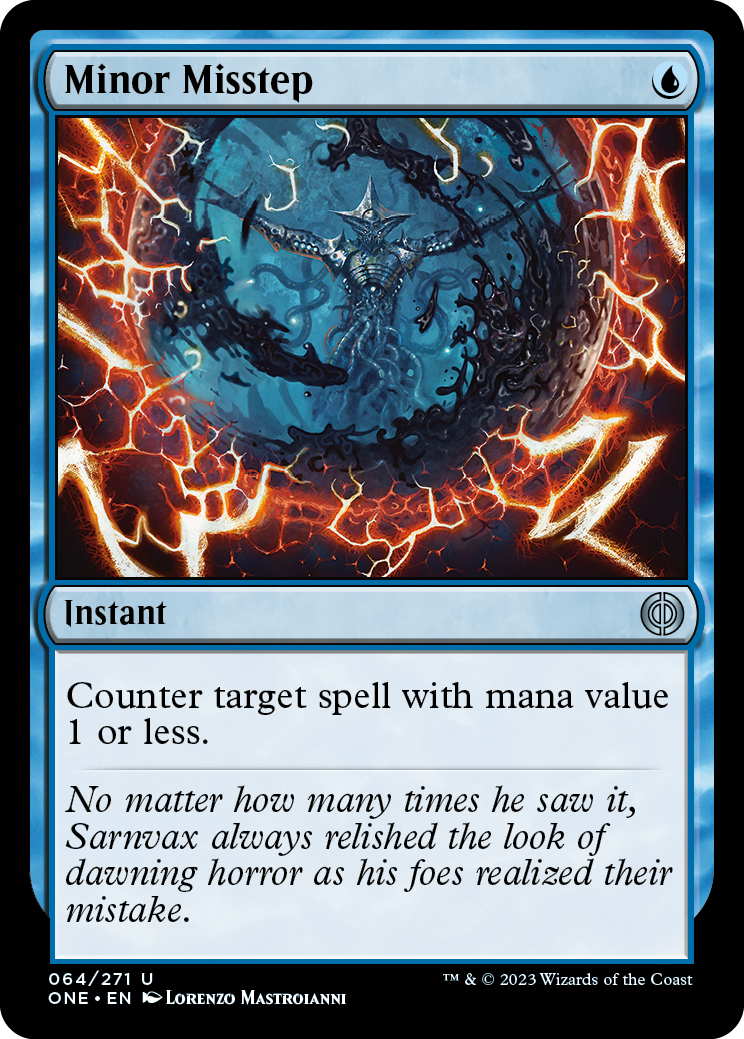
{U}
Instant
Counter target spell with mana value 1 or less.
- While a spell with {X} in its mana cost is on the stack, use the value of X that was chosen when it was cast to determine its mana value. Normally, this means that a spell with {X} in its mana cost will have a mana value greater than 1.
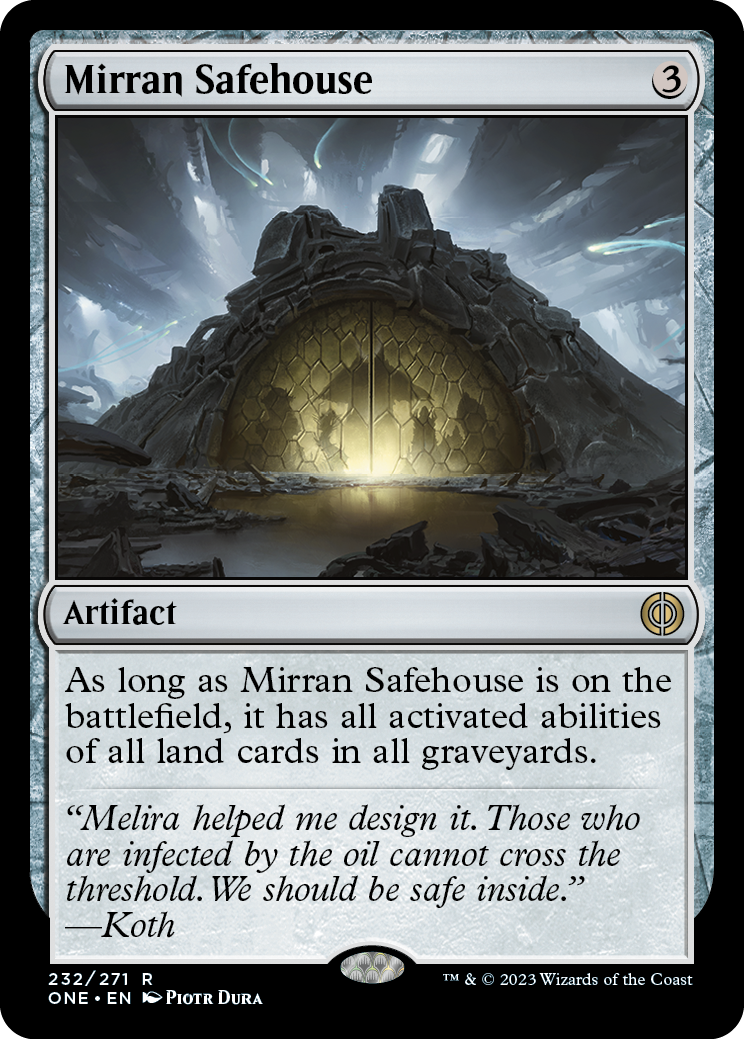
{3}
Artifact
As long as Mirran Safehouse is on the battlefield, it has all activated abilities of all land cards in all graveyards.
- Mirran Safehouse gains only activated abilities, including activated mana abilites. It doesn't gain keyword abilities (unless those keyword abilities are activated), triggered abilities, or static abilities.
- Activated abilities contain a colon. They're generally written "[Cost]: [Effect]." Some keywords are activated abilities; they have colons in their reminder text.
- Cards with basic land types intrinsically have the appropriate mana ability, even if it isn't printed in the card's text box. Mirran Safehouse also gains those abilities. For example, if there is a Plains in your graveyard, Mirran Safehouse has "{T}: Add {W}," even though that may not be printed on the Plains itself.
- If an activated ability of a land card in a graveyard references the card it's printed on by name, treat Mirran Safehouse's version of that ability as though it referenced Mirran Safehouse by name instead.
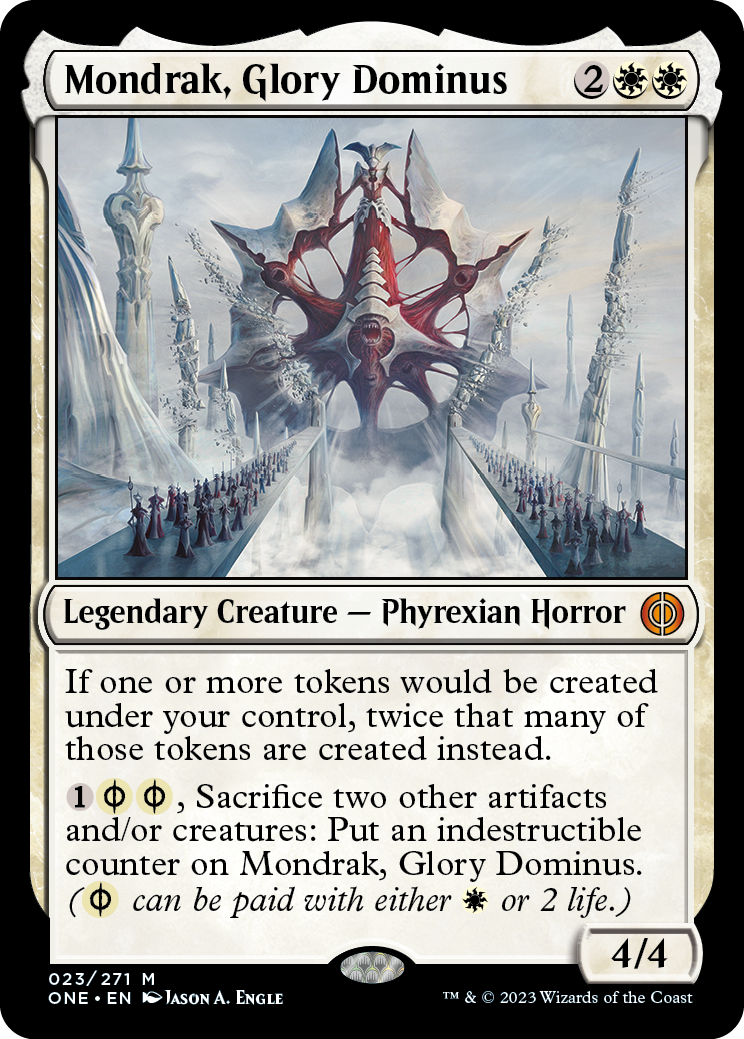
{2}{W}{W}
Legendary Creature — Phyrexian Horror
4/4
If one or more tokens would be created under your control, twice that many of those tokens are created instead.
{1}{W/P}{W/P}, Sacrifice two other artifacts and/or creatures: Put an indestructible counter on Mondrak, Glory Dominus. ({W/P} can be paid with either {W} or 2 life.)
- Everything that is specified by the effect creating the original token or tokens will also be true about the additional token or tokens created by Mondrak's replacement effect. For example, if an effect tells you to create a token "tapped and attacking," the additional tokens will also be tapped and attacking. Similarly, if an effect creates a token and puts counters on it (such as a Fractal token) the additional token will also get those counters.
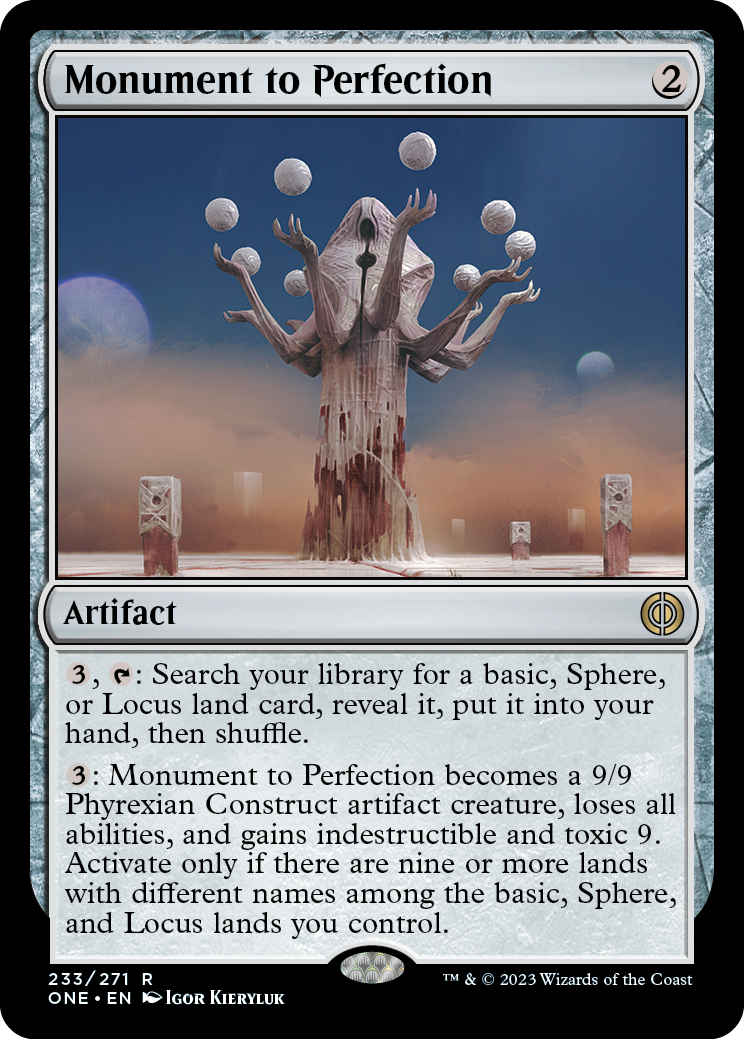
{2}
Artifact
{3}, {T}: Search your library for a basic, Sphere, or Locus land card, reveal it, put it into your hand, then shuffle.
{3}: Monument to Perfection becomes a 9/9 Phyrexian Construct artifact creature, loses all abilities, and gains indestructible and toxic 9. Activate only if there are nine or more lands with different names among the basic, Sphere, and Locus lands you control.
- Monument to Perfection's last ability lasts indefinitely.
- Because the last ability causes Monument to Perfection to lose all the abilities, activating it multiple times before the first activation resolves does not result in it having multiple instances of toxic 9.
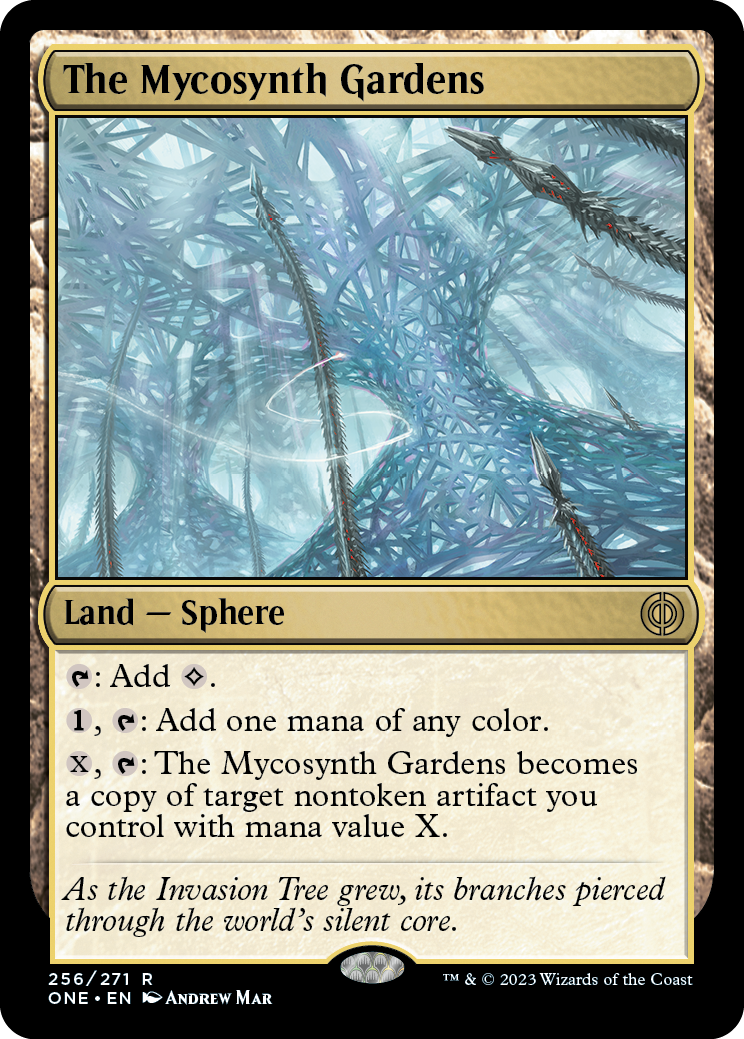
Land — Sphere
{T}: Add {C}.
{1}, {T}: Add one mana of any color.
{X}, {T}: The Mycosynth Gardens becomes a copy of target nontoken artifact you control with mana value X.
- The Mycosynth Gardens copies exactly what was printed on the original artifact and nothing else (unless that permanent is copying something else; see below). It doesn't copy whether that artifact is tapped or untapped, whether it has any counters on it or Auras and Equipment attached to it, and so on.
- If the copied artifact has {X} in its mana cost, X is 0.
- If the copied artifact is copying something else, then The Mycosynth Gardens becomes a copy of whatever that artifact copied.
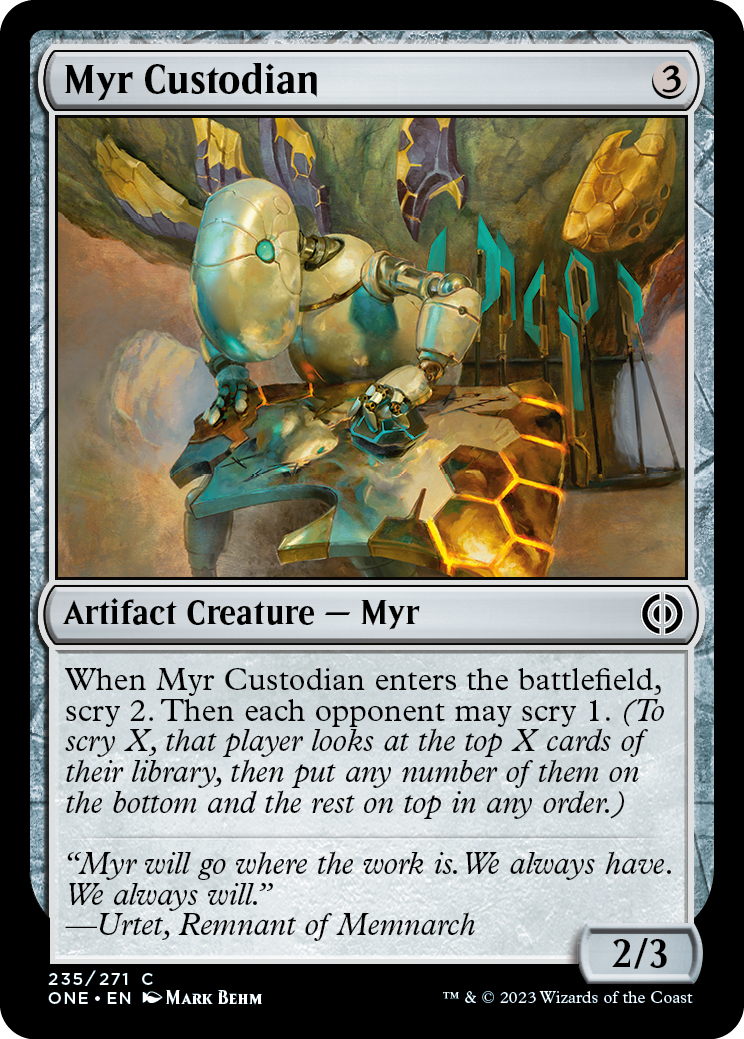
{3}
Artifact Creature — Myr
2/3
When Myr Custodian enters the battlefield, scry 2. Then each opponent may scry 1. (To scry X, that player looks at the top X cards of their library, then put any number of them on the bottom and the rest on top in any order.)
- As the enters-the battlefield ability resolves, first you scry 2. Then each opponent in turn order chooses whether or not to scry 1. Those who do (likely all of them) look at the top card of their library at the same time, then they decide in turn order where their card goes. Each opponent will know the choices of previous players in turn order before making their own choices.
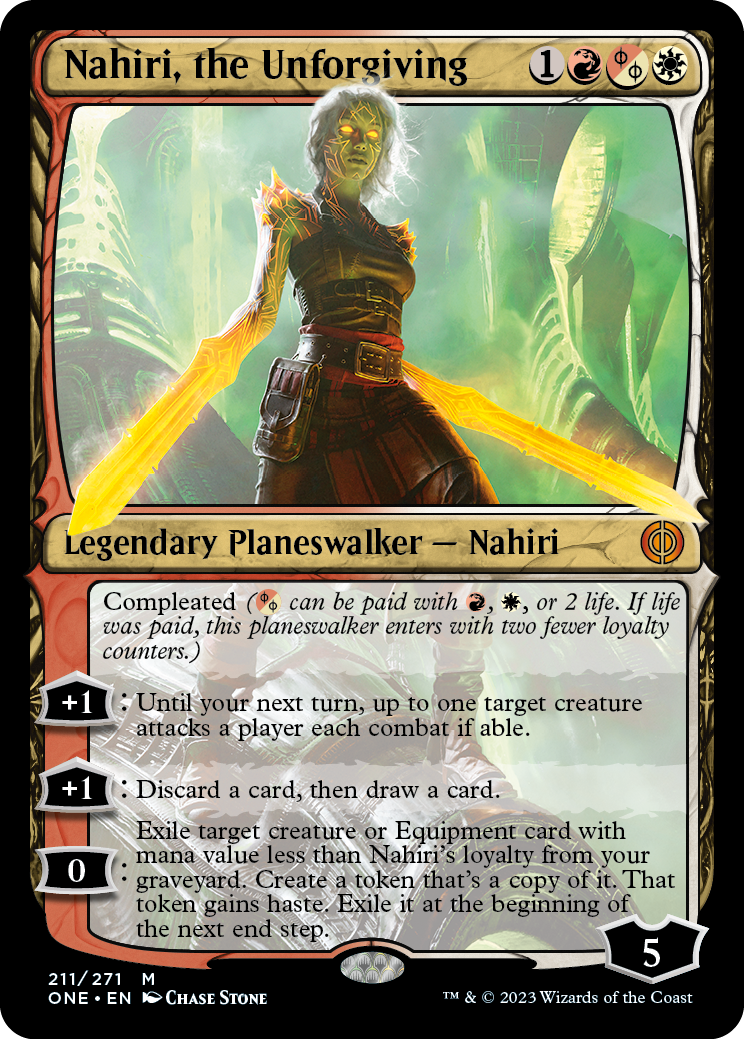
{1}{R}{R/W/P}{W}
Legendary Planeswalker — Nahiri
5
Compleated ({R/W/P} can be paid with {R}, {W}, or 2 life. If life was paid, this planeswalker enters with two fewer loyalty counters.)
+1: Until your next turn, up to one target creature attacks a player each combat if able.
+1: Discard a card, then draw a card.
0: Exile target creature or Equipment card with mana value less than Nahiri's loyalty from your graveyard. Create a token that's a copy of it. That token gains haste. Exile it at the beginning of the next end step.
- If the creature targeted by the first loyalty ability can't attack for any reason (such as being tapped), then it doesn't attack. If there's a cost associated with having it attack, its controller isn't forced to pay that cost. If they don't, it doesn't have to attack in that case either.
- The last loyalty ability will check Nahiri's loyalty as the ability tries to resolve to see if the target is still legal. If it's not, the ability won't resolve and none of its effects will happen. The card won't be exiled and no token will be created.
- A hybrid Phyrexian mana symbol contributes 1 toward the mana value of a card, even if life is paid for it. Specifically, Nahiri's mana value is always 4.
- The compleated ability looks only at whether a player chose to pay 2 life for a Phyrexian mana symbol as they were casting the spell. If a player paid life for some other reason while casting the spell, that will not reduce the number of loyalty counters the planeswalker enters the battlefield with.
- Other replacement effects that would change the number of loyalty counters Nahiri enters with will apply as normal.
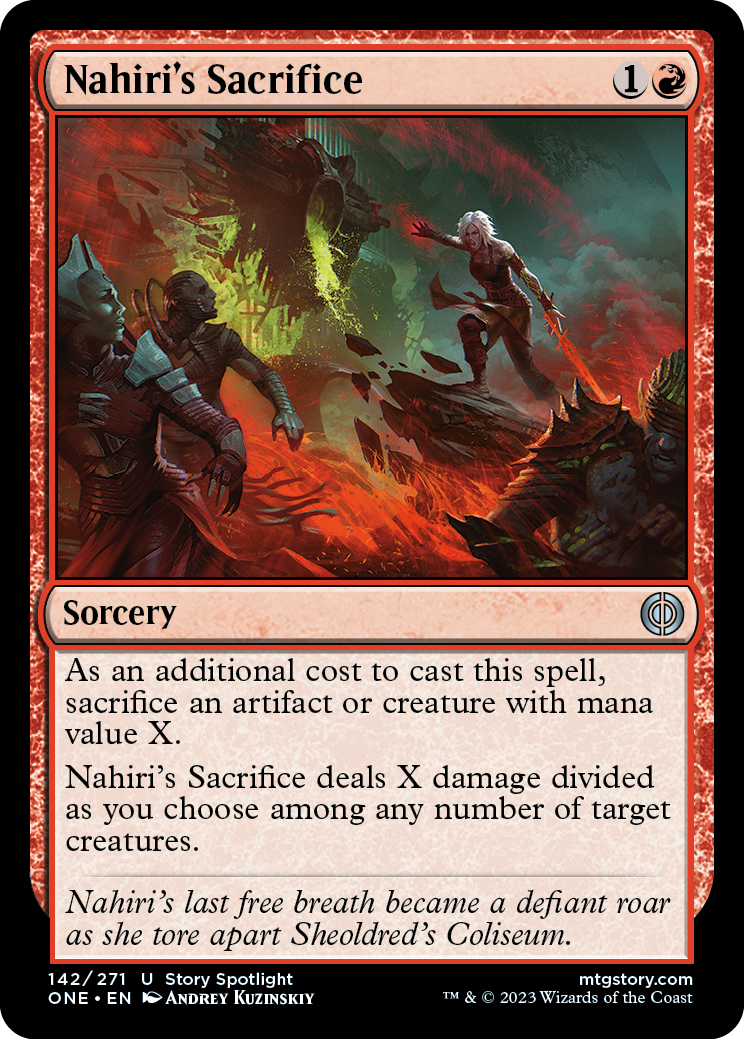
{1}{R}
Sorcery
As an additional cost to cast this spell, sacrifice an artifact or creature with mana value X.
Nahiri's Sacrifice deals X damage divided as you choose among any number of target creatures.
- You choose the value of X, the targets, and how damage will be divided as you cast Nahiri's Sacrifice.
- You can't choose more than X targets, and each chosen target must receive at least 1 damage.
- If some of the targets of the last ability become illegal, the original division of damage still applies, but the damage that would have been dealt to illegal targets isn't dealt at all.
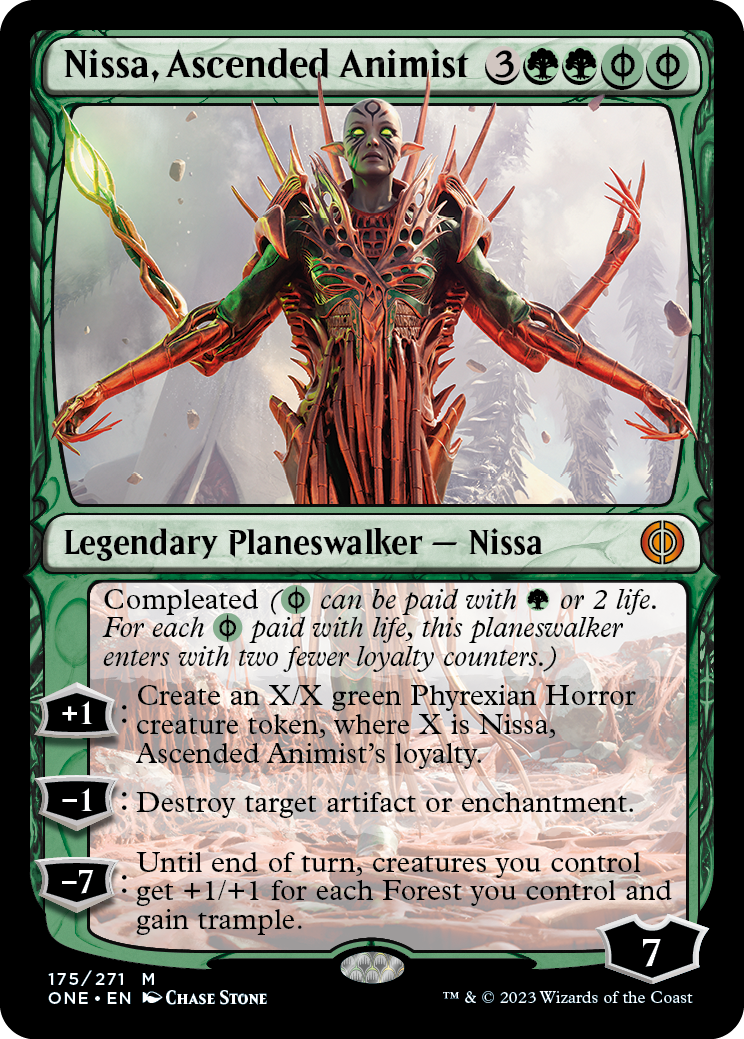
{3}{G}{G}{G/P}{G/P}
Legendary Planeswalker — Nissa
7
Compleated ({G/P} can be paid with {G} or 2 life. For each {G/P} paid with life, this planeswalker enters with two fewer loyalty counters.)
+1: Create an X/X green Phyrexian Horror creature token, where X is Nissa, Ascended Animist's loyalty.
−1: Destroy target artifact or enchantment.
−7: Until end of turn, creatures you control get +1/+1 for each Forest you control and gain trample.
- The token created by Nissa's first ability has its power and toughness set only once, at the time the ability resolves. It doesn't change later as loyalty counters are added to or removed from Nissa.
- If Nissa is no longer on the battlefield at the time her first ability resolves, use the number of loyalty counters she had when she last existed on the battlefield to determine the value of X.
- The power and toughness bonus granted to creatures by Nissa's last ability is determined only once, as that ability resolves. It won't increase or decrease if the number of Forests you control later changes. Similarly, it applies only to creatures you control at the time it resolves. Creatures that come under your control after it resolves will not have the bonus.
- A Phyrexian mana symbol contributes 1 toward the mana value of a card, even if life is paid for it. Specifically, Nissa's mana value is always 7.
- The compleated ability looks only at whether a player chose to pay 2 life for a Phyrexian mana symbol as they were casting the spell. If a player paid life for some other reason while casting the spell, that will not reduce the number of loyalty counters the planeswalker enters the battlefield with.
- Other replacement effects that would change the number of loyalty counters Nissa enters with will apply as normal.
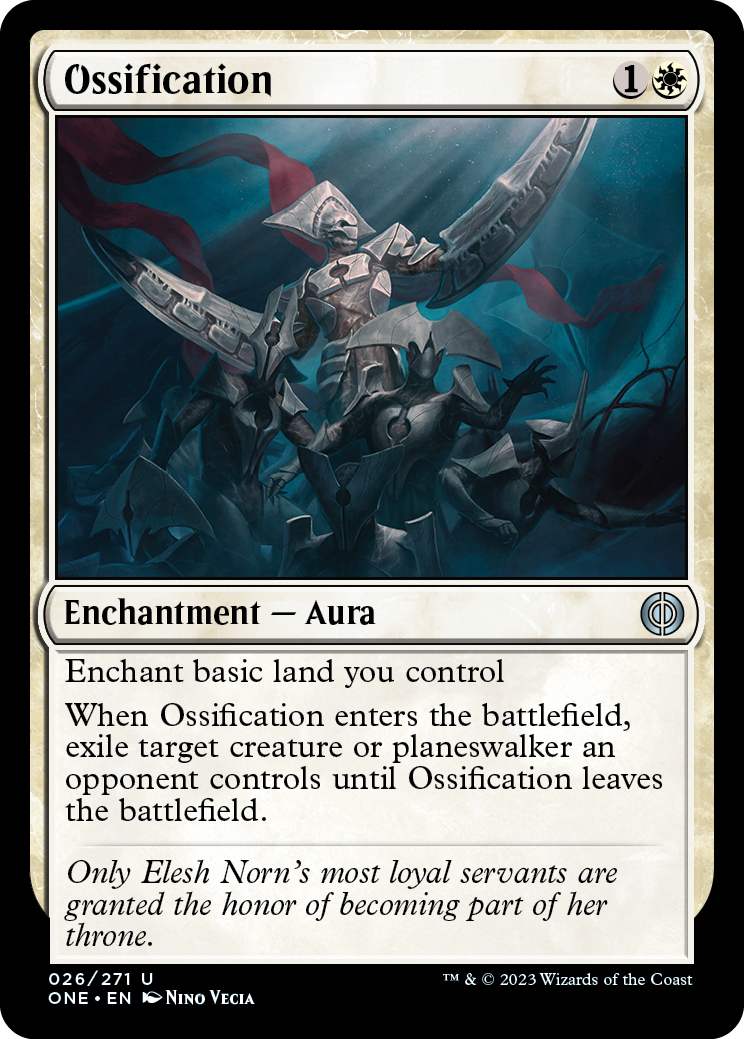
{1}{W}
Enchantment — Aura
Enchant basic land you control
When Ossification enters the battlefield, exile target creature or planeswalker an opponent controls until Ossification leaves the battlefield.
- If Ossification leaves the battlefield before its triggered ability resolves, the target permanent won't be exiled.
- Auras attached to the exiled permanent will be put into their owners' graveyards. Any Equipment will become unattached and remain on the battlefield. Any counters on the exiled permanent will cease to exist. When the card returns to the battlefield, it will be a new object with no connection to the card that was exiled.
- If a token is exiled this way, it will cease to exist and won't return to the battlefield.
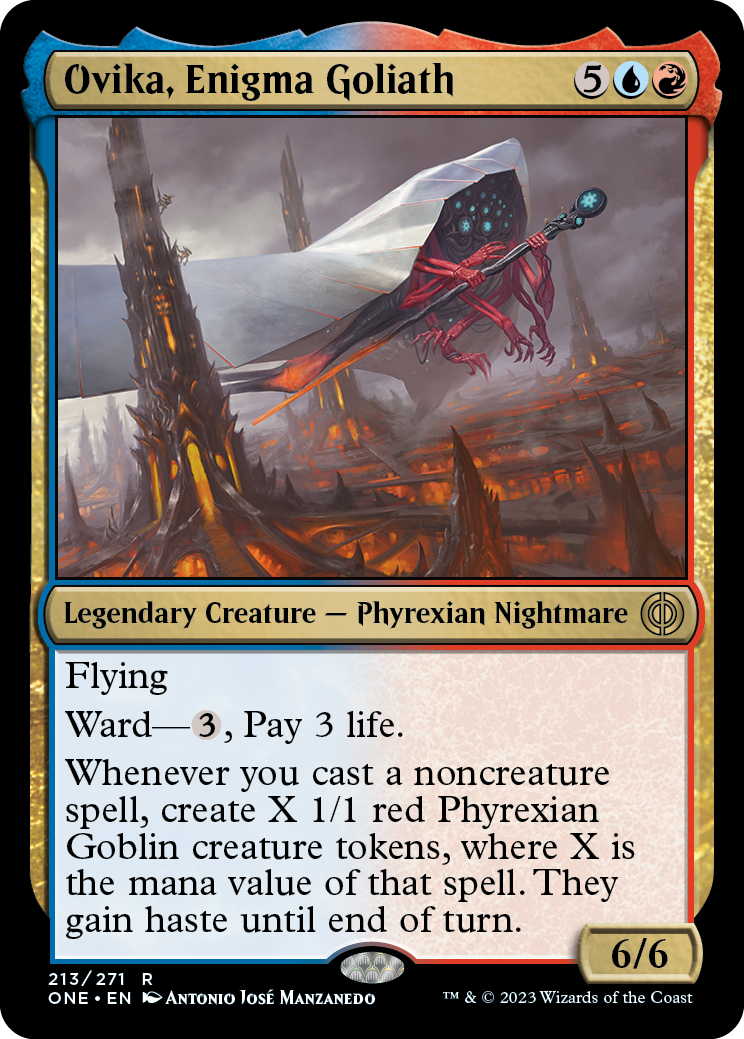
{5}{U}{R}
Legendary Creature — Phyrexian Nightmare
6/6
Flying
Ward—{3}, Pay 3 life.
Whenever you cast a noncreature spell, create X 1/1 red Phyrexian Goblin creature tokens, where X is the mana value of that spell. They gain haste until end of turn.
- While on the stack, the value of X chosen for a spell with an {X} in its mana cost is included when determining the mana value of that spell.
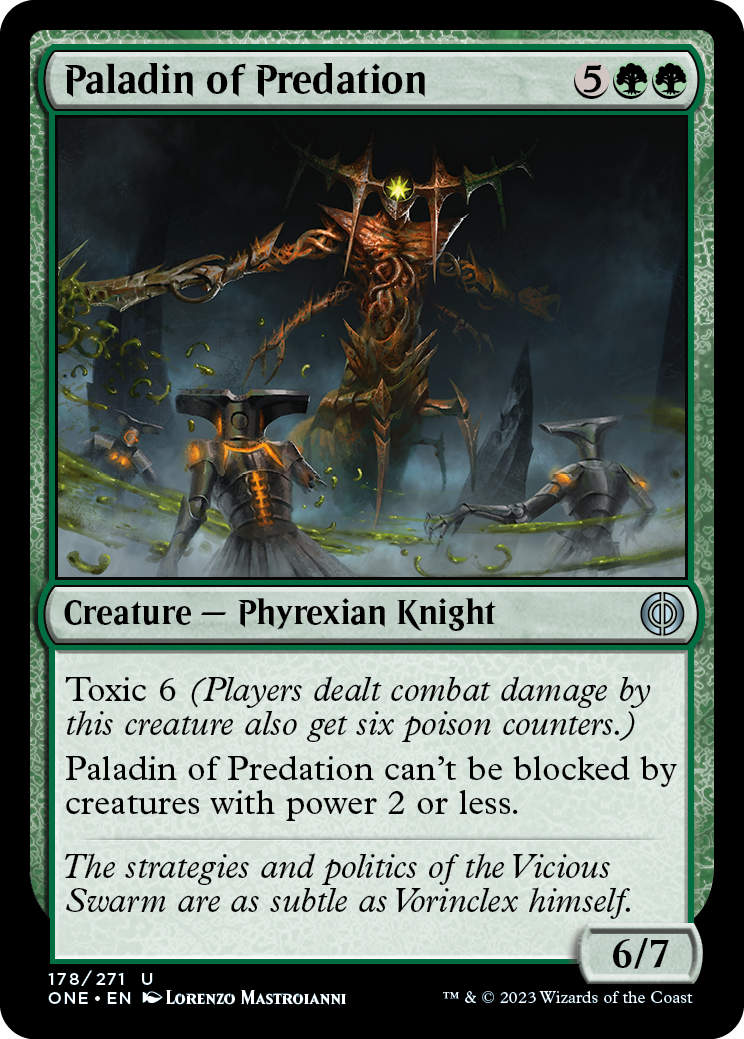
{5}{G}{G}
Creature — Phyrexian Knight
6/7
Toxic 6 (Players dealt combat damage by this creature also get six poison counters.)
Paladin of Predation can't be blocked by creatures with power 2 or less.
- Once it has become blocked, reducing the power of a creature blocking Paladin of Predation to less than 2 won't cause it to become unblocked.
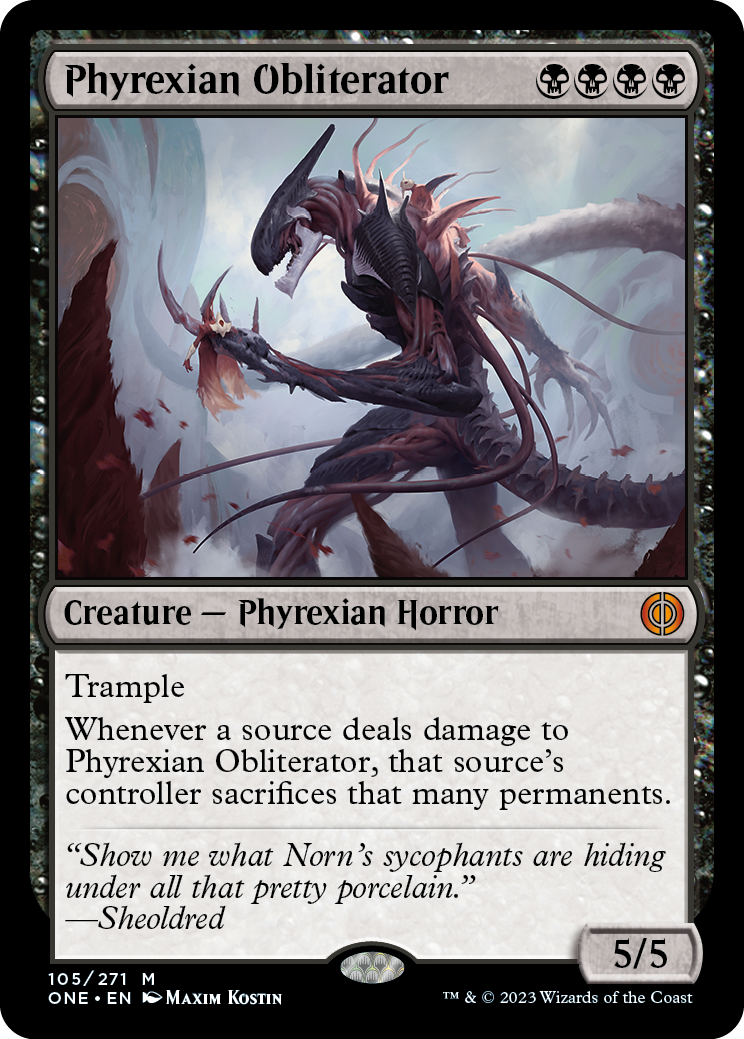
{B}{B}{B}{B}
Creature — Phyrexian Horror
5/5
Trample
Whenever a source deals damage to Phyrexian Obliterator, that source's controller sacrifices that many permanents.
- If creatures an opponent controls are dealt lethal damage at the same time that Phyrexian Obliterator is dealt damage, those creatures will be destroyed before that player chooses permanents to sacrifice.
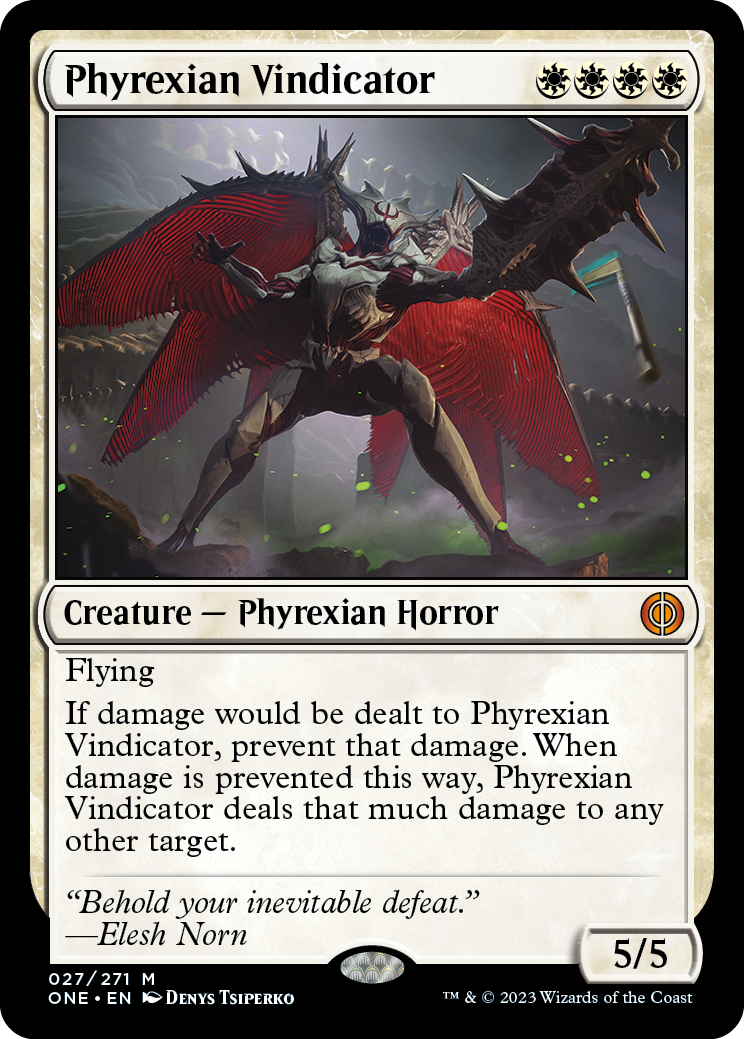
{W}{W}{W}{W}
Creature — Phyrexian Horror
5/5
Flying
If damage would be dealt to Phyrexian Vindicator, prevent that damage. When damage is prevented this way, Phyrexian Vindicator deals that much damage to any other target.
- If multiple replacement or prevention effects try to modify damage that would be dealt to a creature, the controller of the creature chooses the order in which they apply.
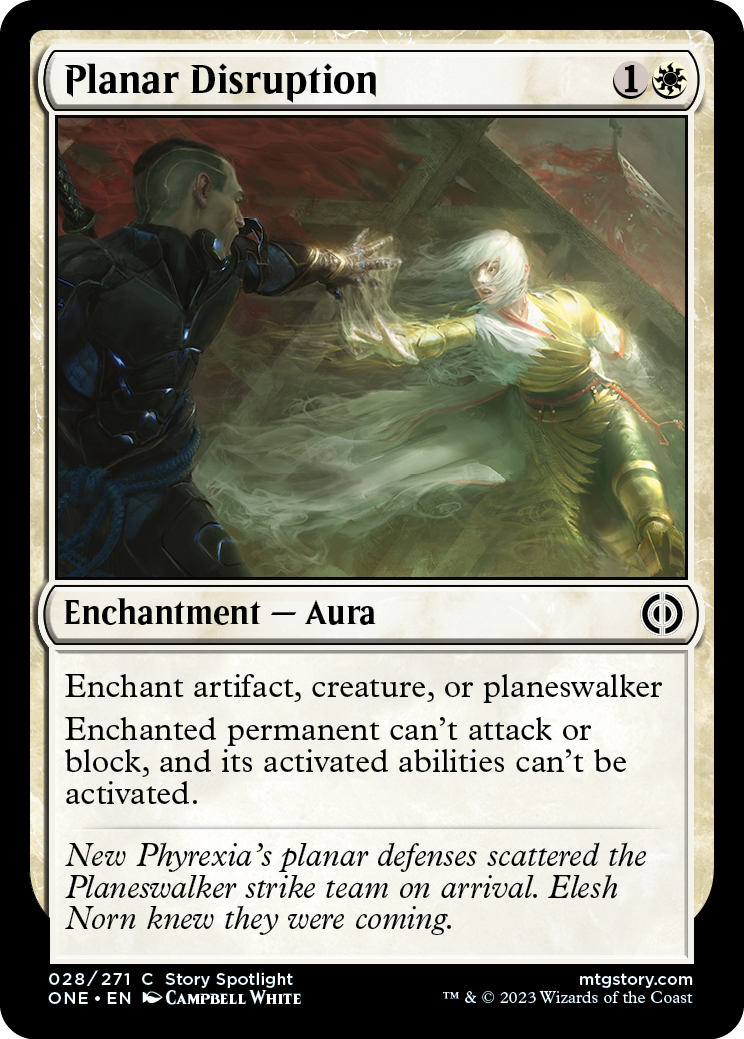
{1}{W}
Enchantment — Aura
Enchant artifact, creature, or planeswalker
Enchanted permanent can't attack or block, and its activated abilities can't be activated.
- Activated abilities contain a colon. They're generally written "[Cost]: [Effect]." Some keywords are activated abilities and will have colons in their reminder text. Notably, loyalty abilities of planeswalkers are activated abilities.
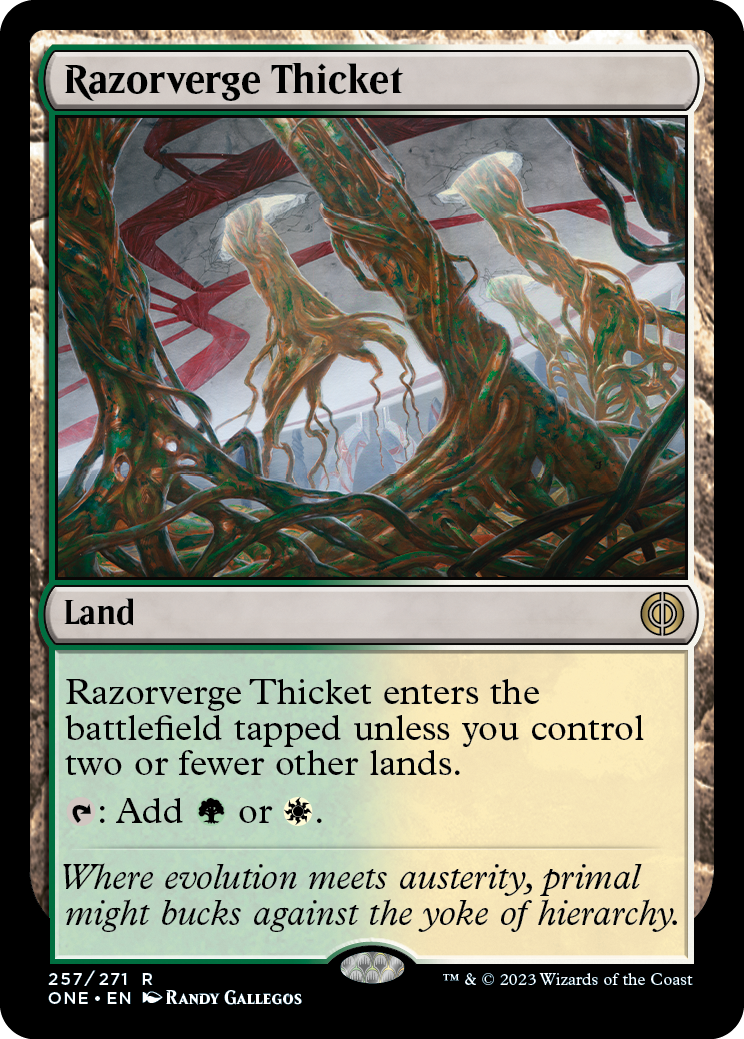
Land
Razorverge Thicket enters the battlefield tapped unless you control two or fewer other lands.
{T}: Add {G} or {W}.
- If one of these lands enters the battlefield under your control and you control zero, one, or two other lands, it enters the battlefield untapped. If you control three or more other lands, however, it enters the battlefield tapped.
- If one of these lands enters the battlefield at the same time as one or more other lands (due to Oblivion Sower or Warp World, perhaps), it doesn't take those lands into consideration when determining how many other lands you control.
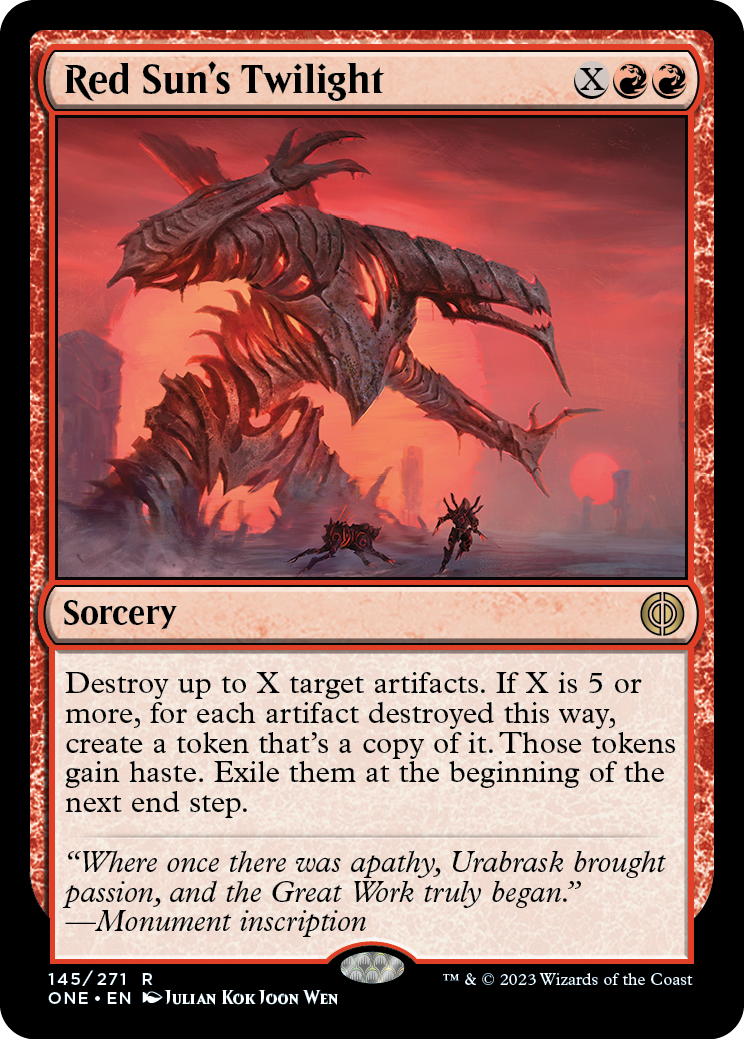
{X}{R}{R}
Sorcery
Destroy up to X target artifacts. If X is 5 or more, for each artifact destroyed this way, create a token that's a copy of it. Those tokens gain haste. Exile them at the beginning of the next end step.
- If X is 5 or more and any of the target artifacts become illegal, you create a token only for each of the artifacts that is still a legal target.
- Each token copies exactly what was printed on the original artifact and nothing else (unless that artifact is copying something else or is a token; see below). It doesn't copy whether that artifact is tapped or untapped, whether it has any counters on it or Auras and Equipment attached to it, or any non-copy effects that have changed its power, toughness, types, color, or so on.
- Each token gains haste after it has been created. If something copies one of these tokens, the copy won't have haste, and you won't exile it at the beginning of the next end step.
- If the copied artifact has {X} in its mana cost, X is 0.
- If the copied artifact is a token, the token that's created copies the original characteristics of that token as stated by the effect that created the token.
- If the copied artifact is copying something else, then the token enters the battlefield as whatever that artifact copied.
- Any enters-the-battlefield abilities of the copied artifact will trigger when the token enters the battlefield. Any "as [this artifact] enters the battlefield" or "[this artifact] enters the battlefield with" abilities of the artifact will also work.
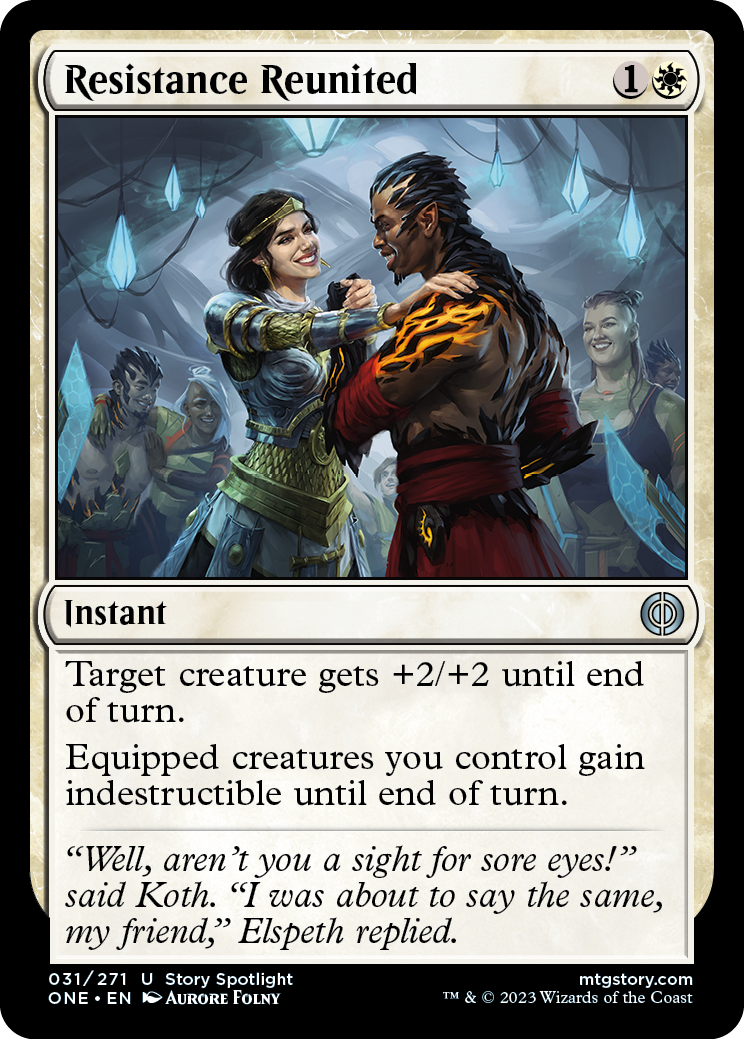
{1}{W}
Instant
Target creature gets +2/+2 until end of turn.
Equipped creatures you control gain indestructible until end of turn.
- The set of creatures that gains indestructible is determined as Resistance Reunited resolves. After that point, an equipped creature that gained indestructible won't lose indestructible if it becomes unequipped. Similarly, one that didn't gain indestructible won't gain it should it become equipped.
- If the target creature is no longer a legal target as Resistance Reunited tries to resolve, it won't resolve and no creatures will gain indestructible.
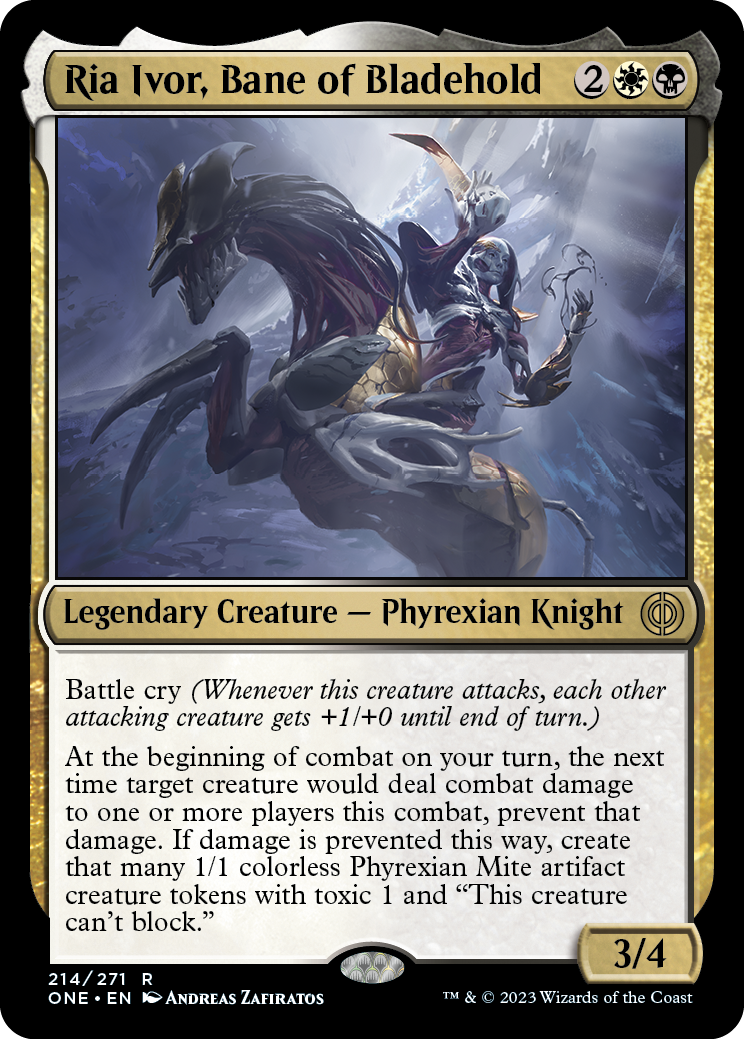
{2}{W}{B}
Legendary Creature — Phyrexian Knight
3/4
Battle cry (Whenever this creature attacks, each other attacking creature gets +1/+0 until end of turn.)
At the beginning of combat on your turn, the next time target creature would deal combat damage to one or more players this combat, prevent that damage. If damage is prevented this way, create that many 1/1 colorless Phyrexian Mite artifact creature tokens with toxic 1 and "This creature can't block."
- If multiple replacement or prevention effects try to modify damage that would be dealt to a player, the player being dealt damage chooses the order in which they apply.
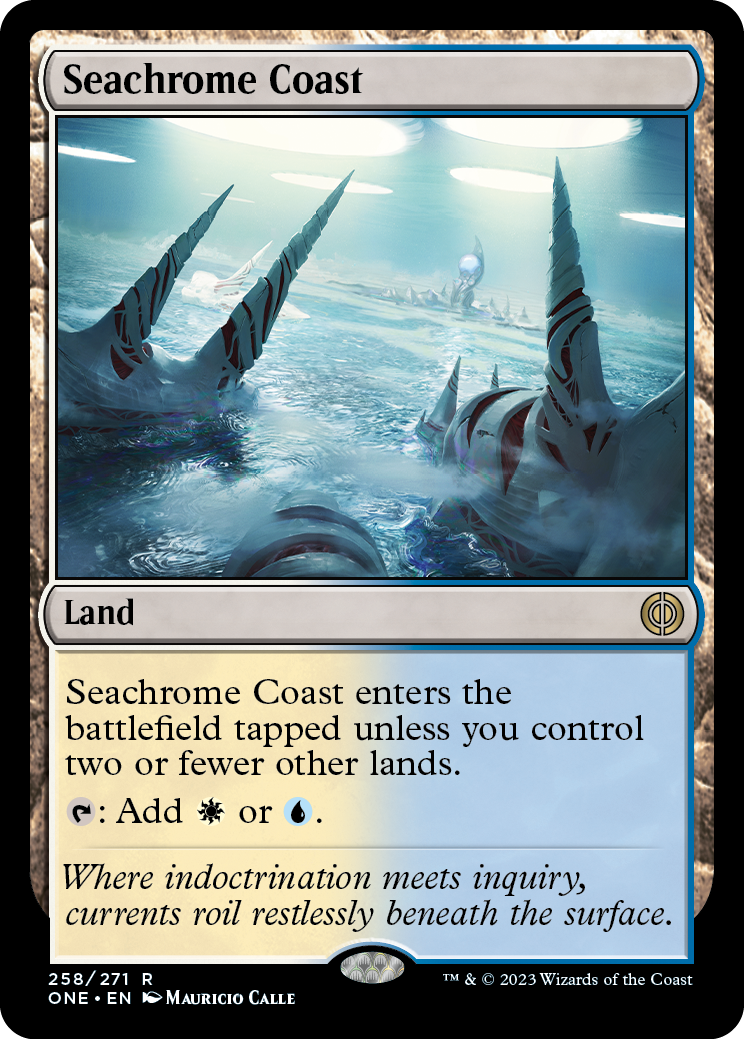
Land
Seachrome Coast enters the battlefield tapped unless you control two or fewer other lands.
{T}: Add {W} or {U}.
- If one of these lands enters the battlefield under your control and you control zero, one, or two other lands, it enters the battlefield untapped. If you control three or more other lands, however, it enters the battlefield tapped.
- If one of these lands enters the battlefield at the same time as one or more other lands (due to Oblivion Sower or Warp World, perhaps), it doesn't take those lands into consideration when determining how many other lands you control.
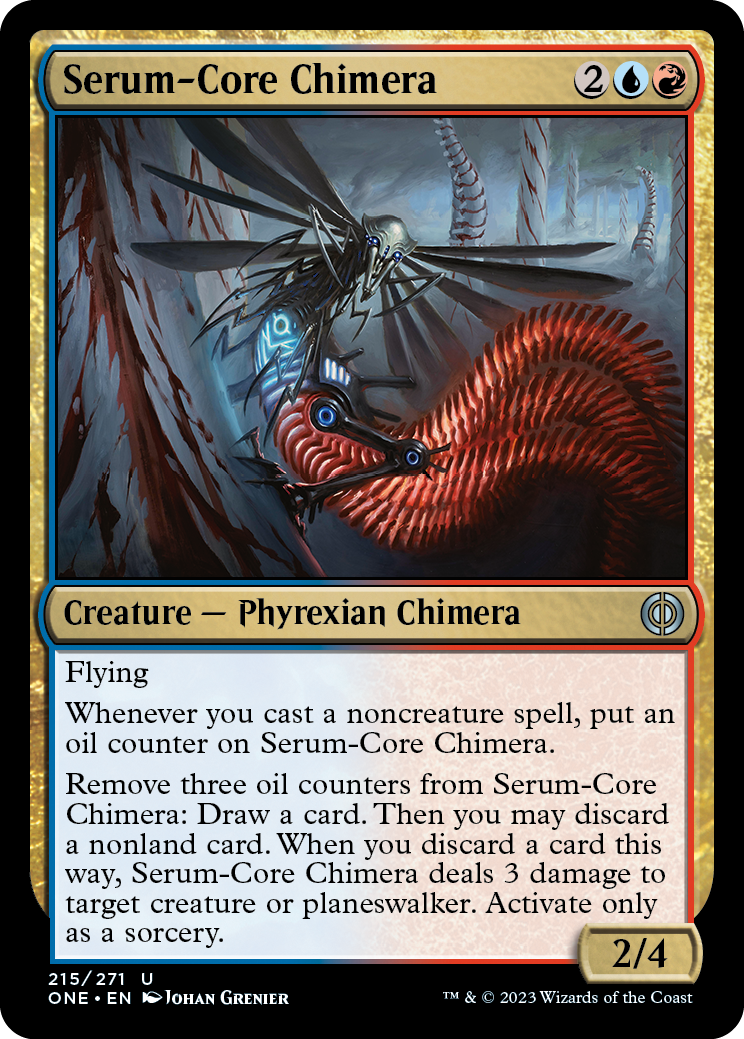
{2}{U}{R}
Creature — Phyrexian Chimera
2/4
Flying
Whenever you cast a noncreature spell, put an oil counter on Serum-Core Chimera.
Remove three oil counters from Serum-Core Chimera: Draw a card. Then you may discard a nonland card. When you discard a card this way, Serum-Core Chimera deals 3 damage to target creature or planeswalker. Activate only as a sorcery.
- You don't choose a target for Serum-Core Chimera's last ability at the time you activate it. Rather, a second "reflexive" ability triggers when you discard a card this way. You choose a target for that ability as it goes on the stack. Each player may respond to this triggered ability as normal.
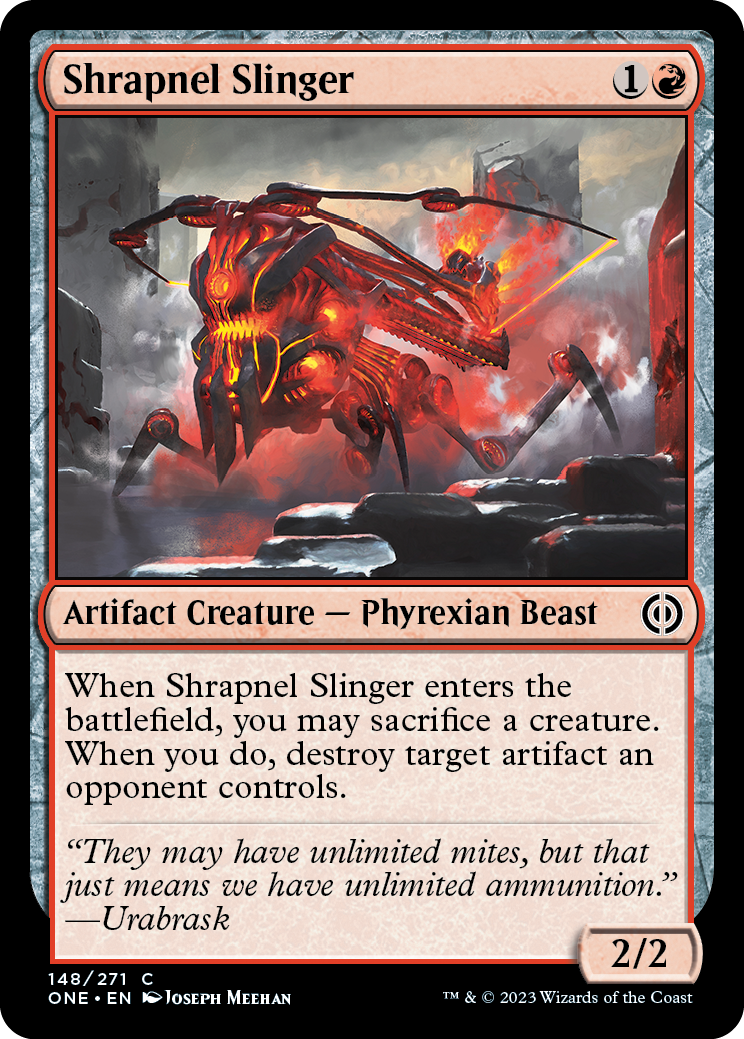
{1}{R}
Artifact Creature — Phyrexian Beast
2/2
When Shrapnel Slinger enters the battlefield, you may sacrifice a creature. When you do, destroy target artifact an opponent controls.
- You don't choose a target for Shrapnel Slinger last ability at the time it triggers. Rather, a second "reflexive" ability triggers when you sacrifice a creature this way. You choose a target for that ability as it goes on the stack. Each player may respond to this triggered ability as normal.
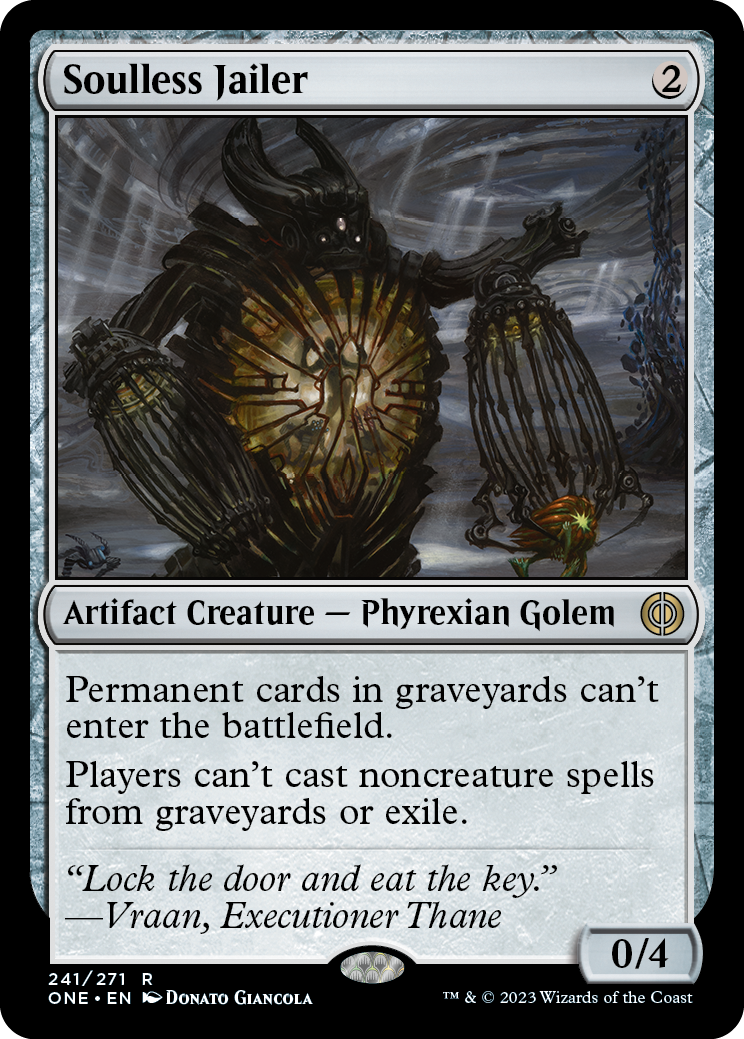
{2}
Artifact Creature — Phyrexian Golem
0/4
Permanent cards in graveyards can't enter the battlefield.
Players can't cast noncreature spells from graveyards or exile.
- Players may still cast creature spells from graveyards and from exile if an effect allows them to do so.
- Putting a permanent card onto the battlefield from a graveyard is an impossible action while Soulless Jailer is on the battlefield.
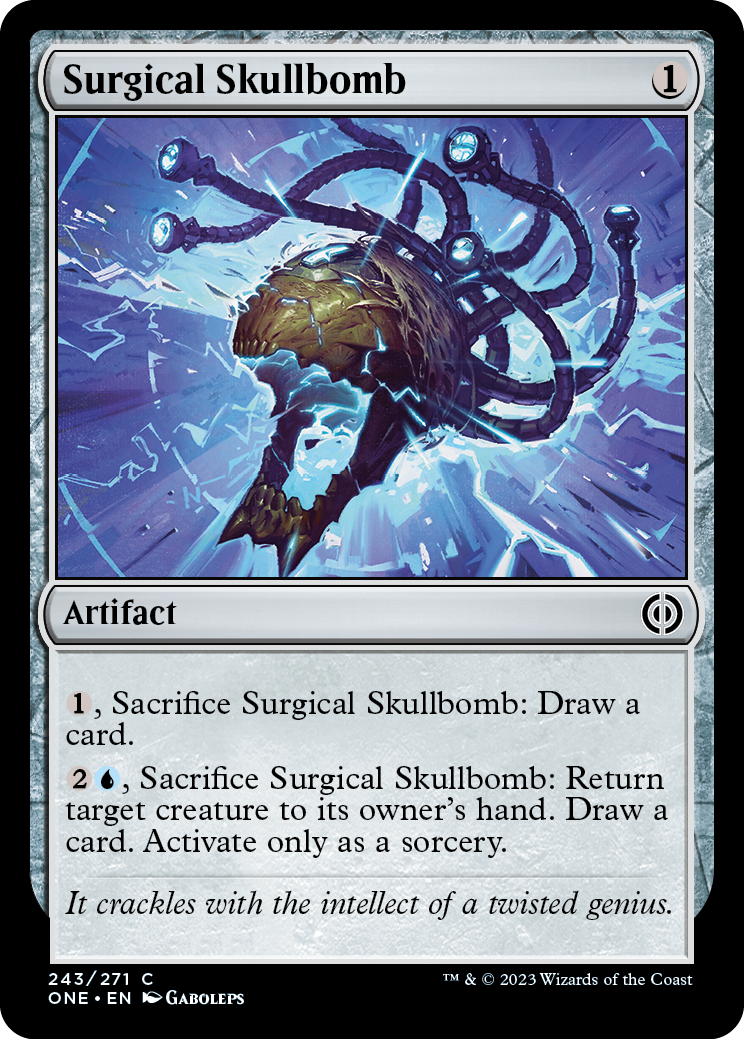
{1}
Artifact
{1}, Sacrifice Surgical Skullbomb: Draw a card.
{2}{U}, Sacrifice Surgical Skullbomb: Return target creature to its owner's hand. Draw a card. Activate only as a sorcery.
- If the target of Surgical Skullbomb's last ability isn't a legal target as the ability tries to resolve (probably because it has left the battlefield), you won't draw a card.
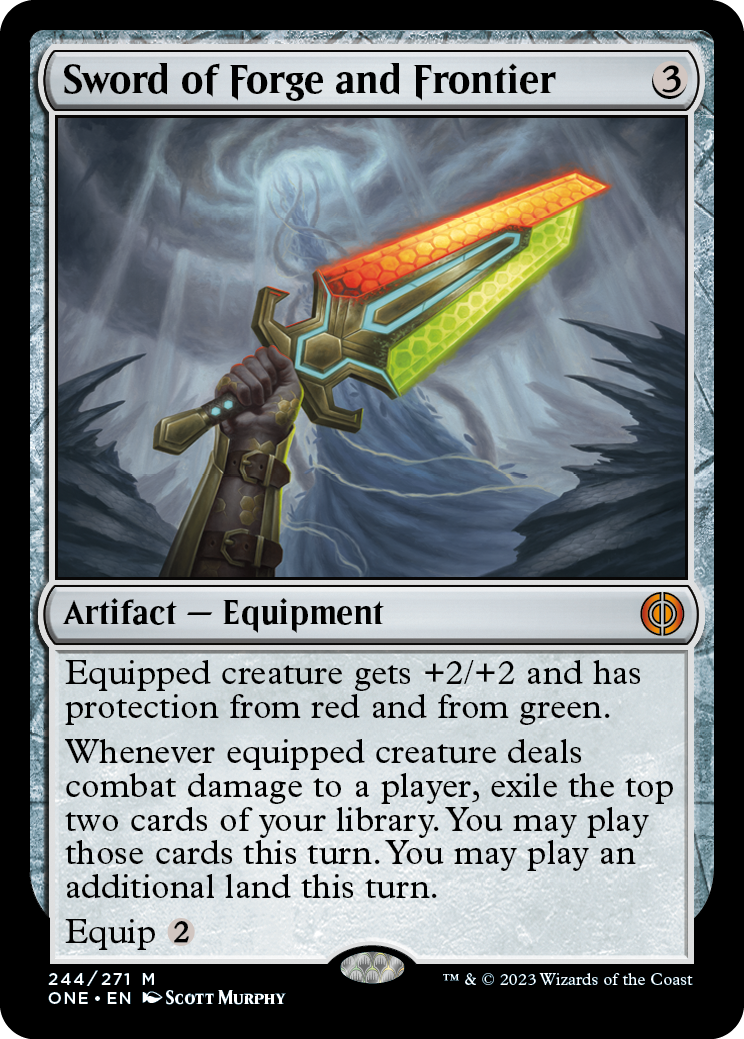
{3}
Artifact — Equipment
Equipped creature gets +2/+2 and has protection from red and from green.
Whenever equipped creature deals combat damage to a player, exile the top two cards of your library. You may play those cards this turn. You may play an additional land this turn.
Equip {2}
- You must follow all normal timing rules for a card you play using Sword of Forge and Frontier's second ability and, if it's a spell, you must pay its costs to cast it.
- The effect that allows you to play an additional land that turn is cumulative with other effects that do so, including itself. If the second ability triggers multiple times in the same turn, perhaps because there were multiple combats, you will be able to play that many additional lands.
- If the equipped creature somehow deals combat damage to a player on an opponent's turn, the second ability will trigger. You'll be able to cast cards you exile if timing rules allow (so, instants, mostly), but you won't be able to play a land that turn.
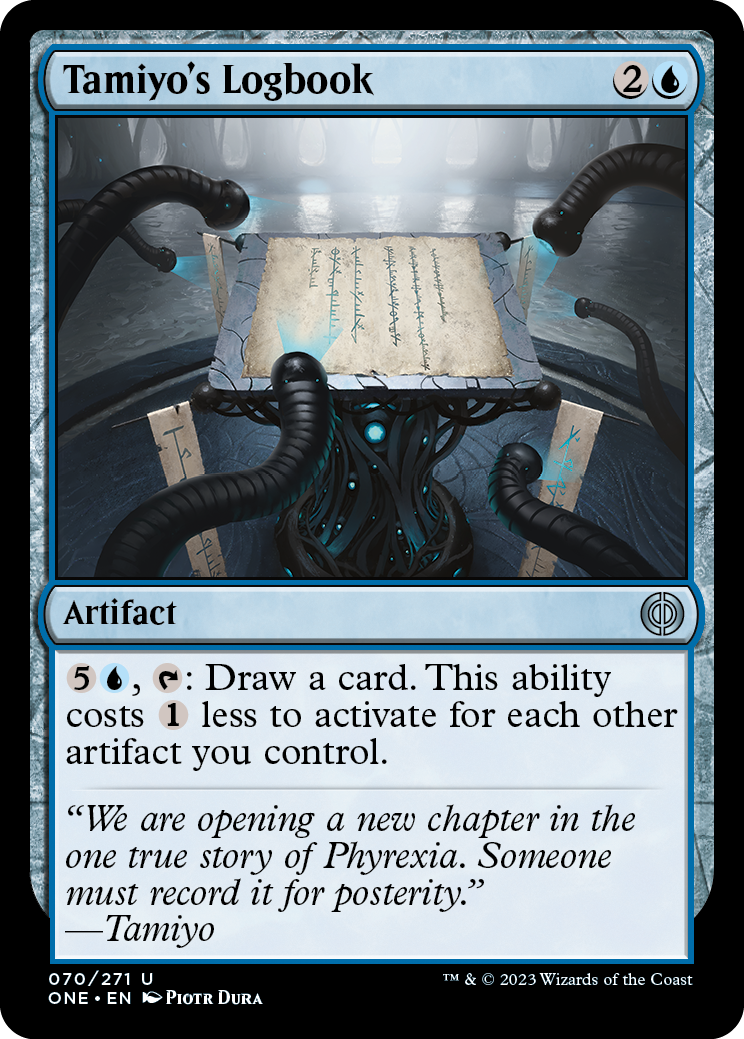
{2}{U}
Artifact
{5}{U}, {T}: Draw a card. This ability costs {1} less to activate for each other artifact you control.
- The cost reduction of the activated ability applies only to the generic mana component of the activation cost. It can't reduce colored mana costs. Even if you have five or more artifacts, it still costs {U} to activate.
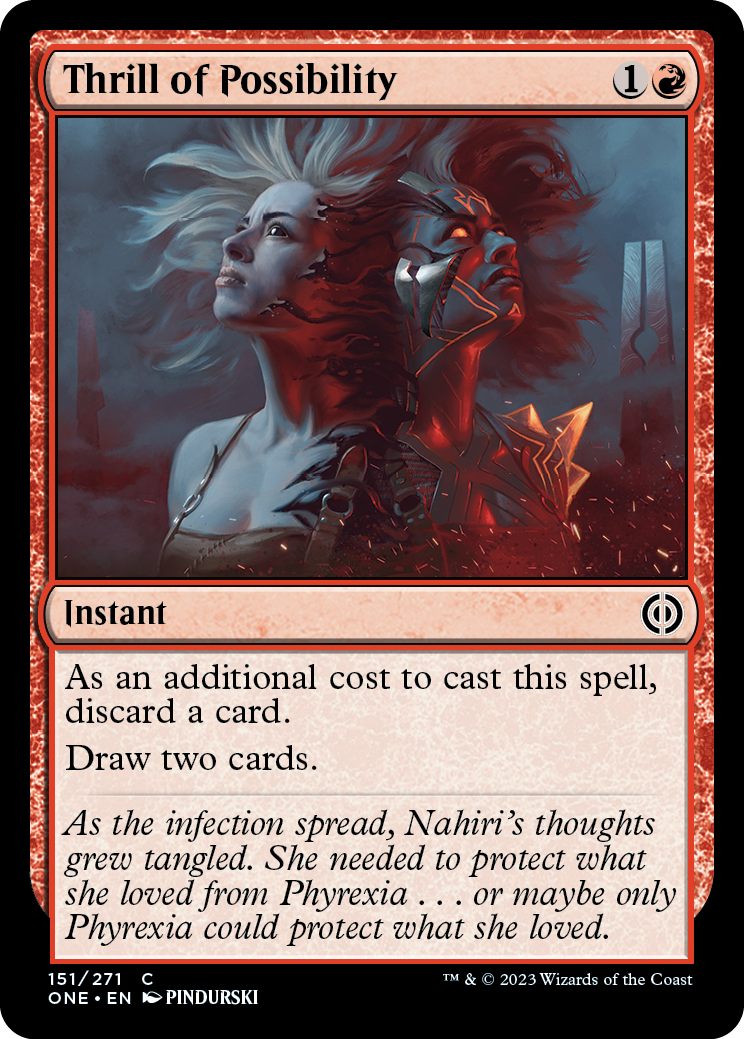
{1}{R}
Instant
As an additional cost to cast this spell, discard a card.
Draw two cards.
- You must discard exactly one card to cast Thrill of Possibility; you can't cast it without discarding a card, and you can't discard additional cards.
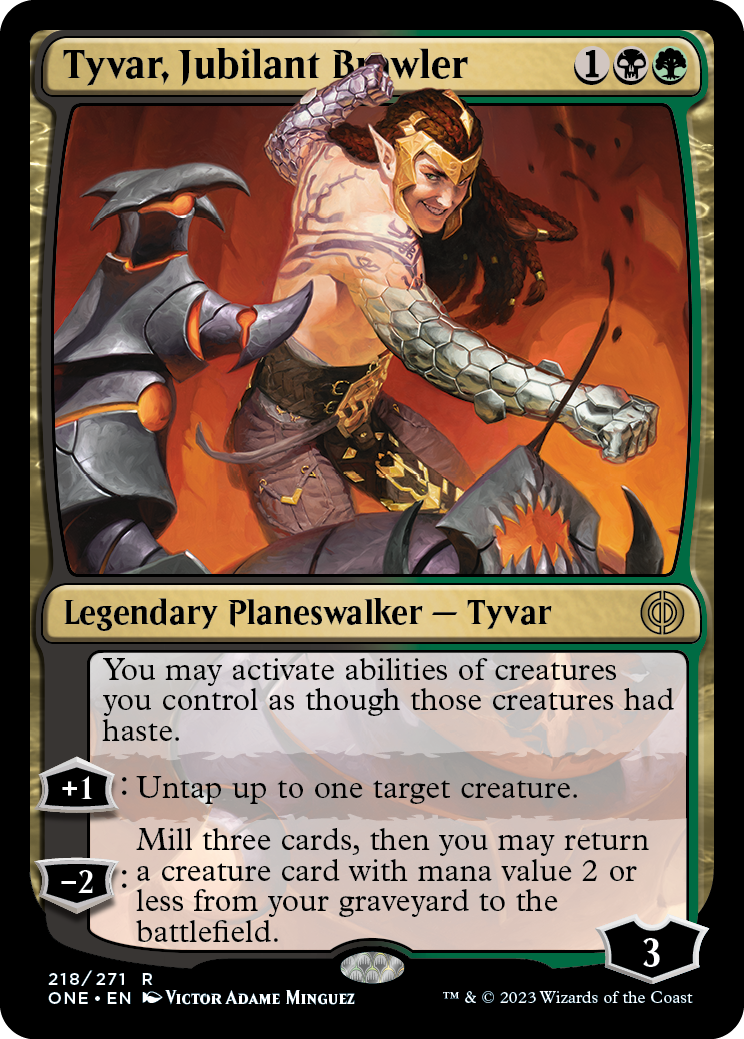
{1}{B}{G}
Legendary Planeswalker — Tyvar
3
You may activate abilities of creatures you control as though those creatures had haste.
+1: Untap up to one target creature.
−2: Mill three cards, then you may return a creature card with mana value 2 or less from your graveyard to the battlefield.
- Tyvar's first ability doesn't grant haste to any creatures, nor does it allow you to attack with creatures as though they had haste. However, you will be able to activate abilities with {T} in their activation costs as soon as creatures with such abilities come under your control.
- Activated abilities contain a colon. They're generally written "[Cost]: [Effect]." Some keywords are activated abilities; they have colons in their reminder text.
- For Tyvar's last ability, you may return any creature card with mana value 2 or less from your graveyard to the battlefield, even if it wasn't one of the three cards milled as the ability resolved.
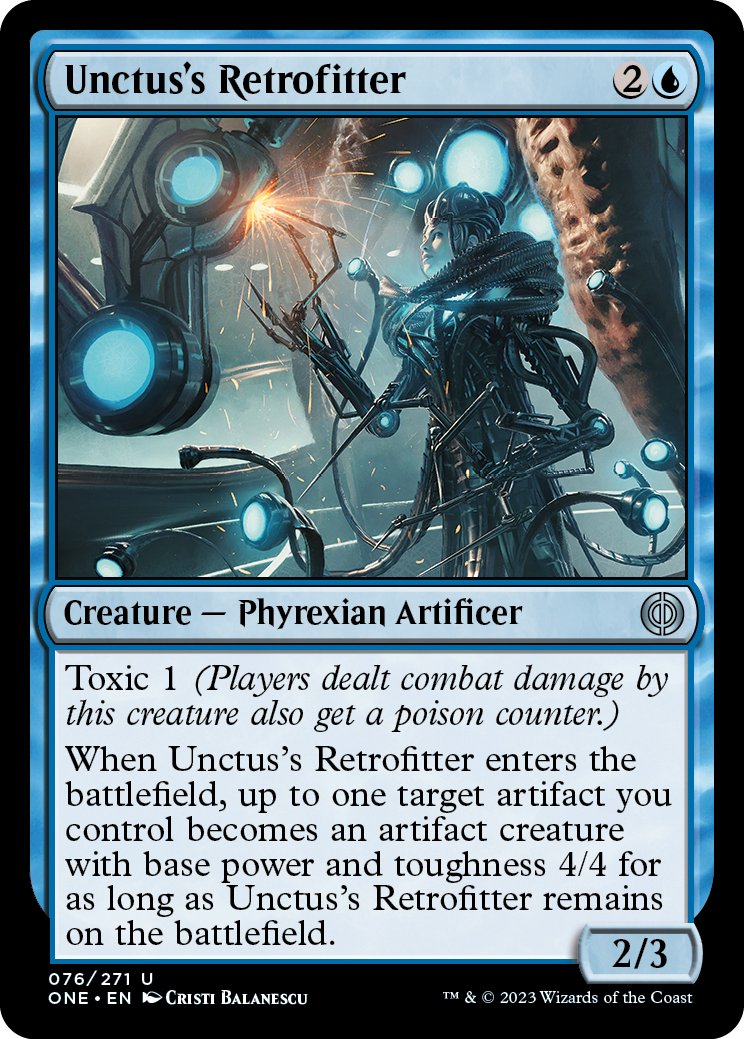
{2}{U}
Creature — Phyrexian Artificer
2/3
Toxic 1 (Players dealt combat damage by this creature also get a poison counter.)
When Unctus's Retrofitter enters the battlefield, up to one target artifact you control becomes an artifact creature with base power and toughness 4/4 for as long as Unctus's Retrofitter remains on the battlefield.
- Unctus's Retrofitter doesn't remove any abilities the target artifact has.
- The target artifact retains any types, subtypes, and supertypes it has.
- If the artifact was already a creature, its base power and toughness will become 4/4. This overwrites any previous effects that set its base power and/or toughness to specific values. Any power- or toughness-setting effects that start to apply after Unctus's Retrofitter's ability resolves will overwrite this effect.
- Effects that modify a creature's power and/or toughness, such as the one created by Blazing Crescendo or a +1/+1 counter, will apply to the creature no matter when they started to take effect.
- The resulting artifact creature will be able to attack on your turn if it's been under your control continuously since the turn began. That is, it doesn't matter how long it's been a creature, just how long it's been on the battlefield.
- If Unctus's Retrofitter leaves the battlefield before its enters-the-battlefield ability resolves, that ability will have no effect. The target artifact won't become an artifact creature at all.
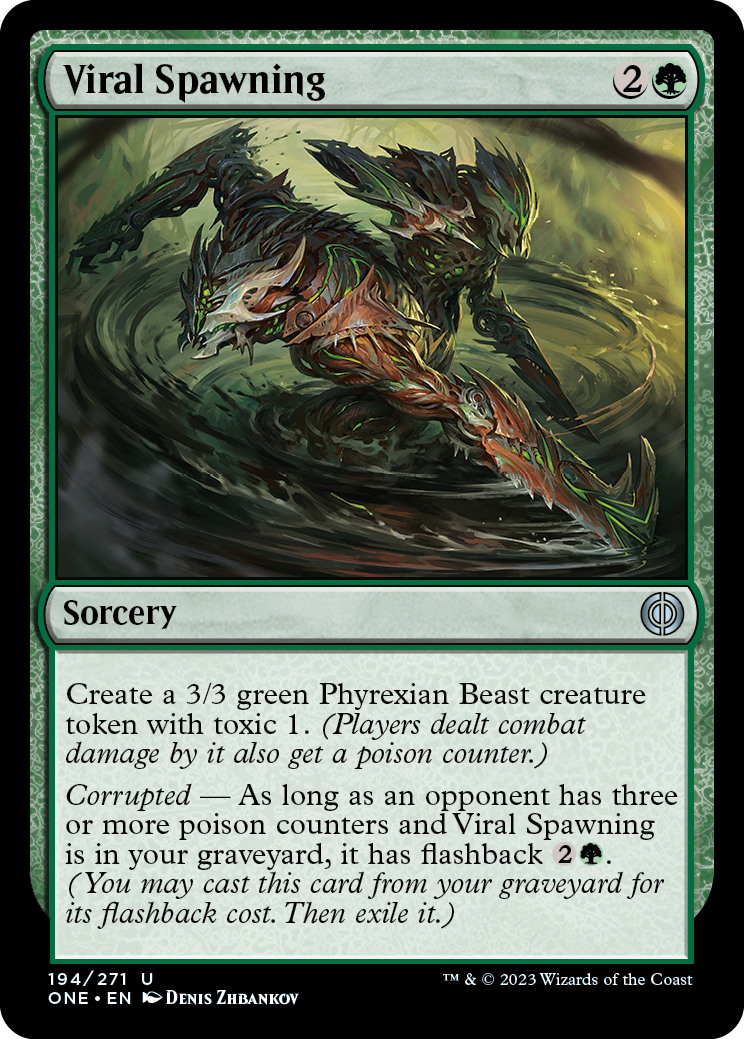
{2}{G}
Sorcery
Create a 3/3 green Phyrexian Beast creature token with toxic 1. (Players dealt combat damage by it also get a poison counter.)
Corrupted — As long as an opponent has three or more poison counters and Viral Spawning is in your graveyard, it has flashback {2}{G}. (You may cast this card from your graveyard for its flashback cost. Then exile it.)
- "Flashback [cost]" means "You may cast this card from your graveyard by paying [cost] rather than paying its mana cost" and "If the flashback cost was paid, exile this card instead of putting it anywhere else any time it would leave the stack."
- You must still follow any timing restrictions and permissions, including those based on the card's type. For instance, you can cast a sorcery using flashback only when you could normally cast a sorcery.
- To determine the total cost of a spell, start with the mana cost or alternative cost (such as a flashback cost) you're paying, add any cost increases, then apply any cost reductions. The mana value of the spell is determined only by its mana cost, no matter what the total cost to cast the spell was.
- A spell cast using flashback will always be exiled afterward, whether it resolves, is countered, or leaves the stack in some other way.
- You can cast a spell using flashback even if it was somehow put into your graveyard without having been cast.
- If a card with flashback is put into your graveyard during your turn, you can cast it if it's legal to do so before any other player can take any actions.
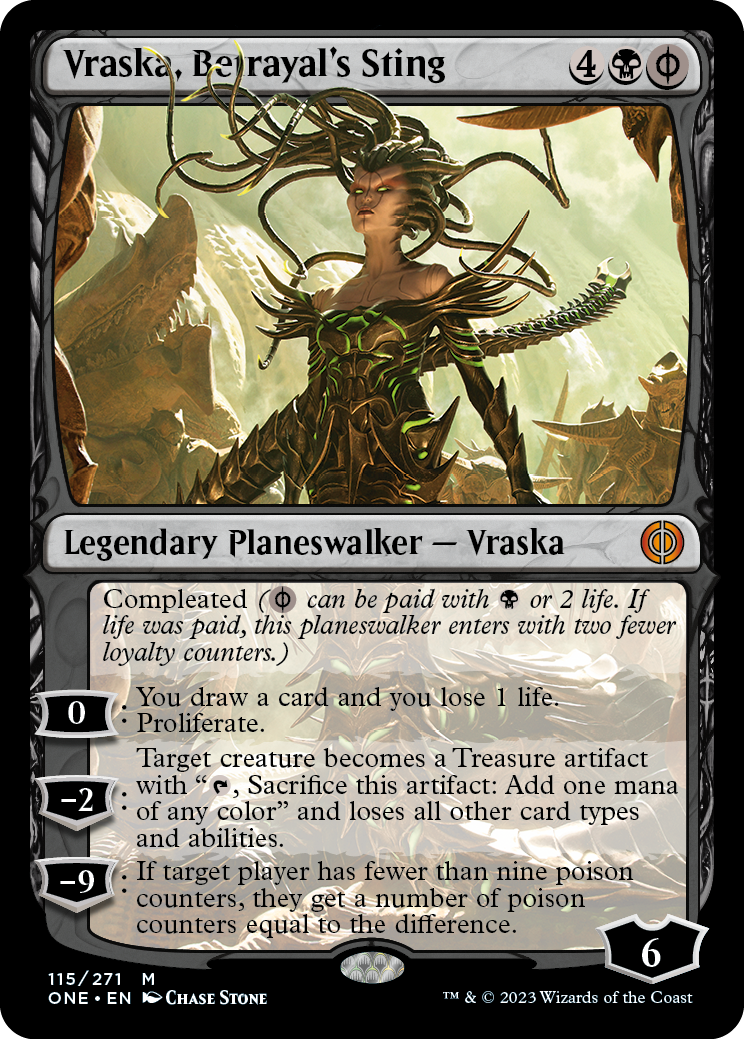
{4}{B}{B/P}
Legendary Planeswalker — Vraska
6
Compleated ({B/P} can be paid with {B} or 2 life. If life was paid, this planeswalker enters with two fewer loyalty counters.)
0: You draw a card and you lose 1 life. Proliferate.
−2: Target creature becomes a Treasure artifact with "{T}, Sacrifice this artifact: Add one mana of any color" and loses all other card types and abilities.
−9: If target player has fewer than nine poison counters, they get a number of poison counters equal to the difference.
- The target of Vraska's second loyalty ability will lose any other subtypes and card types it previously had and will be only a Treasure artifact. It will retain any supertypes it had.
- In most cases, the target of Vraska's last loyalty ability will end up with nine poison counters. However, once you calculate what the difference is, replacement effects can change how many poison counters the player actually gets. For example, if the player controls Melira, the Living Cure, they will end up getting one poison counter if they had eight or fewer to begin with.
- A Phyrexian mana symbol contributes 1 toward the mana value of a card, even if life is paid for it. Specifically, Vraska's mana value is always 6.
- The compleated ability looks only at whether a player chose to pay 2 life for a Phyrexian mana symbol as they were casting the spell. If a player paid life for some other reason while casting the spell, that will not reduce the number of loyalty counters the planeswalker enters the battlefield with.
- Other replacement effects that would change the number of loyalty counters Vraska enters with will apply as normal.
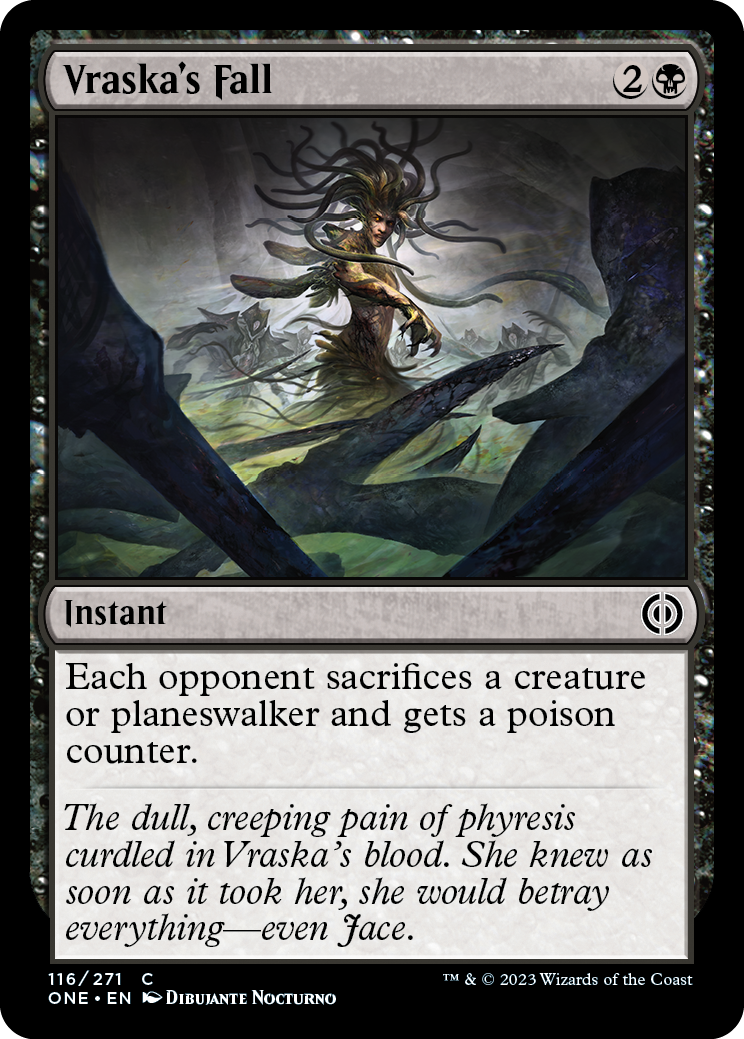
{2}{B}
Instant
Each opponent sacrifices a creature or planeswalker and gets a poison counter.
- Each opponent gets a poison counter even if they can't sacrifice any permanents.
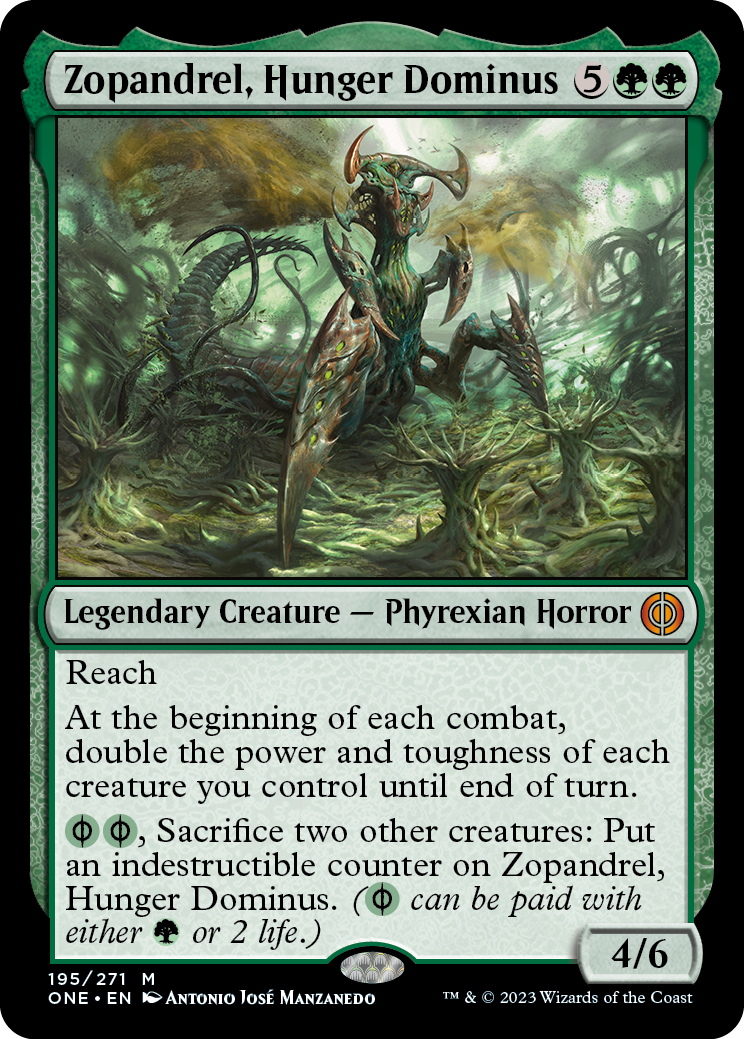
{5}{G}{G}
Legendary Creature — Phyrexian Horror
4/6
Reach
At the beginning of each combat, double the power and toughness of each creature you control until end of turn.
{G/P}{G/P}, Sacrifice two other creatures: Put an indestructible counter on Zopandrel, Hunger Dominus. ({G/P} can be paid with either {G} or 2 life.)
- If an effect instructs you to "double" a creature's power, that creature gets +X/+0, where X is its power as that effect begins to apply. Similarly, a creature whose toughness is doubled gets +0/+X, where X is its toughness as the effect begins to apply.
- If a creature's power is less than 0 when it's doubled, instead that creature gets -X/-0, where X is how much less than 0 its power is. For example, if an effect has given Bear Cub, a 2/2 creature, -4/-0 so that it's a -2/2 creature, doubling its power and toughness gives it -2/+2, and it becomes a -4/4 creature.
- If you somehow control more than one Zopandrel, each one applies independently. For example, if you somehow control two copies of Zopandrel, a 2/2 Bear Cub becomes a 4/4 creature when the first ability resolves and then becomes an 8/8 creature when the second one resolves.
Jumpstart Card-Specific Notes
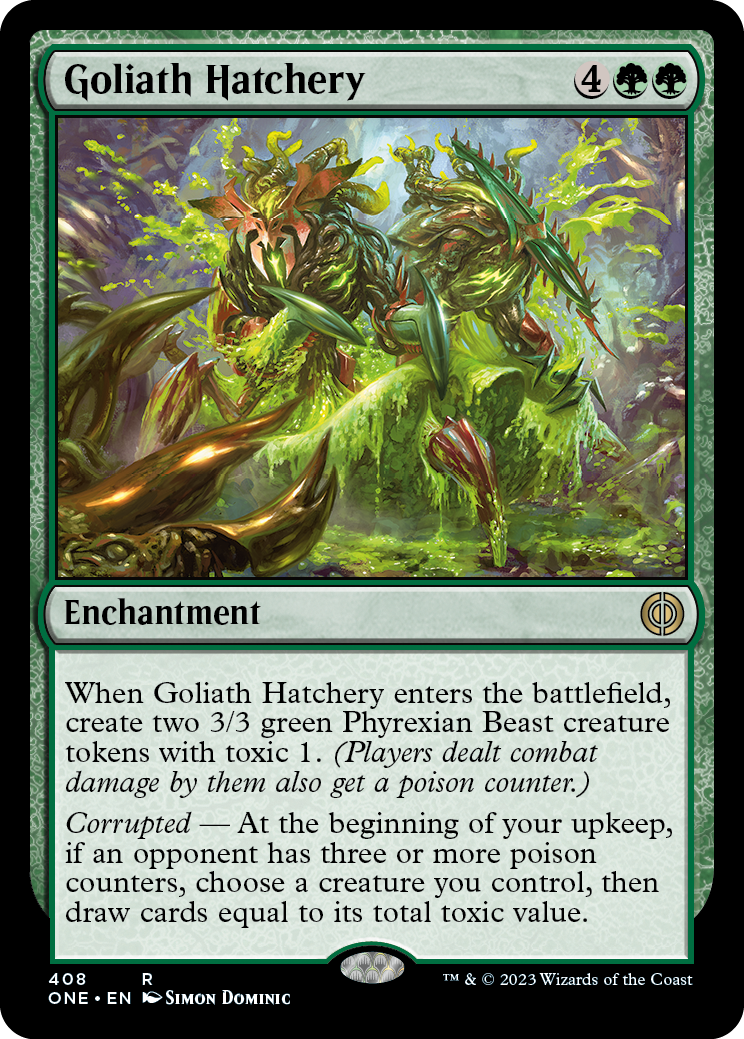
{4}{G}{G}
Enchantment
When Goliath Hatchery enters the battlefield, create two 3/3 green Phyrexian Beast creature tokens with toxic 1. (Players dealt combat damage by them also get a poison counter.)
Corrupted — At the beginning of your upkeep, if an opponent has three or more poison counters, choose a creature you control, then draw cards equal to its total toxic value.
- The "total toxic value" of a creature is usually just the number after the word toxic on that creature. However, if a creature has gained multiple instances of toxic, the total toxic value of that creature is the sum of those numbers. For example, if a creature that has toxic 2 later gains toxic 1 due to an effect, it has both toxic 1 and toxic 2, and its total toxic value is 3.
- The creature isn't chosen until the corrupted ability resolves. Notably, this means you may respond to that ability by giving a creature toxic (or more toxic) in order to draw more cards. (Of course, your opponents can also respond to try and stop you, but interaction is fun.)
- You may choose any creature you control, including one that doesn't have toxic, if you don't want to draw cards. If you don't control any creatures, you won't draw any cards.
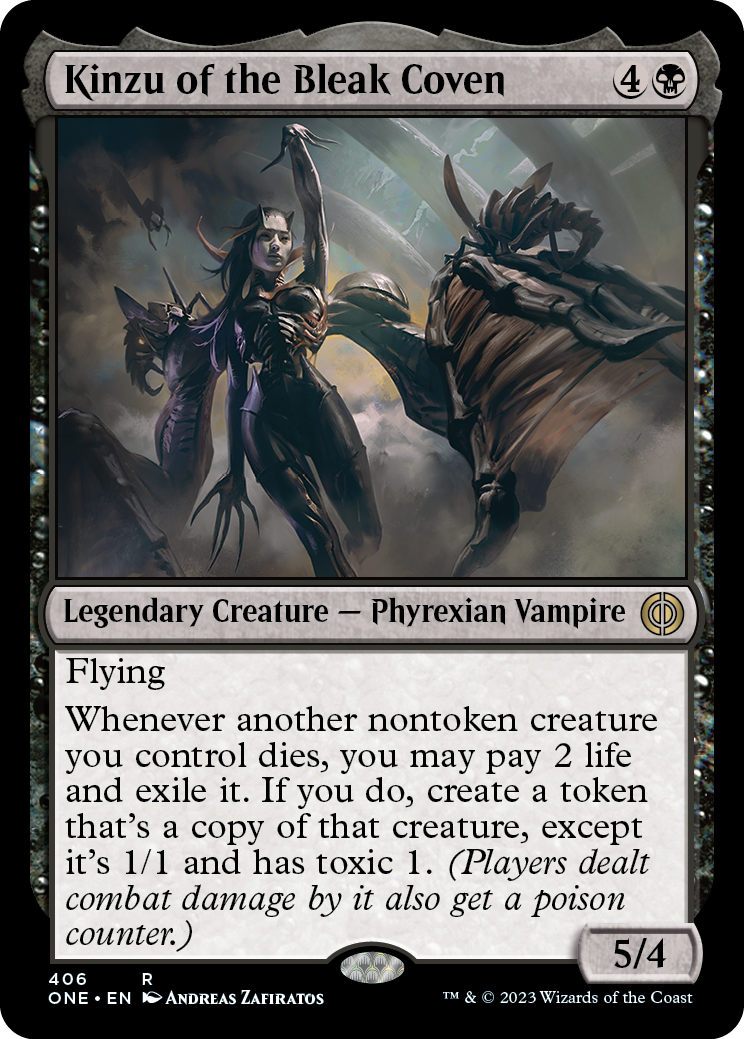
{4}{B}
Legendary Creature — Phyrexian Vampire
5/4
Flying
Whenever another nontoken creature you control dies, you may pay 2 life and exile it. If you do, create a token that's a copy of that creature, except it's 1/1 and has toxic 1. (Players dealt combat damage by it also get a poison counter.)
- The token copies the creature as it last existed on the battlefield before it died, not as it existed in the graveyard before it was exiled.
- Except for the listed exceptions, the token copies exactly what was printed on the original creature and nothing else (unless that creature is copying something else; see below). It doesn't copy whether that creature was tapped or untapped, whether it had any counters on it or Auras or Equipment attached to it, or any non-copy effects that had changed its power, toughness, types, color, or so on.
- If the copied creature was copying something else, then the token enters the battlefield as whatever that creature copied, with the exceptions noted above.
- If the copied creature had {X} in its mana cost, X is 0.
- Any enters-the-battlefield abilities of the copied creature will trigger when the token enters the battlefield. Any "as [this creature] enters the battlefield" or "[this creature] enters the battlefield with" abilities of the creature will also work.
- If the token is a copy of a creature whose power and toughness are defined by an ability (usually printed as */* or similar), the token doesn't copy the ability that defines its power and toughness. It remains a 1/1 creature.
- If something becomes a copy of the token, the copy also has base power and toughness 1/1 and has toxic 1.
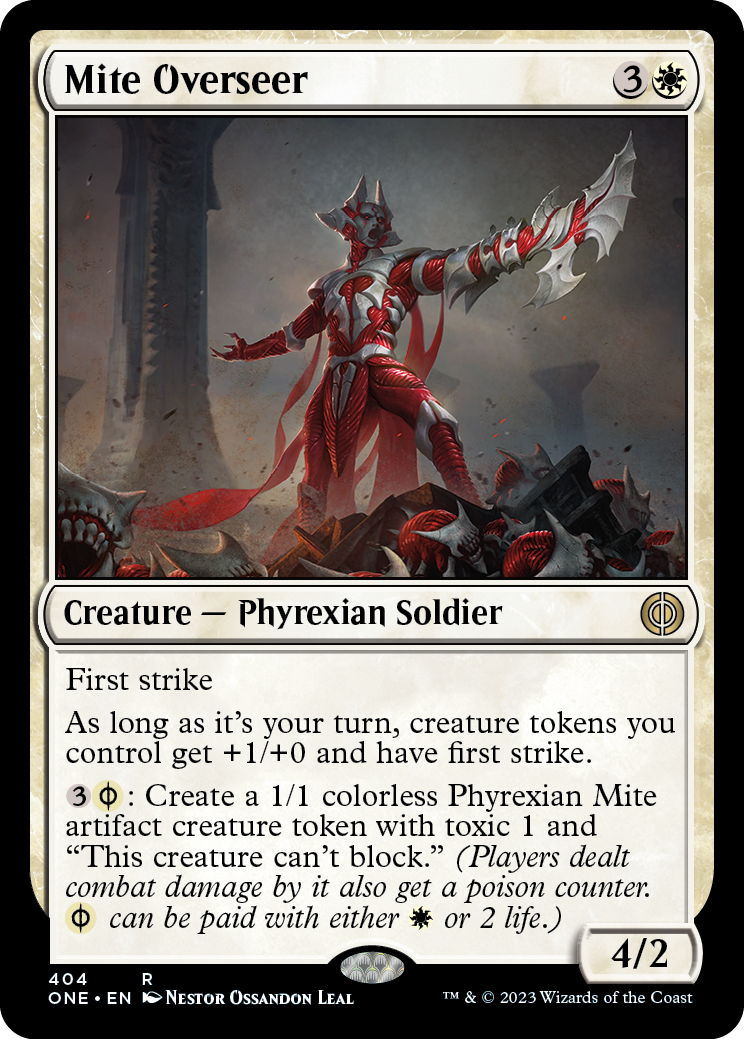
{3}{W}
Creature — Phyrexian Soldier
4/2
First strike
As long as it's your turn, creature tokens you control get +1/+0 and have first strike.
{3}{W/P}: Create a 1/1 colorless Phyrexian Mite artifact creature token with toxic 1 and "This creature can't block." (Players dealt combat damage by it also get a poison counter. {W/P} can be paid with either {W} or 2 life.)
- If a creature loses first strike after dealing combat damage in the first combat damage step, it won't deal damage in the second combat damage step unless it has double strike.
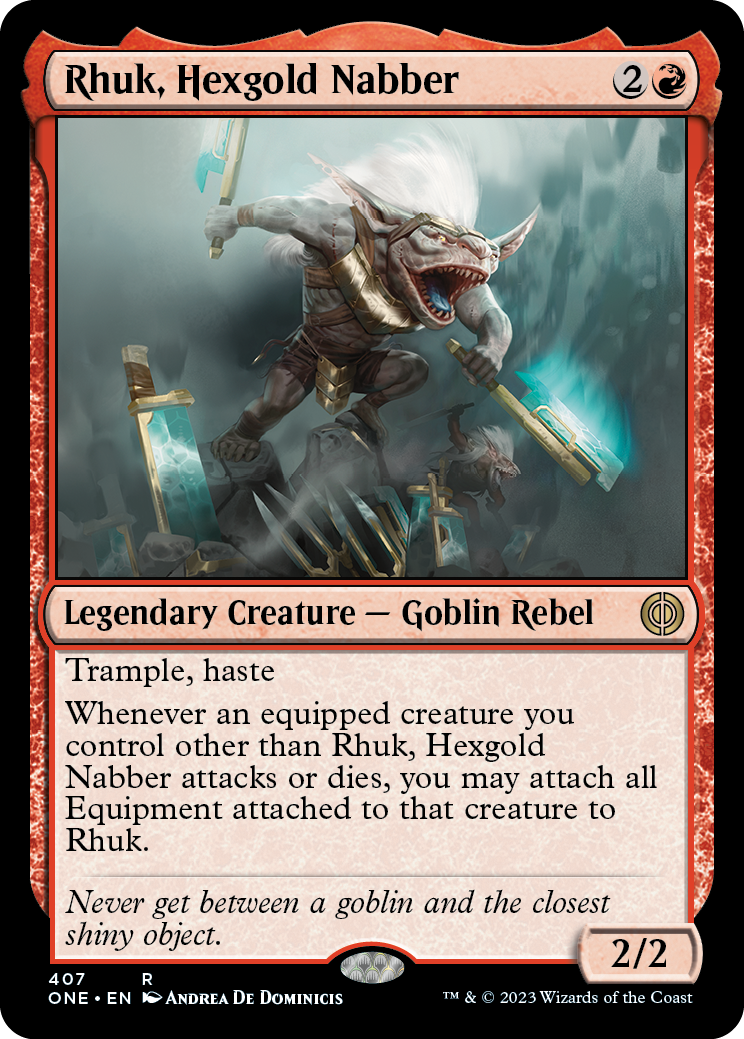
{2}{R}
Legendary Creature — Goblin Rebel
2/2
Trample, haste
Whenever an equipped creature you control other than Rhuk, Hexgold Nabber attacks or dies, you may attach all Equipment attached to that creature to Rhuk.
- If that creature has more than one Equipment attached to it, you may move all of those Equipment to Rhuk or none of those Equipment to Rhuk. You can't move some of them and leave others.
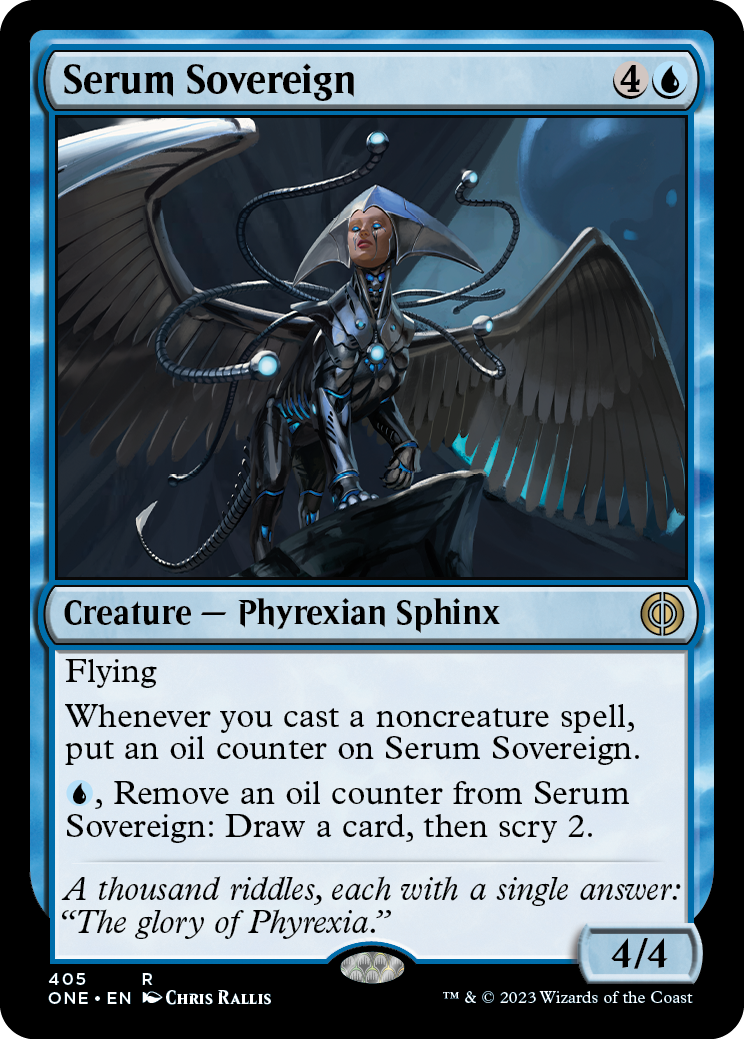
{4}{U}
Creature — Phyrexian Sphinx
4/4
Flying
Whenever you cast a noncreature spell, put an oil counter on Serum Sovereign.
{U}, Remove an oil counter from Serum Sovereign: Draw a card, then scry 2.
- Removing an oil counter is part of the cost to activate Serum Sovereign's last ability. Players can't respond with a spell or ability that removes counters to prevent you from drawing a card and scrying 2.
Commander Card-Specific Notes
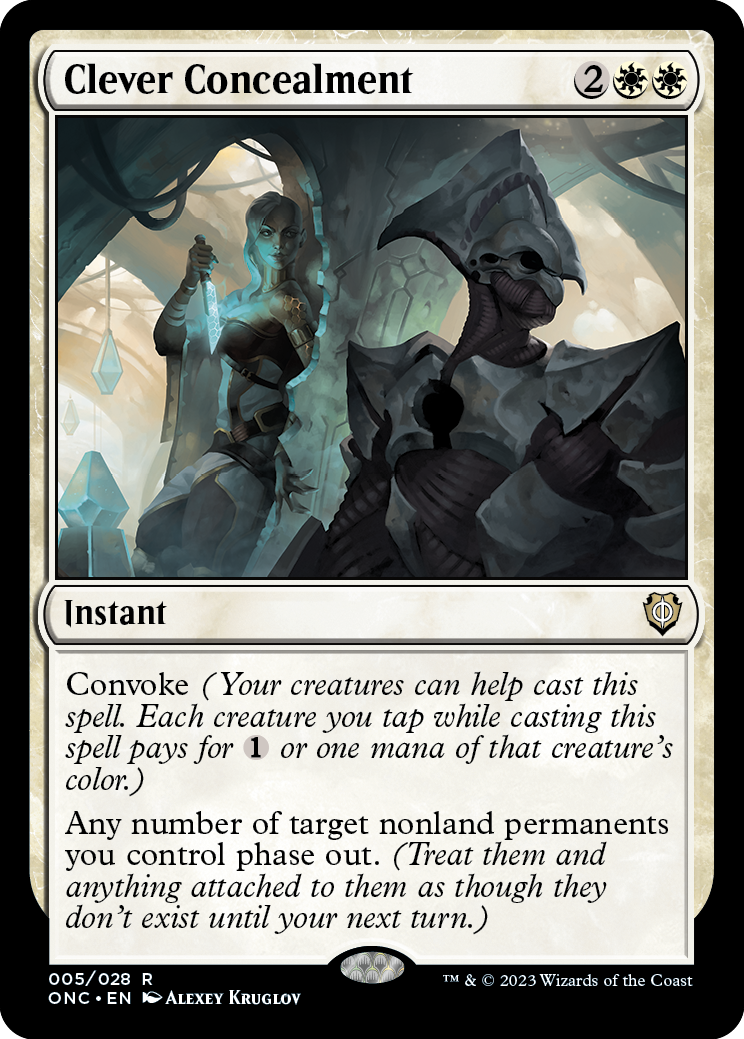
{2}{W}{W}
Instant
Convoke (Your creatures can help cast this spell. Each creature you tap while casting this spell pays for {1} or one mana of that creature's color.)
Any number of target nonland permanents you control phase out. (Treat them and anything attached to them as though they don't exist until your next turn.)
- Phased out permanents are treated as though they don't exist. They can't be the target of spells or abilities, their static abilities have no effect on the game, their triggered abilities can't trigger, they can't attack or block, and so on.
- As a permanent is phased out, Auras and Equipment attached to it also phase out at the same time. Those Auras and Equipment will phase in at the same time that permanent does, and they'll phase in still attached to that permanent.
- Permanents phase back in during their controller's untap step, immediately before that player untaps their permanents. Creatures that phase in this way are able to attack and pay a cost of {T} during that turn. If a permanent had counters on it when it phased out, it will have those counters when it phases back in.
- An attacking or blocking creature that phases out is removed from combat.
- Phasing out doesn't cause permanents to leave or re-enter the battlefield, so no "leaves the battlefield" or "enters the battlefield" abilities will trigger.
- Any continuous effects with a "for as long as" duration, such as that of Mind Flayer, ignore phased-out objects. If ignoring those objects causes the effect's conditions to no longer be met, the duration will expire.
- Choices made for permanents as they entered the battlefield are remembered when they phase in.
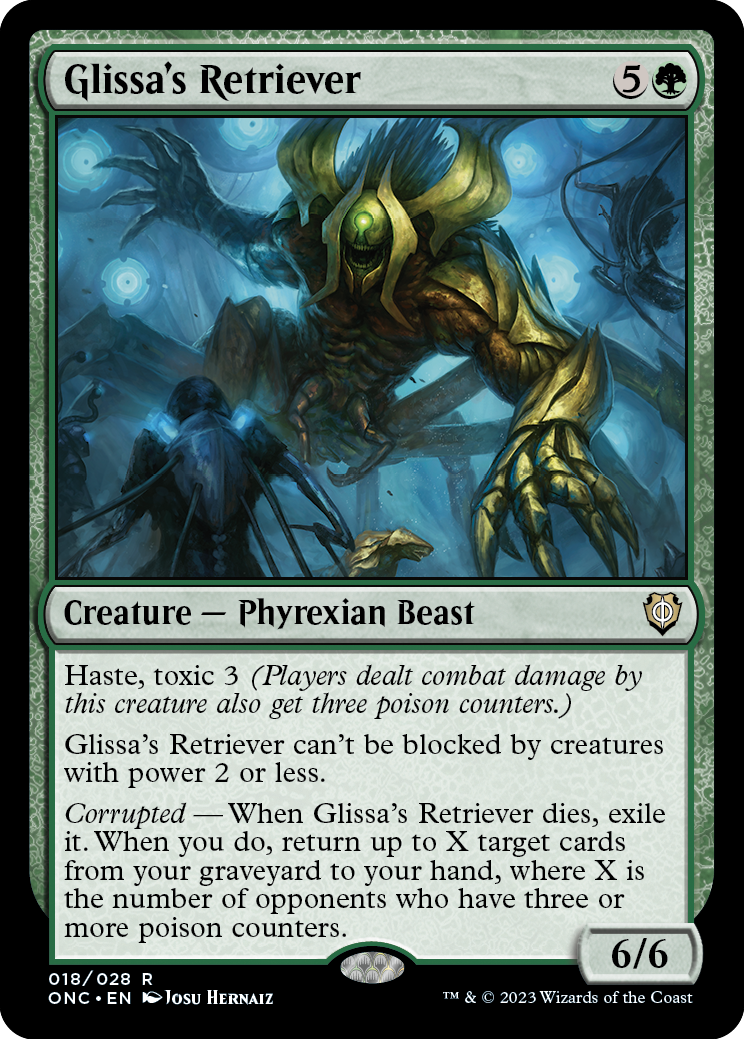
{5}{G}
Creature — Phyrexian Beast
6/6
Haste, toxic 3 (Players dealt combat damage by this creature also get three poison counters.)
Glissa's Retriever can't be blocked by creatures with power 2 or less.
Corrupted — When Glissa's Retriever dies, exile it. When you do, return up to X target cards from your graveyard to your hand, where X is the number of opponents who have three or more poison counters.
- After Glissa's Retriever has become blocked by a creature with power 3 or greater, reducing the blocking creature's power won't cause Glissa's Retriever to become unblocked.
- You don't choose a target for Glissa's Retriever's last ability at the time it triggers. Instead, a second "reflexive" ability triggers when you exile it. You choose a target for that ability as it goes on the stack. Each player may respond to this triggered ability as normal.
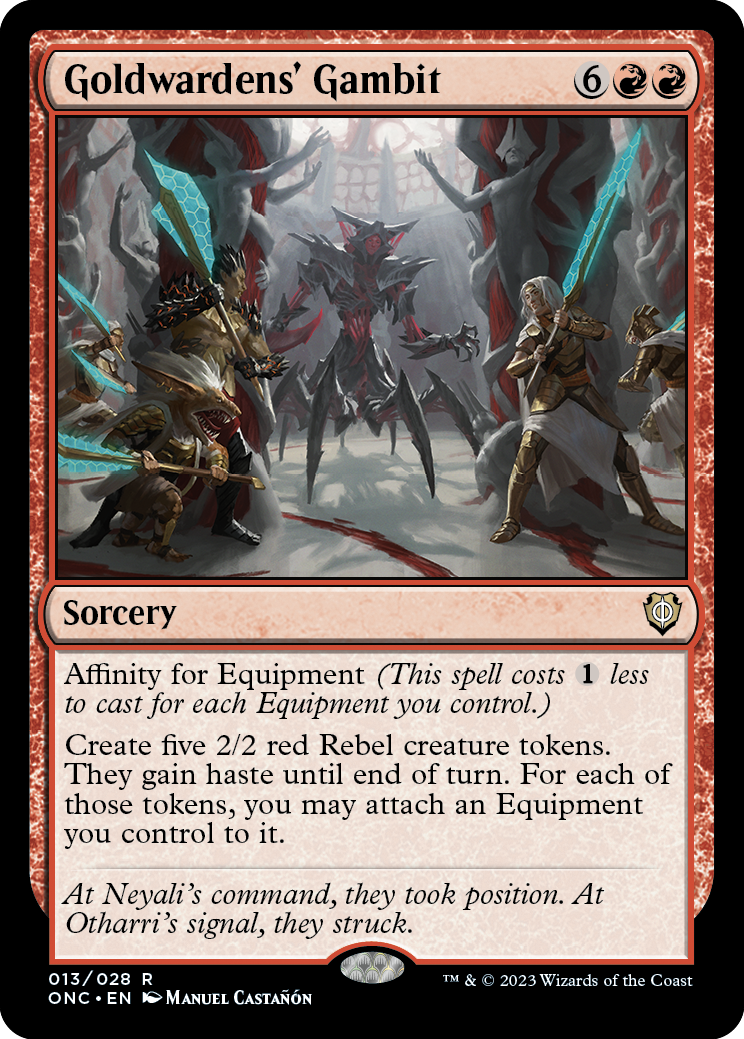
{6}{R}{R}
Sorcery
Affinity for Equipment (This spell costs {1} less to cast for each Equipment you control.)
Create five 2/2 red Rebel creature tokens. They gain haste until end of turn. For each of those tokens, you may attach an Equipment you control to it.
- You choose which Equipment to attach to each token, then attach those Equipment all at once. You can't move the same Equipment around to each of the tokens as the ability resolves.
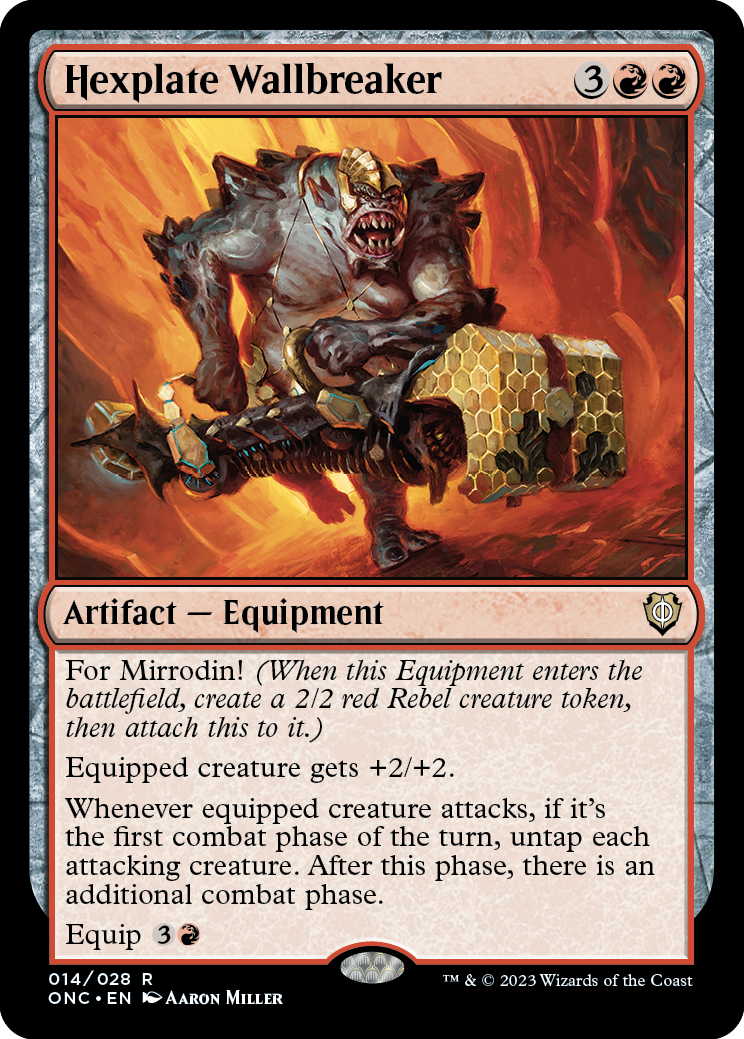
{3}{R}{R}
Artifact — Equipment
For Mirrodin! (When this Equipment enters the battlefield, create a 2/2 red Rebel creature token, then attach this to it.)
Equipped creature gets +2/+2.
Whenever equipped creature attacks, if it's the first combat phase of the turn, untap each attacking creature. After this phase, there is an additional combat phase.
Equip {3}{R}
- Untapping an attacking creature doesn't remove it from combat.
- There's no main phase between your combat phases, so you'll have no opportunity to cast spells or activate abilities that could only be activated any time you could cast a sorcery. For example, you won't be able to cast another creature or activate Hexplate Wallbreaker's equip ability between combats.
- Once the equipped creature attacks and the triggered ability resolves, you get an additional combat phase even if the equipped creature doesn't survive the first combat phase.
- If you attack with multiple creatures equipped with Hexplate Wallbreakers in one combat phase (or one creature equipped with multiple Hexplate Wallbreakers), you'll have that many additional combat phases, but your attacking creatures are untapped only during the current combat phase.
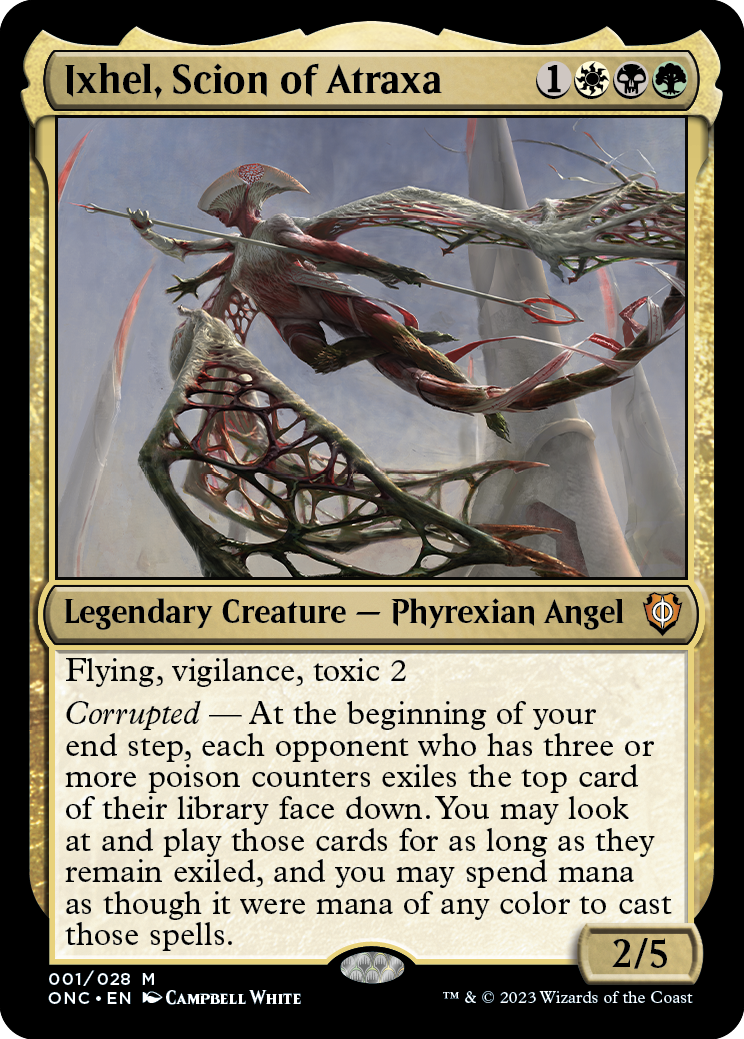
{1}{W}{B}{G}
Legendary Creature — Phyrexian Angel
2/5
Flying, vigilance, toxic 2
Corrupted — At the beginning of your end step, each opponent who has three or more poison counters exiles the top card of their library face down. You may look at and play those cards for as long as they remain exiled, and you may spend mana as though it were mana of any color to cast those spells.
- You may look at and cast the exiled cards (and spend mana as though it were mana of any color to do so) even if Ixhel leaves the battlefield. If another player gains control of Ixhel, that player can't look at or cast the cards, and you still can.
- You pay the costs for an exiled card if you cast it. You may pay any alternative costs the card has rather than the card's mana cost.
- Ixhel doesn't change when you can cast an exiled card. For example, if you exile a creature card without flash, you can cast it only during your main phase when the stack is empty.
- Casting an exiled card causes it to leave exile. You can't cast it multiple times.
- If you leave the game, the cards remain exiled face down indefinitely. No player may look at them.
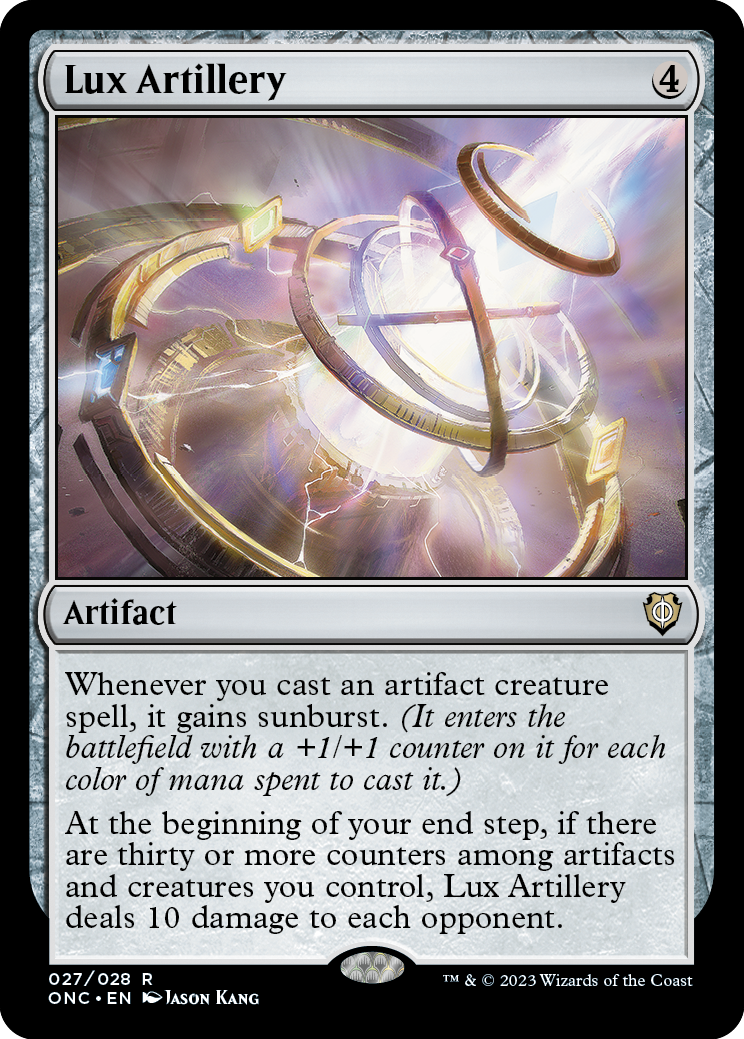
{4}
Artifact
Whenever you cast an artifact creature spell, it gains sunburst. (It enters the battlefield with a +1/+1 counter on it for each color of mana spent to cast it.)
At the beginning of your end step, if there are thirty or more counters among artifacts and creatures you control, Lux Artillery deals 10 damage to each opponent.
- If the artifact creature already has sunburst (or if you control multiple copies of Lux Artillery), each instance of sunburst works separately.
- Lux Artillery's last ability will check if there are thirty or more counters among artifacts and creatures you control as your end step begins. If there aren't, the ability won't trigger at all. If there are, the ability will check again as it tries to resolve. If the number of counters among artifacts and creatures you control has fallen below thirty, the ability won't do anything.
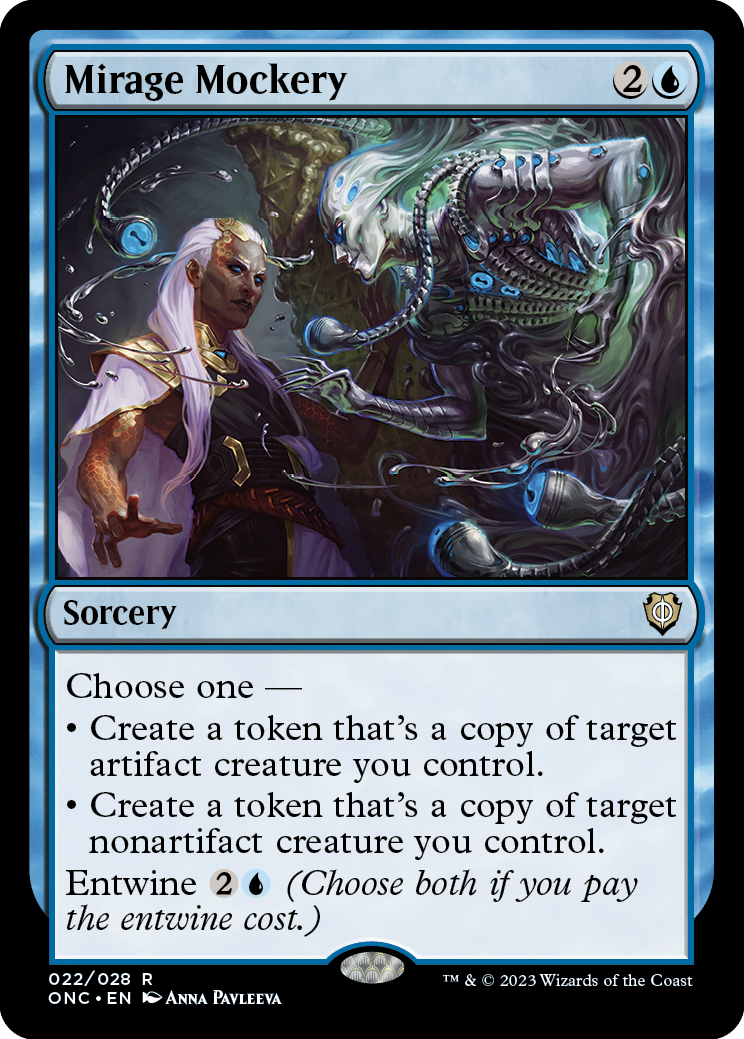
{2}{U}
Sorcery
Choose one —
• Create a token that's a copy of target artifact creature you control.
• Create a token that's a copy of target nonartifact creature you control.
Entwine {2}{U} (Choose both if you pay the entwine cost.)
- If you cast the spell by paying its entwine cost, the tokens don't enter the battlefield at the same time. The token that's a copy of the artifact creature enters the battlefield first, followed by the token that's a copy of the nonartifact creature. Then any abilities that triggered due to either of them entering the battlefield are put on the stack.
- The token copies exactly what was printed on the original creature and nothing else (unless that permanent is copying something else or it is a token; see below). It doesn't copy whether that creature is tapped or untapped, whether it has any counters on it or Auras and Equipment attached to it, and so on.
- If the copied creature has {X} in its mana cost, X is 0.
- If the copied creature is a token, the new token that's created copies the original characteristics of that token as stated by the effect that created that token.
- If the copied creature is copying something else, then the token enters the battlefield as whatever that creature copied.
- Any enters-the-battlefield abilities of the copied creature will trigger when the token enters the battlefield. Any "as [this creature] enters the battlefield" or "[this creature] enters the battlefield with" abilities of the chosen creature will also work.
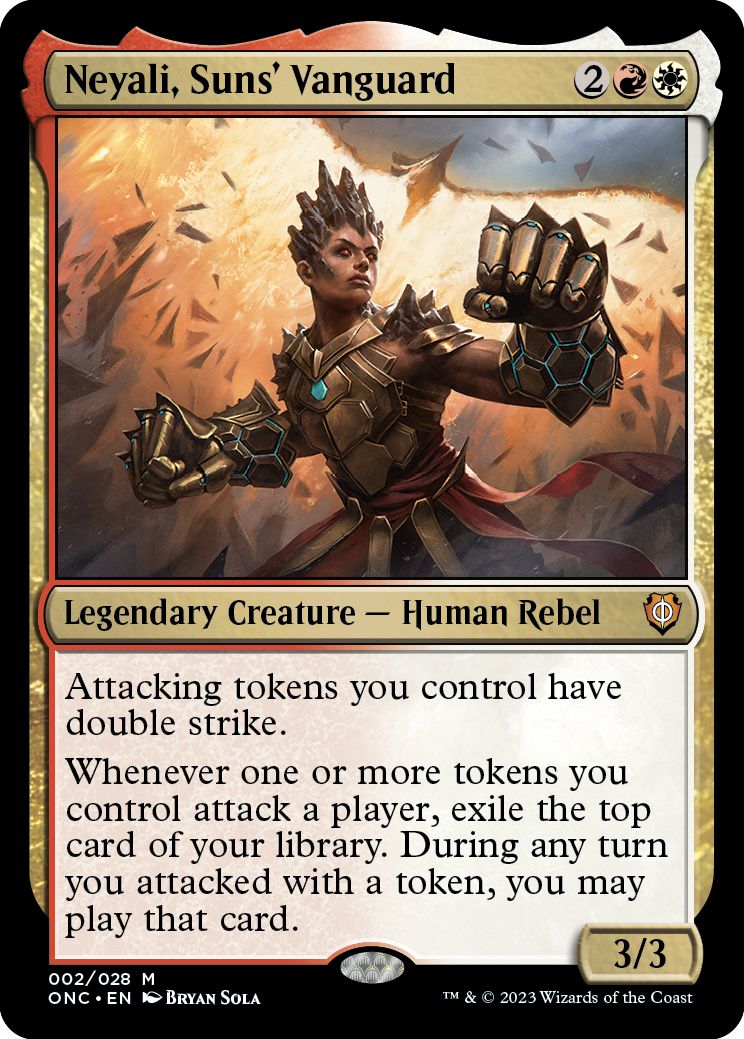
{2}{R}{W}
Legendary Creature — Human Rebel
3/3
Attacking tokens you control have double strike.
Whenever one or more tokens you control attack a player, exile the top card of your library. During any turn you attacked with a token, you may play that card.
- The second ability of Neyali, Suns' Vanguard triggers for each player you are attacking with one or more tokens. It does not trigger if you are attacking a planeswalker a player controls, but not that player.
- The card Neyali exiles is exiled face up.
- The effect allowing you to cast the exiled card if you attacked with a token continues to apply even if Neyali leaves the battlefield or another player gains control of it. It also continues to apply during later turns—as long as you attacked with a token during those later turns.
- You can cast the exiled card if the token that attacked is still in combat, if it's left combat, if it's left the battlefield, or even if combat is over.
- Neyali's effect doesn't change when you can cast the exiled card. For example, if you exile a sorcery card, you can cast it only during your main phase when the stack is empty.
- Casting an exiled card causes it to leave exile. You can't cast it multiple times.
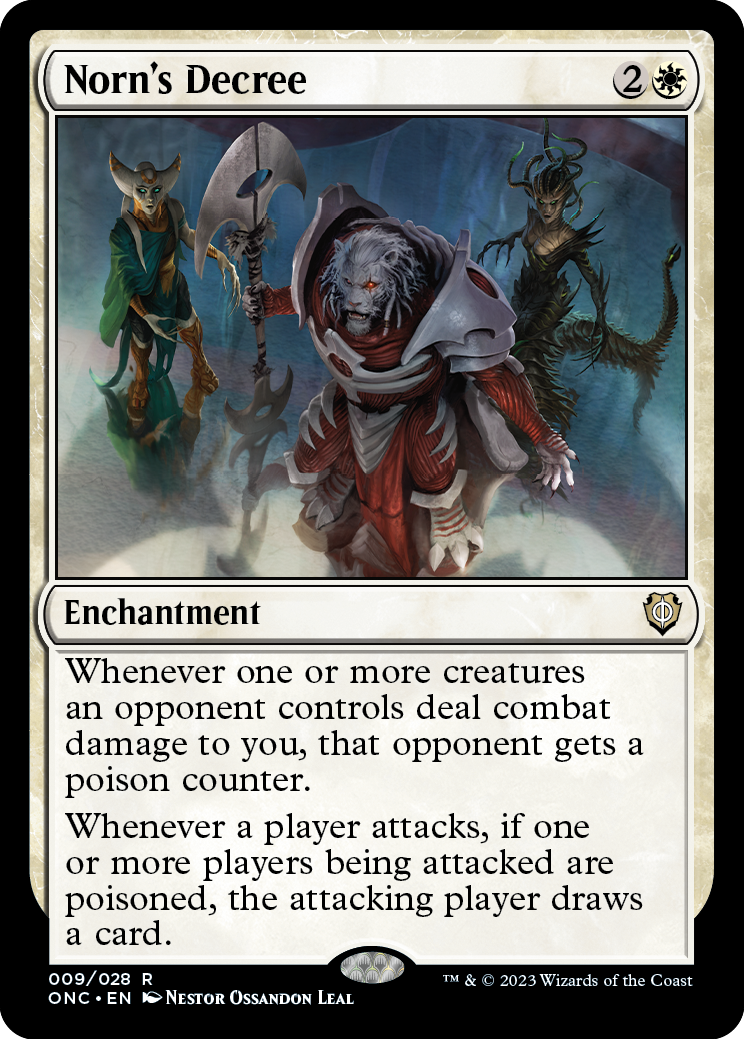
{2}{W}
Enchantment
Whenever one or more creatures an opponent controls deal combat damage to you, that opponent gets a poison counter.
Whenever a player attacks, if one or more players being attacked are poisoned, the attacking player draws a card.
- A player is poisoned if that player has one or more poison counters.
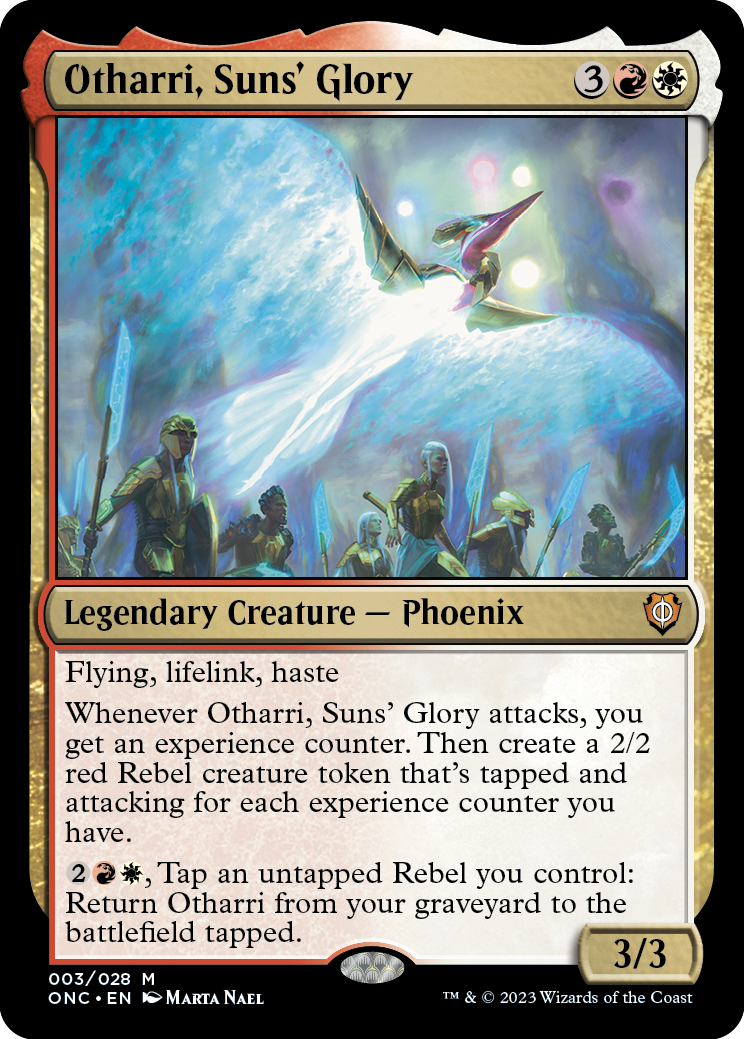
{3}{R}{W}
Legendary Creature — Phoenix
3/3
Flying, lifelink, haste
Whenever Otharri, Suns' Glory attacks, you get an experience counter. Then create a 2/2 red Rebel creature token that's tapped and attacking for each experience counter you have.
{2}{R}{W}, Tap an untapped Rebel you control: Return Otharri from your graveyard to the battlefield tapped.
- Tapping a Rebel you control is part of the cost to activate the last ability of Otharri, Suns' Glory while it is in the graveyard. Once a player has begun to activate the ability, other players may not respond by removing that Rebel from the battlefield to prevent it from being tapped.
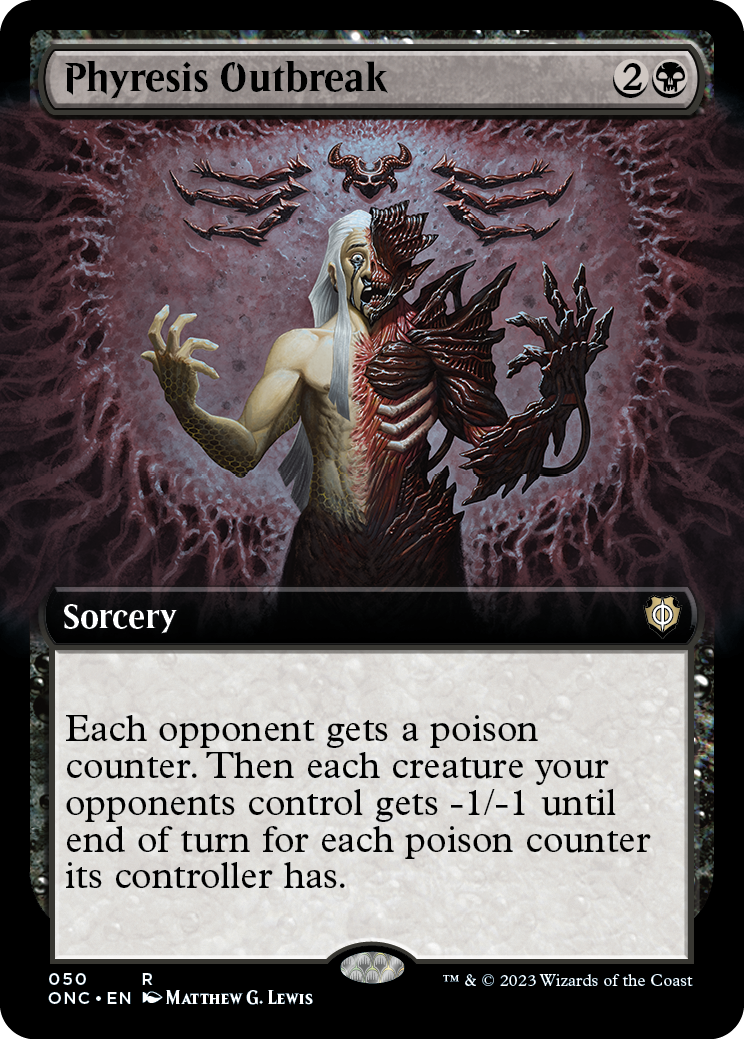
{2}{B}
Sorcery
Each opponent gets a poison counter. Then each creature your opponents control gets -1/-1 until end of turn for each poison counter its controller has.
- The amount a creature's power and toughness are reduced is determined only once, at the time Phyresis Outbreak resolves. It won't change if that creature's controller later gets more poison counters or if another player takes control of it later in the same turn.
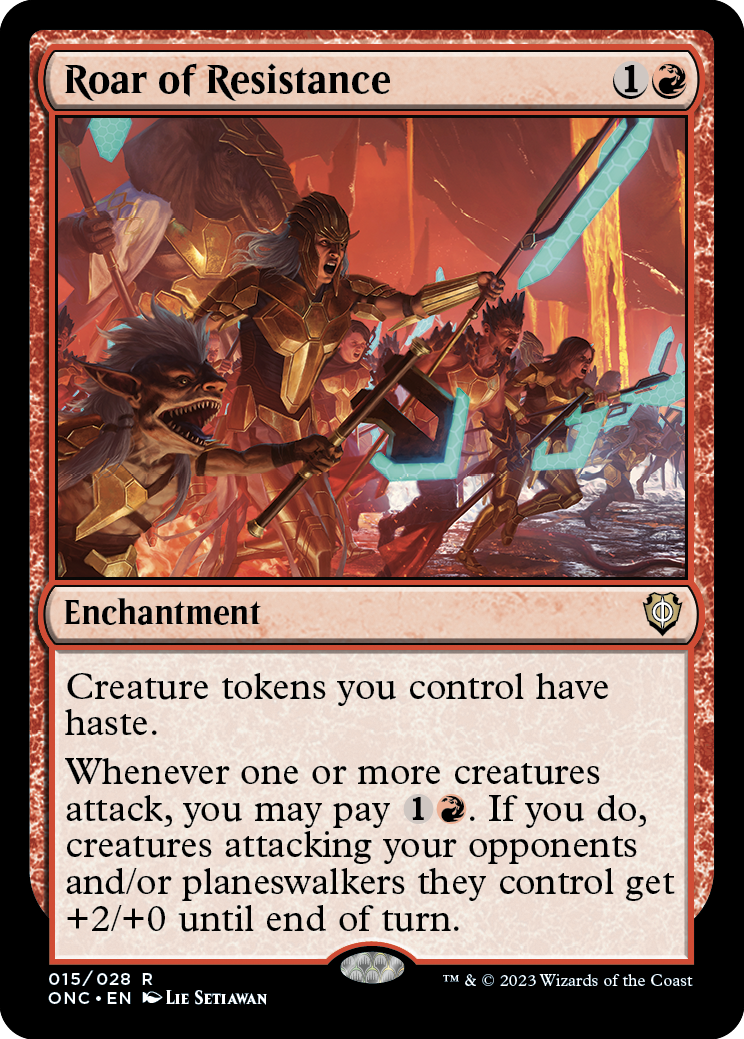
{1}{R}
Enchantment
Creature tokens you control have haste.
Whenever one or more creatures attack, you may pay {1}{R}. If you do, creatures attacking your opponents and/or planeswalkers they control get +2/+0 until end of turn.
- Roar of Resistance's last ability triggers whenever any creatures attack, not just whenever creatures you control attack.
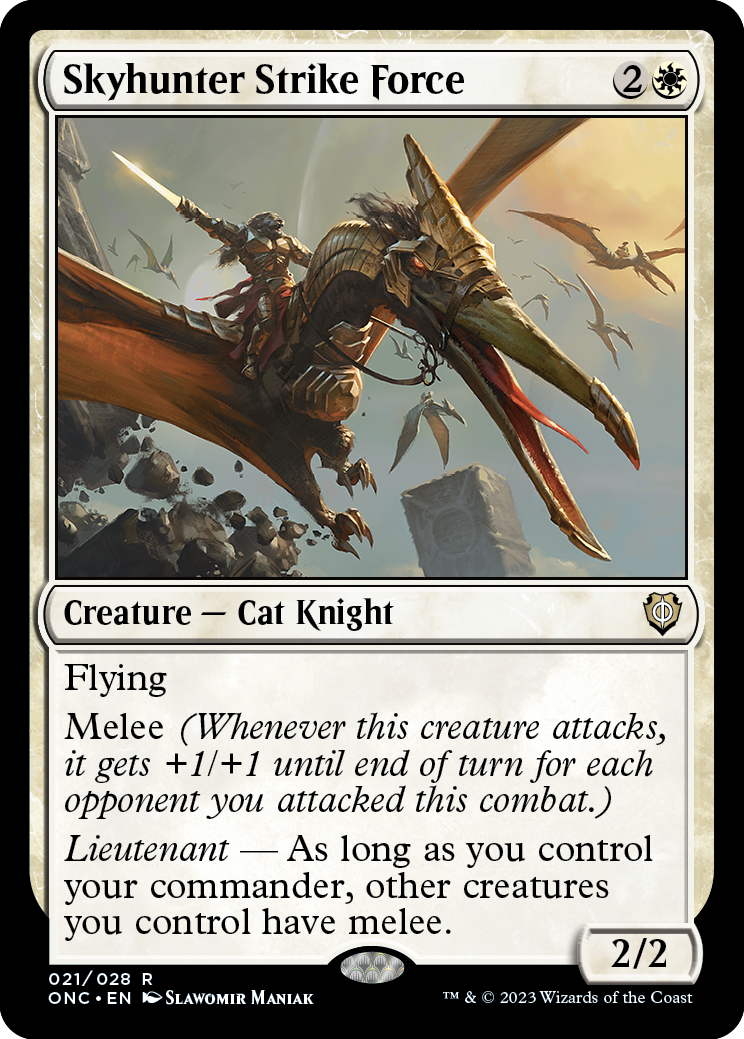
{2}{W}
Creature — Cat Knight
2/2
Flying
Melee (Whenever this creature attacks, it gets +1/+1 until end of turn for each opponent you attacked this combat.)
Lieutenant — As long as you control your commander, other creatures you control have melee.
- You determine the size of the bonus as the melee ability resolves. Count each opponent that you attacked with one or more creatures. It doesn't matter if the attacking creatures are still attacking or even if they are still on the battlefield. It also doesn't matter if the opponent you attacked is still in the game.
- It doesn't matter how many creatures you attacked a player with, only that you attacked a player with at least one creature. For example, if you attack one player with Skyhunter Strike Force and another player with five creatures, Skyhunter Strike Force will get +2/+2 until end of turn.
- Melee will trigger if the creature with melee attacks a planeswalker. However, the effect counts only opponents (and not planeswalkers) that you attacked with a creature when determining the bonus.
- Creatures that enter the battlefield attacking were never declared as attackers, so they won't count toward melee's effect. Similarly, if a creature with melee enters the battlefield attacking, melee won't trigger.
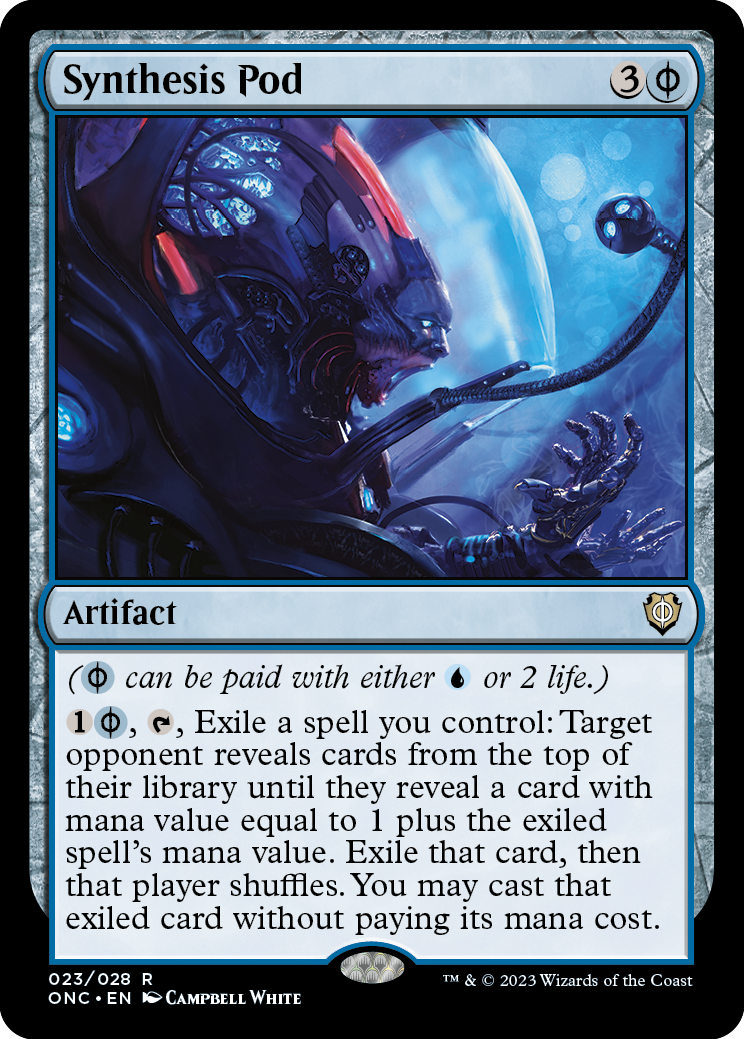
{3}{U/P}
Artifact
({U/P} can be paid with either {U} or 2 life.)
{1}{U/P}, {T}, Exile a spell you control: Target opponent reveals cards from the top of their library until they reveal a card with mana value equal to 1 plus the exiled spell's mana value. Exile that card, then that player shuffles. You may cast that exiled card without paying its mana cost.
- To activate Synthesis Pod's ability, you must exile a spell you control on the stack (the only place spells exist).
- If you wish to cast the card, you do so as part of the resolution of Synthesis Pod's ability. You can't wait to cast it later. Timing rules based on a card's type are ignored.
- If you cast a spell "without paying its mana cost," you can't choose to cast it for any alternative costs. If the card has any mandatory additional costs, those must be paid to cast the card.
- If a spell has {X} in its mana cost, you must choose 0 as the value of X when casting it without paying its mana cost.
- The spell you exiled as part of the cost to activate Synthesis Pod's ability will remain in exile.
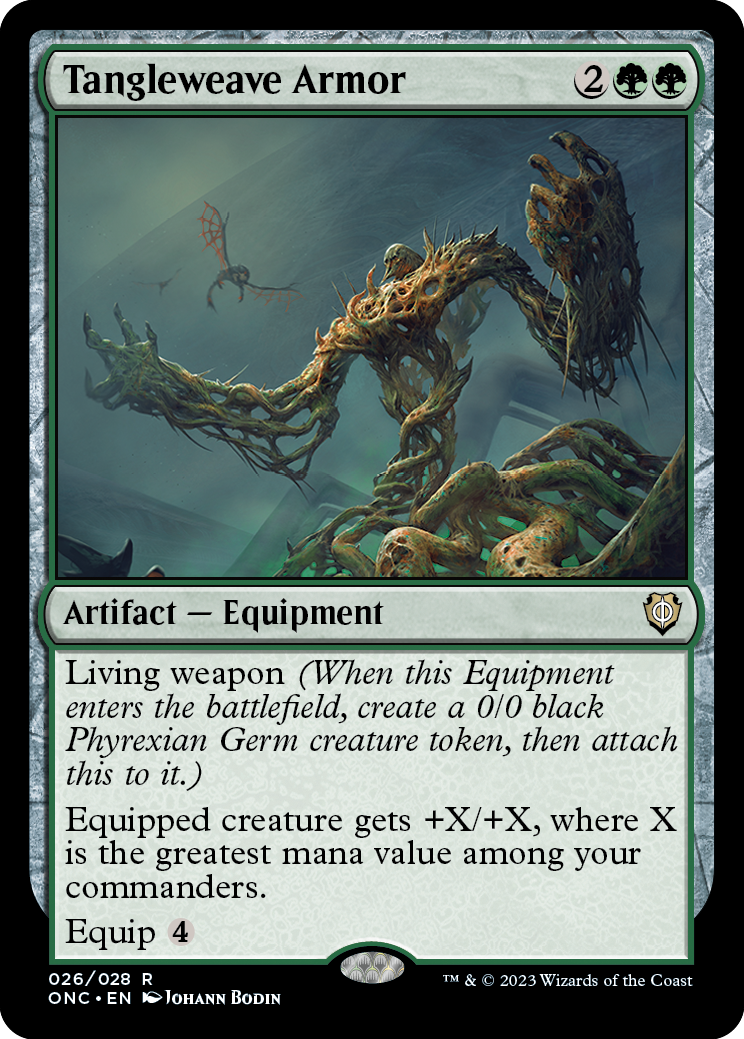
{2}{G}{G}
Artifact — Equipment
Living weapon (When this Equipment enters the battlefield, create a 0/0 black Phyrexian Germ creature token, then attach this to it.)
Equipped creature gets +X/+X, where X is the greatest mana value among your commanders.
Equip {4}
- It doesn't matter where your commander is (or commanders are, if you have more than one because of the partner ability or similar). The bonus will be calculated using your commander's current characteristics. (Mana value typically doesn't change, but your commander may become a copy of something else.)
- The Germ token enters the battlefield as a 0/0 creature and the Equipment becomes attached to it before state-based actions would cause the token to die. Abilities that trigger as the token enters the battlefield see that a 0/0 creature entered the battlefield.
- Like other Equipment, each Equipment with living weapon has an equip cost. You can pay this cost to attach an Equipment to another creature you control. Once the Germ token is no longer equipped, it will be put into your graveyard and subsequently cease to exist, unless another effect raises its toughness above 0.
- If the Germ token is destroyed, the Equipment remains on the battlefield as with any other Equipment.
- If the living weapon trigger causes two Germs to be created (due to an effect such as that of Doubling Season), the Equipment becomes attached to one of them. The other will be put into your graveyard and subsequently cease to exist, unless another effect raises its toughness above 0.

{2}{W}{B}{G}
Legendary Creature — Phyrexian Insect
3/3
Menace, toxic 1 (Players dealt combat damage by this creature also get a poison counter.)
When Vishgraz, the Doomhive enters the battlefield, create three 1/1 colorless Phyrexian Mite artifact creature tokens with toxic 1 and "This creature can't block."
Vishgraz gets +1/+1 for each poison counter your opponents have.
- The bonus Vishgraz receives due to its last ability may cause it to survive combat damage in some cases. For example, if an attacking Vishgraz is blocked by a 3/3 and another creature with toxic 1 is attacking at the same time and is unblocked, Vishgraz with deal 3 damage, receive 3 damage, and get +1/+1 at exactly the same time. The end result is that it will stay alive and be a 4/4 creature with 3 damage marked on it.
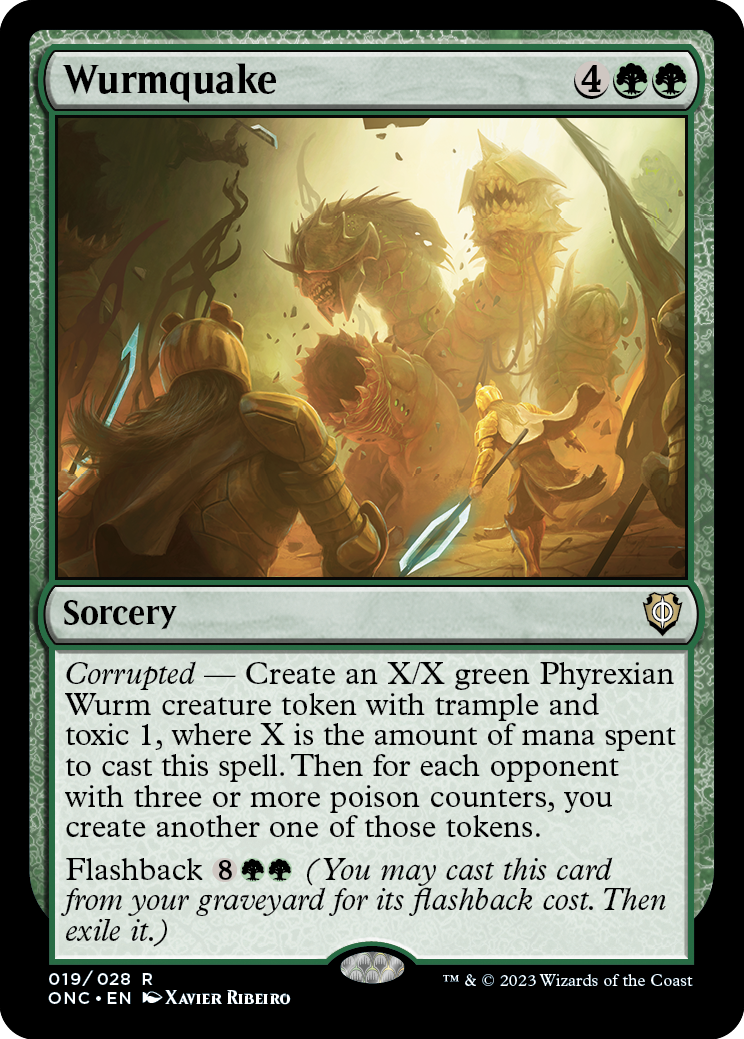
{4}{G}{G}
Sorcery
Corrupted — Create an X/X green Phyrexian Wurm creature token with trample and toxic 1, where X is the amount of mana spent to cast this spell. Then for each opponent with three or more poison counters, you create another one of those tokens.
Flashback {8}{G}{G} (You may cast this card from your graveyard for its flashback cost. Then exile it.)
- The first token that Wurmquake creates as it resolves is created and enters the battlefield before the rest of them, then you create a number of tokens equal to the number of opponents with three of more poison counters and they enter the battlefield at the same time.
- You can't choose to spend more mana to cast Wurmquake than you're asked to just to make a bigger Wurm. In most cases, it's a 6/6 Phyrexian Wurm the first time, and a 10/10 Phyrexian Wurm when you cast Wurmquake with flashback. However, if there are any additional costs to cast it, the mana spent to pay those costs counts.
- "Flashback [cost]" means "You may cast this card from your graveyard by paying [cost] rather than paying its mana cost" and "If the flashback cost was paid, exile this card instead of putting it anywhere else any time it would leave the stack."
- You must still follow any timing restrictions and permissions, including those based on the card's type. For instance, you can cast a sorcery using flashback only when you could normally cast a sorcery.
- To determine the total cost of a spell, start with the mana cost or alternative cost (such as a flashback cost) you're paying, add any cost increases, then apply any cost reductions. The mana value of the spell is determined only by its mana cost, no matter what the total cost to cast the spell was.
- A spell cast using flashback will always be exiled afterward, whether it resolves, is countered, or leaves the stack in some other way.
- You can cast a spell using flashback even if it was somehow put into your graveyard without having been cast.
- If a card with flashback is put into your graveyard during your turn, you can cast it if it's legal to do so before any other player can take any actions.
©2023 Wizards of the Coast LLC Wizards of the Coast, Magic: The Gathering, their logos, Magic, and the WUBRGCT symbols are property of Wizards in the USA and other countries. U.S. Pat. No. RE 37,957.
